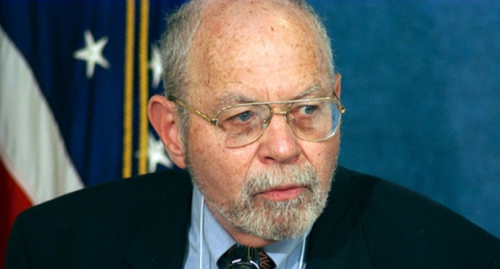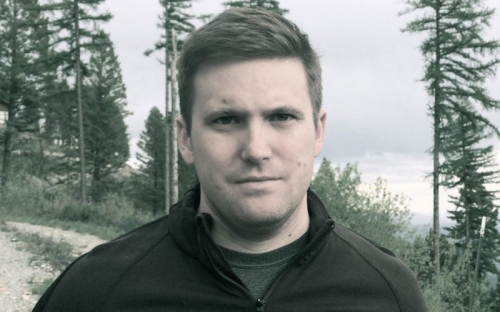Carl Schmitt (1888-1985) gilt als einflussreichster und dennoch umstrittenster Verfassungsrechtler seiner Zeit.
Bei staatsrechtlichen Themen taucht immer wieder die Formel vom "fürchterlichen NS-Kronjuristen" Carl Schmitt auf, des führenden Staatsrechtlers der späten Weimarer Republik. Die damit eröffneten Nebenkriegsschauplätze verstellen die großartige, wissenschaftliche Leistung Schmitts. Sein Werk "Die geistesgeschichtliche Lage des heutigen Parlamentarismus", welches 1923 veröffentlicht wurde, ist bis heute die beste Analyse des parlamentarischen Systems.
Darin geht Schmitt der Frage auf den Grund, warum es im 19. Jahrhundert zu der nicht zwangsläufigen Verquickung von Demokratie und Parlamentarismus als vermeintliche "ultimum sapientiae" (lat. absolute Weisheit) gekommen ist.
Unter den Liberalen des 19. Jahrhunderts herrschte die Vorstellung, dass die unterschiedlich im Volk verteilten Vernunftpartikel im Parlament zusammentreffen würden und sich dabei so in freier Konkurrenz zusammensetzen würden, dass am Ende das beste Ergebnis herauskäme. Das ist für Schmitt ein Ausdruck von liberal-ökonomischen Prinzipien (Glaube an die Kraft des freien Marktes), welcher durch die Realität ad absurdum geführt werde.
Das Parlament sei nicht das Forum, in dem die absolute Wahrheit oder Vernunft gesucht wird, sondern vielmehr würden in ihm bereits festgelegte Positionen und kaum veränderbare Partikularinteressen aufeinanderprallen. Es käme nicht darauf an, in gemeinsamen Beratungen die beste Lösung für das Allgemeinwohl zu finden, sondern nur darauf, die eigenen Interessen und die seiner Klientel durchzusetzen, indem man die nötigen Mehrheiten organisiert und über die Minderheit herrscht.[1]
Carl Schmitt (zeitweise auch Carl Schmitt-Dorotic)[2] (1888-1985) war ein deutscher Staatsrechtler[wp], der auch als politischer Philosoph rezipiert wird. Er ist einer der bekanntesten, wenn auch umstrittensten deutschen Staats- und Völkerrechtler des 20. Jahrhunderts. Als "Kronjurist des Dritten Reiches" (Waldemar Gurian[wp]) galt Schmitt nach 1945 als kompromittiert.
 Sein im Katholizismus[wp] verwurzeltes Denken kreiste um Fragen der Macht[wp], der Gewalt und der Rechtsverwirklichung. Neben dem Staats- und Verfassungsrecht streifen seine Veröffentlichungen zahlreiche weitere Disziplinen wie Politikwissenschaft[wp], Soziologie, Theologie[wp], Germanistik[wp] und Philosophie[wp]. Sein breitgespanntes Œuvre umfasst außer juristischen und politischen Arbeiten verschiedene weitere Textgattungen, etwa Satiren, Reisenotizen, ideengeschichtliche Untersuchungen oder germanistische Textexegesen. Als Jurist prägte er eine Reihe von Begriffen und Konzepten, die in den wissenschaftlichen, politischen und sogar allgemeinen Sprachgebrauch eingegangen sind, etwa "Verfassungswirklichkeit"[wp], "Politische Theologie"[wp], "Freund-/Feind-Unterscheidung" oder "dilatorischer[wp] Formelkompromiss".
Sein im Katholizismus[wp] verwurzeltes Denken kreiste um Fragen der Macht[wp], der Gewalt und der Rechtsverwirklichung. Neben dem Staats- und Verfassungsrecht streifen seine Veröffentlichungen zahlreiche weitere Disziplinen wie Politikwissenschaft[wp], Soziologie, Theologie[wp], Germanistik[wp] und Philosophie[wp]. Sein breitgespanntes Œuvre umfasst außer juristischen und politischen Arbeiten verschiedene weitere Textgattungen, etwa Satiren, Reisenotizen, ideengeschichtliche Untersuchungen oder germanistische Textexegesen. Als Jurist prägte er eine Reihe von Begriffen und Konzepten, die in den wissenschaftlichen, politischen und sogar allgemeinen Sprachgebrauch eingegangen sind, etwa "Verfassungswirklichkeit"[wp], "Politische Theologie"[wp], "Freund-/Feind-Unterscheidung" oder "dilatorischer[wp] Formelkompromiss".
Schmitt wird heute zwar - vor allem wegen seines staatsrechtlichen Einsatzes für den Nationalsozialismus[wp] - als "furchtbarer Jurist"[wp], umstrittener Theoretiker und Gegner der liberalenDemokratie gescholten, zugleich aber auch als "Klassiker des politischen Denkens" (Herfried Münkler[wp][3]) gewürdigt - nicht zuletzt aufgrund seiner Wirkung auf das Staatsrecht und die Rechtswissenschaft[wp]der frühen Bundesrepublik[wp].[4]
Die prägenden Einflüsse für sein Denken bezog Schmitt von politischen Philosophen und Staatsdenkern wie Thomas Hobbes[wp][5], Niccoló Machiavelli[wp], Aristoteles[wp][6], Jean-Jacques Rousseau[wp], Juan Donoso Cortés[wp] oder Zeitgenossen wie Georges Sorel[wp][7] und Vilfredo Pareto[wp].[8]
Veröffentlichungen und Überzeugungen
Schmitt wurde durch seine sprachmächtigen und schillernden Formulierungen auch unter Nichtjuristen schnell bekannt. Sein Stil war neu und galt in weit über das wissenschaftliche Milieu hinausgehenden Kreisen als spektakulär. Er schrieb nicht wie ein Jurist, sondern inszenierte seine Texte poetisch-dramatisch und versah sie mit mythischen Bildern und Anspielungen.[9]
Seine Schriften waren überwiegend kleine Broschüren, die aber in ihrer thesenhaften Zuspitzung zur Auseinandersetzung zwangen. Schmitt war überzeugt, dass "oft schon der erste Satz über das Schicksal einer Veröffentlichung entscheidet".[10] Viele Eröffnungssätze seiner Veröffentlichungen - etwa: "Es gibt einen antirömischen Affekt", "Der Begriff des Staates setzt den Begriff des Politischen voraus" oder "Souverän[wp] ist, wer über den Ausnahmezustand[wp] entscheidet" - wurden schnell berühmt.[11]
1924 erschien Schmitts erste explizit politische Schrift mit dem Titel Die geistesgeschichtliche Lage des heutigen Parlamentarismus. Im Jahre 1928 legte er sein bedeutendstes wissenschaftliches Werk vor, die Verfassungslehre, in der er die Weimarer Verfassung einer systematischen juristischen Analyse unterzog und eine neue wissenschaftliche Literaturgattung begründete: neben der klassischen Staatslehre etablierte sich seitdem die Verfassungslehre[wp] als eigenständige Disziplin des Öffentlichen Rechts.
Ordnungspolitisch trat der ökonomisch informierte Jurist für einen starken Staat[wp] ein, der auf einer "freien Wirtschaft" basieren sollte. Hier traf sich Schmitts Vorstellung in vielen Punkten mit dem Ordoliberalismus[wp] oder späteren Neoliberalismus, zu deren Ideengebern er in dieser Zeit enge Kontakte unterhielt, insbesondere mit Alexander Rüstow[wp]. In einem Vortrag vor Industriellen im November 1932 mit dem Titel Starker Staat und gesunde Wirtschaft forderte er eine aktive "Entpolitisierung" des Staates und einen Rückzug aus "nichtstaatlichen Sphären":
- "Immer wieder zeigt sich dasselbe: nur ein starker Staat kann entpolitisieren, nur ein starker Staat kann offen und wirksam anordnen, daß gewisse Angelegenheiten, wie Verkehr oder Rundfunk, sein Regal sind und von ihm als solche verwaltet werden, daß andere Angelegenheiten der [...] wirtschaftlichen Selbstverwaltung zugehören, und alles übrige der freien Wirtschaft überlassen wird."[12]
Bei diesen Ausführungen spielte Schmitt auf einen Vortrag Rüstows an, den dieser zwei Monate zuvor unter dem Titel Freie Wirtschaft, starker Staat gehalten hatte.[13] Rüstow hatte sich darin seinerseits auf Carl Schmitt bezogen: "Die Erscheinung, die Carl Schmitt im Anschluß an Ernst Jünger den totalen Staat genannt hat [...], ist in Wahrheit das genaue Gegenteil davon: nicht Staatsallmacht, sondern Staatsohnmacht. Es ist ein Zeichen jämmerlichster Schwäche des Staates, einer Schwäche, die sich des vereinten Ansturms der Interessentenhaufen nicht mehr erwehren kann. Der Staat wird von den gierigen Interessenten auseinandergerissen. [...] Was sich hier abspielt, staatspolitisch noch unerträglicher als wirtschaftspolitisch, steht unter dem Motto: 'Der Staat als Beute'."[14]
Den so aufgefassten Egoismus gesellschaftlicher Interessensgruppen bezeichnete Schmitt (in negativer Auslegung des gleichnamigen Konzeptes von Harold Laski[wp]) als Pluralismus[wp]. Dem Pluralismus partikularer Interessen setzte er die Einheit des Staates entgegen, die für ihn durch den vom Volk gewählten Reichspräsidenten repräsentiert[wp] wurde.
In Berlin erschienen Der Begriff des Politischen (1928), Der Hüter der Verfassung (1931) und Legalität und Legitimität (1932). Mit Hans Kelsen[wp] lieferte sich Schmitt eine vielbeachtete Kontroverse über die Frage, ob der "Hüter der Verfassung" der Verfassungsgerichtshof oder der Reichspräsident sei.[15]Zugleich näherte er sich reaktionären[wp] Strömungen an, indem er Stellung gegen den Parlamentarismus[wp] bezog.
 Als Hochschullehrer war Schmitt wegen seiner Kritik an der Weimarer Verfassung zunehmend umstritten. So wurde er etwa von den der Sozialdemokratie[wp] nahestehenden Staatsrechtlern Hans Kelsen[wp] und Hermann Heller[wp] scharf kritisiert. Die Weimarer Verfassung, so meinte Schmitt, schwäche den Staat durch einen "neutralisierenden" Liberalismus und sei somit nicht fähig, die Probleme der aufkeimenden "Massendemokratie"[wp] zu lösen.
Als Hochschullehrer war Schmitt wegen seiner Kritik an der Weimarer Verfassung zunehmend umstritten. So wurde er etwa von den der Sozialdemokratie[wp] nahestehenden Staatsrechtlern Hans Kelsen[wp] und Hermann Heller[wp] scharf kritisiert. Die Weimarer Verfassung, so meinte Schmitt, schwäche den Staat durch einen "neutralisierenden" Liberalismus und sei somit nicht fähig, die Probleme der aufkeimenden "Massendemokratie"[wp] zu lösen.
Liberalismus war für Schmitt im Anschluss an Cortés[wp] nichts anderes als organisierte Unentschiedenheit: "Sein Wesen ist Verhandeln, abwartende Halbheit, mit der Hoffnung, die definitive Auseinandersetzung, die blutige Entscheidungsschlacht könnte in eine parlamentarische Debatte verwandelt werden und ließe sich durch ewige Diskussion ewig suspendieren".[16] Das Parlament ist in dieser Perspektive der Hort der romantischen Idee eines "ewigen Gesprächs". Daraus folge: "Jener Liberalismus mit seinen Inkonsequenzen und Kompromissen lebt [...] nur in dem kurzen Interim, in dem es möglich ist, auf die Frage: Christus oder Barrabas, mit einem Vertagungsantrag oder der Einsetzung einer Untersuchungskommission zu antworten".[17]
Die Parlamentarische Demokratie[wp] hielt Schmitt für eine veraltete "bürgerliche" Regierungsmethode, die gegenüber den aufkommenden "vitalen Bewegungen" ihre Evidenz verloren habe. Der "relativen" Rationalität des Parlamentarismus trete der Irrationalismus[wp] mit einer neuartigen Mobilisierung der Massen gegenüber. Der Irrationalismus versuche gegenüber der ideologischen Abstraktheit und den "Scheinformen der liberal-bürgerlichen Regierungsmethoden" zum "konkret Existenziellen" zu gelangen. Dabei stütze er sich auf einen "Mythus vom vitalen Leben". Daher proklamierte Schmitt: "Diktatur ist der Gegensatz zu Diskussion".[18]
Als Vertreter des Irrationalismus identifizierte Schmitt zwei miteinander verfeindete Bewegungen: den revolutionären Syndikalismus[wp] der Arbeiterbewegung[wp] und den Nationalismus des italienischen Faschismus. Den italienischen Faschismus verwendete Schmitt als eine Folie, vor deren Hintergrund er die Herrschaftsformen des "alten Liberalismus" kritisierte. Dabei hatte er sich nie mit den realen Erscheinungsformen des Faschismus auseinandergesetzt. Sein Biograph Noack urteilt: "[Der] Faschismus wird von [Schmitt] als Beispiel eines autoritären Staates (im Gegensatz zu einem totalitären) interpretiert. Dabei macht er sich kaum die Mühe, die Realität dieses Staates hinter dessen Rhetorik aufzuspüren."[19]
Laut Schmitt bringt der Faschismus einen totalen Staat aus Stärke hervor, keinen totalen Staat aus Schwäche. Er ist kein "neutraler" Mittler zwischen den Interessensgruppen, kein "kapitalistischer Diener des Privateigentums", sondern ein "höherer Dritter zwischen den wirtschaftlichen Gegensätzen und Interessen". Dabei verzichte der Faschismus auf die "überlieferten Verfassungsklischees des 19. Jahrhunderts" und versuche eine Antwort auf die Anforderungen der modernen Massendemokratie zu geben.
- "Daß der Faschismus auf Wahlen verzichtet und den ganzen 'elezionismo haßt und verachtet, ist nicht etwa undemokratisch, sondern antiliberal und entspringt der richtigen Erkenntnis, daß die heutigen Methoden geheimer Einzelwahl alles Staatliche und Politische durch eine völlige Privatisierung gefährden, das Volk als Einheit ganz aus der Öffentlichkeit verdrängen (der Souverän verschwindet in der Wahlzelle) und die staatliche Willensbildung zu einer Summierung geheimer und privater Einzelwillen, das heißt in Wahrheit unkontrollierbarer Massenwünsche und -ressentiments herabwürdigen."
Gegen ihre desintegrierende Wirkung kann man sich Schmitt zufolge nur schützen, wenn man im Sinne von Rudolf Smends[wp] Integrationslehre eine Rechtspflicht des einzelnen Staatsbürgers konstruiert, bei der geheimen Stimmabgabe nicht sein privates Interesse, sondern das Wohl des Ganzen im Auge zu haben - angesichts der Wirklichkeit des sozialen und politischen Lebens sei dies aber ein schwacher und sehr problematischer Schutz. Schmitts Folgerung lautet:
- "Jene Gleichsetzung von Demokratie und geheimer Einzelwahl ist Liberalismus des 19. Jahrhunderts und nicht Demokratie." [20]
Nur zwei Staaten, das bolschewistische Russland und das faschistische Italien, hätten den Versuch gemacht, mit den überkommenen Verfassungsprinzipien des 19. Jahrhunderts zu brechen, um die großen Veränderungen in der wirtschaftlichen und sozialen Struktur auch in der staatlichen Organisation und in einer geschriebenen Verfassung zum Ausdruck zu bringen. Gerade nicht intensiv industrialisierte Länder wie Russland und Italien könnten sich eine moderne Wirtschaftsverfassung geben.
In hochentwickelten Industriestaaten ist die innenpolitische Lage nach Schmitts Auffassung von dem "Phänomen der 'sozialen Gleichgewichtsstruktur' zwischen Kapital und Arbeit" beherrscht: Arbeitgeber und Arbeitnehmer stehen sich mit gleicher sozialer Macht gegenüber und keine Seite kann der anderen eine radikale Entscheidung aufdrängen, ohne eine furchtbaren Bürgerkrieg auszulösen. Dieses Phänomen sei vor allem von Otto Kirchheimer[wp] staats- und verfassungstheoretisch behandelt worden. Aufgrund der Machtgleichheit seien in den industrialisierten Staaten "auf legalem Wege soziale Entscheidungen und fundamentale Verfassungsänderungen nicht mehr möglich, und alles, was es an Staat und Regierung gibt, ist dann mehr oder weniger eben nur der neutrale (und nicht der höhere, aus eigener Kraft und Autorität entscheidende) Dritte" (Positionen und Begriffe, S. 127). Der italienische Faschismus versuche demnach, mit Hilfe einer geschlossenen Organisation diese Suprematie[wp] des Staates gegenüber der Wirtschaft herzustellen. Daher komme das faschistische Regime auf Dauer den Arbeitnehmern zugute, weil diese heute das Volk seien und der Staat nun einmal die politische Einheit des Volkes.
Die Kritik bürgerlicher Institutionen war es, die Schmitt in dieser Phase für junge sozialistische Juristen wie Ernst Fraenkel[wp], Otto Kirchheimer und Franz Neumann[wp] interessant machte.[21] Umgekehrt profitierte Schmitt von den unorthodoxen Denkansätzen dieser linken Systemkritiker. So hatte Schmitt den Titel einer seiner bekanntesten Abhandlungen (Legalität und Legitimität) von Otto Kirchheimer entliehen.[22] Ernst Fraenkel besuchte Schmitts staatsrechtliche Arbeitsgemeinschaften[23] und bezog sich positiv auf dessen Kritik des destruktiven Misstrauensvotums (Fraenkel, Verfassungsreform und Sozialdemokratie, Die Gesellschaft, 1932). Franz Neumann wiederum verfasste am 7. September 1932 einen euphorisch zustimmenden Brief anlässlich der Veröffentlichung des Buches Legalität und Legitimität (abgedruckt in: Rainer Erd, Reform und Resignation, 1985, S. 79f.). Kirchheimer urteilte über die Schrift im Jahre 1932: "Wenn eine spätere Zeit den geistigen Bestand dieser Epoche sichtet, so wird sich ihr das Buch von Carl Schmitt über Legalität und Legitimität als eine Schrift darbieten, die sich aus diesem Kreis sowohl durch ihr Zurückgehen auf die Grundlagen der Staatstheorie als auch durch ihre Zurückhaltung in den Schlussfolgerungen auszeichnet." (Verfassungsreaktion 1932, Die Gesellschaft, IX, 1932, S. 415ff.) In einem Aufsatz von Anfang 1933 mit dem Titel Verfassungsreform und Sozialdemokratie (Die Gesellschaft, X, 1933, S. 230ff.), in dem Kirchheimer verschiedene Vorschläge zur Reform der Weimarer Verfassung im Sinne einer Stärkung des Reichspräsidenten zu Lasten des Reichstags diskutierte, wies der SPD-Jurist auch auf Anfeindungen hin, der die Zeitschrift Die Gesellschaft[wp] aufgrund der positiven Anknüpfung an Carl Schmitt von kommunistischer Seite ausgesetzt war: "In Nr. 24 des Roten Aufbaus[wp] wird von 'theoretischen Querverbindungen' zwischen dem 'faschistischen Staatstheoretiker' Carl Schmitt und dem offiziellen theoretischen Organ der SPD, der Gesellschaft gesprochen, die besonders anschaulich im Fraenkelschen Aufsatz zutage treten sollen." Aus den fraenkelschen Ausführungen, in denen dieser sich mehrfach auf Schmitt bezogen hatte, ergebe sich in der logischen Konsequenz die Aufforderung zum Staatsstreich, die Fraenkel nur nicht offen auszusprechen wage. In der Tat hatte Fraenkel in der vorherigen Ausgabe der "Gesellschaft" unter ausdrücklicher Anknüpfung an Carl Schmitt geschrieben: "Es hieße, der Sache der Verfassung den schlechtesten Dienst zu erweisen, wenn man die Erweiterung der Macht des Reichspräsidenten bis hin zum Zustande der faktischen Diktatur auf den Machtwillen des Präsidenten und der hinter ihm stehenden Kräfte zurückführen will. Wenn der Reichstag zur Bewältigung der ihm gesetzten Aufgaben unfähig wird, so muß vielmehr ein anderes Staatsorgan die Funktion übernehmen, die erforderlich ist, um in gefährdeten Zeiten den Staatsapparat weiterzuführen. Solange eine Mehrheit grundsätzlich staatsfeindlicher, in sich uneiniger Parteien im Parlament, kann ein Präsident, wie immer er auch heißen mag, gar nichts anderes tun, als den destruktiven Beschlüssen dieses Parlaments auszuweichen. Carl Schmitt hat unzweifelhaft recht, wenn er bereits vor zwei Jahren ausgeführt hat, daß die geltende Reichsverfassung einem mehrheits- und handlungsfähigen Reichstag alle Rechte und Möglichkeiten gibt, um sich als den maßgebenden Faktor staatlicher Willensbildung durchzusetzen. Ist das Parlament dazu nicht im Stande, so hat es auch nicht das Recht, zu verlangen, daß alle anderen verantwortlichen Stellen handlungsunfähig werden." [24]
 Trotz seiner Kritik an Pluralismus[wp] und Parlamentarischer Demokratie stand Schmitt vor der Machtergreifung[wp] 1933 den Umsturzbestrebungen von KPD[wp] und NSDAP[wp] gleichermaßen ablehnend gegenüber.[25] Er unterstützte die Politik Schleichers, die darauf abzielte, das "Abenteuer Nationalsozialismus" zu verhindern.[26]
Trotz seiner Kritik an Pluralismus[wp] und Parlamentarischer Demokratie stand Schmitt vor der Machtergreifung[wp] 1933 den Umsturzbestrebungen von KPD[wp] und NSDAP[wp] gleichermaßen ablehnend gegenüber.[25] Er unterstützte die Politik Schleichers, die darauf abzielte, das "Abenteuer Nationalsozialismus" zu verhindern.[26]
In seiner im Juli 1932 abgeschlossenen Abhandlung Legalität und Legitimität forderte der Staatsrechtler eine Entscheidung für die Substanz der Verfassung und gegen ihre Feinde.[27] Er fasste dies in eine Kritik am neukantianischen[wp] Rechtspositivismus, wie ihn der führende Verfassungskommentator Gerhard Anschütz[wp] vertrat. Gegen diesen Positivismus, der nicht nach den Zielen politischer Gruppierungen fragte, sondern nur nach formaler Legalität[wp], brachte Schmitt - hierin mit seinem Antipoden Heller einig - eine Legitimität[wp] in Stellung, die gegenüber dem Relativismus[wp] auf die Unverfügbarkeit politischer Grundentscheidungen verwies.
Die politischen Feinde der bestehenden Ordnung sollten klar als solche benannt werden, andernfalls führe die Indifferenz gegenüber verfassungsfeindlichen Bestrebungen in den politischen Selbstmord.[28] Zwar hatte Schmitt sich hier klar für eine Bekämpfung verfassungsfeindlicher Parteien ausgesprochen, was er jedoch mit einer "folgerichtigen Weiterentwicklung der Verfassung" meinte, die an gleicher Stelle gefordert wurde, blieb unklar. Hier wurde vielfach vermutet, es handele sich um einen konservativ-revolutionären[wp]"Neuen Staat" Papen'scher[wp] Prägung, wie ihn etwa Heinz Otto Ziegler beschrieben hatte (Autoritärer oder totaler Staat, 1932).[29] Verschiedene neuere Untersuchungen argumentieren dagegen, Schmitt habe im Sinne Schleichers eine Stabilisierung der politischen Situation erstrebt und Verfassungsänderungen als etwas Sekundäres betrachtet.[30] In dieser Perspektive war die geforderte Weiterentwicklung eine faktische Veränderung der Mächteverhältnisse, keine Etablierung neuer Verfassungsprinzipien.
1932 war Schmitt auf einem vorläufigen Höhepunkt seiner politischen Ambitionen angelangt: Er vertrat die Reichsregierung unter Franz von Papen[wp] zusammen mit Carl Bilfinger[wp] und Erwin Jacobi[wp] im Prozess um den so genannten Preußenschlag[wp] gegen die staatsstreichartig abgesetzte preußische Regierung Otto Braun[wp] vor dem Staatsgerichtshof[wp].[31] Als enger Berater im Hintergrund wurde Schmitt in geheime Planungen eingeweiht, die auf die Ausrufung eines Staatsnotstands hinausliefen. Schmitt und Personen aus Schleichers Umfeld wollten durch einen intrakonstitutionellen "Verfassungswandel" die Gewichte in Richtung einer konstitutionellen Demokratie mit präsidialer Ausprägung verschieben. Dabei sollten verfassungspolitisch diejenigen Spielräume genutzt werden, die in der Verfassung angelegt waren oder zumindest von ihr nicht ausgeschlossen wurden. Konkret schlug Schmitt vor, der Präsident solle gestützt auf Artikel 48[wp] regieren, destruktive Misstrauensvoten[wp] oder Aufhebungsbeschlüsse des Parlaments sollten mit Verweis auf ihre fehlende konstruktive Basis ignoriert werden. In einem Positionspapier für Schleicher mit dem Titel: "Wie bewahrt man eine arbeitsfähige Präsidialregierung vor der Obstruktion eines arbeitsunwilligen Reichstages mit dem Ziel, 'die Verfassung zu wahren'" wurde der "mildere Weg, der ein Minimum an Verfassungsverletzung darstellt", empfohlen, nämlich: "die authentische Auslegung des Art. 54 [der das Misstrauensvotum regelt] in der Richtung der naturgegebenen Entwicklung (Mißtrauensvotum gilt nur seitens einer Mehrheit, die in der Lage ist, eine positive Vertrauensgrundlage herzustellen)". Das Papier betonte: "Will man von der Verfassung abweichen, so kann es nur in der Richtung geschehen, auf die sich die Verfassung unter dem Zwang der Umstände und in Übereinstimmung mit der öffentlichen Meinung hin entwickelt. Man muß das Ziel der Verfassungswandlung im Auge behalten und darf nicht davon abweichen. Dieses Ziel ist aber nicht die Auslieferung der Volksvertretung an die Exekutive (der Reichspräsident beruft und vertagt den Reichstag), sondern es ist Stärkung der Exekutive durch Abschaffung oder Entkräftung von Art. 54 bezw. durch Begrenzung des Reichstages auf Gesetzgebung und Kontrolle. Dieses Ziel ist aber durch die authentische Interpretation der Zuständigkeit eines Mißtrauensvotums geradezu erreicht. Man würde durch einen erfolgreichen Präzedenzfall die Verfassung gewandelt haben." [32]
Wie stark Schmitt bis Ende Januar 1933 seine politischen Aktivitäten mit Kurt v. Schleicher verbunden hatte, illustriert sein Tagebucheintrag vom 27. Januar 1933: "Es ist etwas unglaubliches Geschehen. Der Hindenburg-Mythos ist zu Ende. Der Alte war schließlich auch nur ein Mac Mahon[wp]. Scheußlicher Zustand. Schleicher tritt zurück; Papen oder Hitler kommen. Der alte Herr ist verrückt geworden." [33]Auch war Schmitt, wie Schleicher, zunächst ein Gegner der Kanzlerschafts Hitlers. Am 30. Januar verzeichnet sein Tagebuch den Eintrag: "Dann zum Cafe Kutscher, wo ich hörte, daß Hitler Reichskanzler und Papen Vizekanzler geworden ist. Zu Hause gleich zu Bett. Schrecklicher Zustand." Einen Tag später hieß es: "War noch erkältet. Telefonierte Handelshochschule und sagte meine Vorlesung ab. Wurde allmählich munterer, konnte nichts arbeiten, lächerlicher Zustand, las Zeitungen, aufgeregt. Wut über den dummen, lächerlichen Hitler." [34]
Deutungsproblem 1933: Zäsur oder Kontinuität?
Nach dem Ermächtigungsgesetz[wp] vom 24. März 1933 präsentierte sich Schmitt als überzeugter Anhänger der neuen Machthaber. Ob er dies aus Opportunismus oder aus innerer Überzeugung tat, ist umstritten.
Ein wesentlicher Erfolg im neuen Regime war Schmitts Ernennung zum Preußischen Staatsrat[wp] - ein Titel, auf den er zeitlebens besonders stolz war. Indem Schmitt die Rechtmäßigkeit der "nationalsozialistischen Revolution" betonte, verschaffte er der Führung der NSDAP eine juristische Legitimation. Aufgrund seines juristischen und verbalen Einsatzes für den Staat der NSDAP wurde er von Zeitgenossen, insbesondere von politischen Emigranten (darunter Schüler und Bekannte), als "Kronjurist des Dritten Reiches" bezeichnet. Den Begriff prägte der frühere Schmitt-Epigone Waldemar Gurian[wp].[35]Ob dies nicht eine Überschätzung seiner Rolle ist, wird in der Literatur allerdings kontrovers diskutiert.
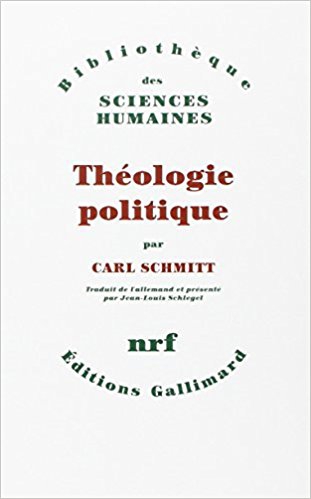 Schmitts Einsatz für das neue Regime war bedingungslos. Als Beispiel kann seine Instrumentalisierung der Verfassungsgeschichte zur Legitimation des NS-Regimes dienen.[36] Viele seiner Stellungnahmen gingen weit über das hinaus, was von einem linientreuen Juristen erwartet wurde. Schmitt wollte sich offensichtlich durch besonders schneidige Formulierungen profilieren. In Reaktion auf die Morde des NS-Regimes vom 30. Juni 1934 während der Röhm-Affäre[wp] - unter den Getöteten war auch der ihm politisch nahestehende ehemalige Reichskanzler Kurt von Schleicher[wp] - rechtfertigte er die Selbstermächtigung Hitlers mit den Worten:
Schmitts Einsatz für das neue Regime war bedingungslos. Als Beispiel kann seine Instrumentalisierung der Verfassungsgeschichte zur Legitimation des NS-Regimes dienen.[36] Viele seiner Stellungnahmen gingen weit über das hinaus, was von einem linientreuen Juristen erwartet wurde. Schmitt wollte sich offensichtlich durch besonders schneidige Formulierungen profilieren. In Reaktion auf die Morde des NS-Regimes vom 30. Juni 1934 während der Röhm-Affäre[wp] - unter den Getöteten war auch der ihm politisch nahestehende ehemalige Reichskanzler Kurt von Schleicher[wp] - rechtfertigte er die Selbstermächtigung Hitlers mit den Worten:
- "Der Führer schützt das Recht vor dem schlimmsten Missbrauch, wenn er im Augenblick der Gefahr kraft seines Führertums als oberster Gerichtsherr unmittelbar Recht schafft."
Der wahre Führer sei immer auch Richter, aus dem Führertum fließe das Richtertum.[37] Diese behauptete Übereinstimmung von "Führertum" und "Richtertum" gilt als Zeugnis einer besonderen Perversion des Rechtsdenkens. Schmitt schloss den Artikel mit dem politischen Aufruf:
- "Wer den gewaltigen Hintergrund unserer politischen Gesamtlage sieht, wird die Mahnungen und Warnungen des Führers verstehen und sich zu dem großen geistigen Kampfe rüsten, in dem wir unser gutes Recht zu wahren haben."
Öffentlich trat Schmitt wiederum als Rassist und Antisemit[38] hervor, als er die Nürnberger Rassengesetze[wp] von 1935 in selbst für nationalsozialistische Verhältnisse grotesker Stilisierung als Verfassung der Freiheit bezeichnete (so der Titel eines Aufsatzes in der Deutschen Juristenzeitung).[39]Mit dem so genannten Gesetz zum Schutze des deutschen Blutes und der deutschen Ehre[wp], das Beziehungen zwischen Juden (in der Definition der Nationalsozialisten) und "Deutschblütigen" unter Strafe stellte, trat für Schmitt "ein neues weltanschauliches Prinzip in der Gesetzgebung" auf. Diese "von dem Gedanken der Rasse getragene Gesetzgebung" stößt, so Schmitt, auf die Gesetze anderer Länder, die ebenso grundsätzlich rassische Unterscheidungen nicht kennen oder sogar ablehnen.[40] Dieses Aufeinandertreffen unterschiedlicher weltanschaulicher Prinzipien war für Schmitt Regelungsgegenstand des Völkerrechts[wp]. Höhepunkt der Schmittschen Parteipropaganda[wp] war die im Oktober 1936 unter seiner Leitung durchgeführte Tagung Das Judentum in der Rechtswissenschaft. Hier bekannte er sich ausdrücklich zum nationalsozialistischen Antisemitismus und forderte, jüdische Autoren in der juristischen Literatur nicht mehr zu zitieren oder jedenfalls als Juden zu kennzeichnen.
- "Was der Führer über die jüdische Dialektik gesagt hat, müssen wir uns selbst und unseren Studenten immer wieder einprägen, um der großen Gefahr immer neuer Tarnungen und Zerredungen zu entgehen. Mit einem nur gefühlsmäßigen Antisemitismus ist es nicht getan; es bedarf einer erkenntnismäßig begründeten Sicherheit. [...] Wir müssen den deutschen Geist von allen Fälschungen befreien, Fälschungen des Begriffes Geist, die es ermöglicht haben, dass jüdische Emigranten den großartigen Kampf des Gauleiters Julius Streicher[wp] als etwas 'Ungeistiges' bezeichnen konnten." [41]
Etwa zur selben Zeit gab es eine nationalsozialistische Kampagne gegen Schmitt, die zu seiner weitgehenden Entmachtung führte. Reinhard Mehring schreibt dazu: "Da diese Tagung aber Ende 1936 zeitlich eng mit einer nationalsozialistischen Kampagne gegen Schmitt und seiner weitgehenden Entmachtung als Funktionsträger zusammenfiel, wurde sie - schon in nationalsozialistischen Kreisen - oft als opportunistisches Lippenbekenntnis abgetan und nicht hinreichend beachtet, bis Schmitt 1991 durch die Veröffentlichung des "Glossariums", tagebuchartiger Aufzeichnungen aus den Jahren 1947 bis 1951, auch nach 1945 noch als glühender Antisemit dastand, der kein Wort des Bedauerns über Entrechtung, Verfolgung und Vernichtung fand. Seitdem ist sein Antisemitismus ein zentrales Thema. War er katholisch-christlich oder rassistisch-biologistisch begründet? ... Die Diskussion ist noch lange nicht abgeschlossen." [42]
In dem der SS[wp] nahestehenden Parteiblatt Schwarzes Korps[wp] wurde Schmitt "Opportunismus" und eine fehlende "nationalsozialistische Gesinnung" vorgeworfen. Hinzu kamen Vorhaltungen wegen seiner früheren Unterstützung der Regierung Schleichers sowie Bekanntschaften zu Juden: "An der Seite des Juden Jacobi[wp] focht Carl Schmitt im Prozess Preußen-Reich[wp] für die reaktionäre Zwischenregierung Schleicher [sic! recte: Papen]." In den Mitteilungen zur weltanschaulichen Lage[wp] des Amtes Rosenberg[wp] hieß es, Schmitt habe "mit dem Halbjuden[wp] Jacobi gegen die herrschende Lehre die Behauptung aufgestellt, es sei nicht möglich, dass etwa eine nationalsozialistische Mehrheit im Reichstag auf Grund eines Beschlusses mit Zweidrittelmehrheit nach dem Art. 76 durch verfassungsänderndes Gesetz grundlegende politische Entscheidungen der Verfassung, etwa das Prinzip der parlamentarischen Demokratie, ändern könne, denn eine solche Verfassungsänderung sei dann Verfassungswechsel, nicht Verfassungsrevision." Ab 1936 bemühten sich demnach nationalsozialistische Organe Schmitt seiner Machtposition zu berauben, ihm eine nationalsozialistische Gesinnung abzusprechen und ihm Opportunismus nachzuweisen.[43]
Durch die Publikationen im Schwarzen Korps entstand ein Skandal, in dessen Folge Schmitt alle Ämter in den Parteiorganisationen verlor. Er blieb jedoch bis zum Ende des Krieges Professor an der Friedrich-Wilhelms-Universität in Berlin und behielt den Titel Preußischer Staatsrat.
Bis zum Ende des Nationalsozialismus arbeitete Schmitt hauptsächlich auf dem Gebiet des Völkerrechts, versuchte aber auch hier zum Stichwortgeber des Regimes zu avancieren. Das zeigt etwa sein 1939 zu Beginn des Zweiten Weltkriegs[wp] entwickelter Begriff der "völkerrechtlichen Großraumordnung", den er als deutsche Monroe-Doktrin[wp] verstand. Dies wurde später zumeist als Versuch gewertet, die Expansionspolitik Hitlers völkerrechtlich zu fundieren. So war Schmitt etwa an der sog. Aktion Ritterbusch[wp] beteiligt, mit der zahlreiche Wissenschaftler die nationalsozialistische Raum[wp]- und Bevölkerungspolitik beratend begleiteten.[44]
Nach 1945
Das Kriegsende erlebte Schmitt in Berlin. Am 30. April 1945 wurde er von sowjetischen Truppen[wp]verhaftet, nach kurzem Verhör aber wieder auf freien Fuß gesetzt. Am 26. September 1945 verhafteten ihn die Amerikaner und internierten ihn bis zum 10. Oktober 1946 in verschiedenen Berliner Lagern[wp]. Ein halbes Jahr später wurde er erneut verhaftet, nach Nürnberg[wp] verbracht und dort anlässlich der Nürnberger Prozesse[wp] vom 29. März bis zum 13. Mai 1947 in Einzelhaft[wp] arretiert. Während dieser Zeit wurde er von Chef-Ankläger Robert M. W. Kempner[wp] als possible defendant (potentieller Angeklagter) bezüglich seiner "Mitwirkung direkt und indirekt an der Planung von Angriffskriegen, von Kriegsverbrechen[wp] und Verbrechen gegen die Menschlichkeit[wp]" verhört. Zu einer Anklage kam es jedoch nicht, weil eine Straftat im juristischen Sinne nicht festgestellt werden konnte: "Wegen was hätte ich den Mann anklagen können?", begründete Kempner diesen Schritt später. "Er hat keine Verbrechen gegen die Menschlichkeit begangen, keine Kriegsgefangenen getötet und keine Angriffskriege vorbereitet." [45] Schmitt selbst hatte sich in einer schriftlichen Stellungnahme als reinen Wissenschaftler beschrieben, der allerdings ein "intellektueller Abenteurer" gewesen sei und für seine Erkenntnisse einige Risiken auf sich genommen habe. Kempner entgegnete: "Wenn aber das, was Sie Erkenntnissuchen nennen, in der Ermordung von Millionen von Menschen endet?" Darauf antwortete Schmitt: "Das Christentum hat auch in der Ermordung von Millionen von Menschen geendet. Das weiß man nicht, wenn man es nicht selbst erfahren hat".[46]
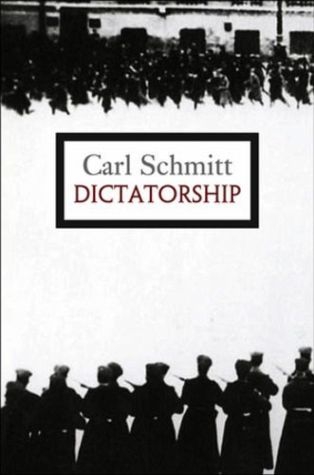 Während seiner circa siebenwöchigen Einzelhaft[wp] im Nürnberger Kriegsverbrechergefängnis schrieb Schmitt verschiedene kürzere Texte, u. a. das Kapitel Weisheit der Zelle seines 1950 erschienenen Bandes Ex Captivitate Salus. Darin erinnerte er sich der geistigen Zuflucht, die ihm während seines Berliner Semesters Max Stirner[wp] geboten hatte. So auch jetzt wieder: "Max ist der Einzige, der mich in meiner Zelle besucht." Ihm verdanke er, "dass ich auf manches vorbereitet war, was mir bis heute begegnete, und was mich sonst vielleicht überrascht hätte."[47] Nachdem der Staatsrechtler nicht mehr selbst Angeklagter war, erstellte er auf Wunsch von Kempner als Experte verschiedene Gutachten, etwa über die Stellung der Reichsminister und des Chefs der Reichskanzlei[wp] oder über die Frage, warum das Beamtentum Adolf Hitler gefolgt ist.
Während seiner circa siebenwöchigen Einzelhaft[wp] im Nürnberger Kriegsverbrechergefängnis schrieb Schmitt verschiedene kürzere Texte, u. a. das Kapitel Weisheit der Zelle seines 1950 erschienenen Bandes Ex Captivitate Salus. Darin erinnerte er sich der geistigen Zuflucht, die ihm während seines Berliner Semesters Max Stirner[wp] geboten hatte. So auch jetzt wieder: "Max ist der Einzige, der mich in meiner Zelle besucht." Ihm verdanke er, "dass ich auf manches vorbereitet war, was mir bis heute begegnete, und was mich sonst vielleicht überrascht hätte."[47] Nachdem der Staatsrechtler nicht mehr selbst Angeklagter war, erstellte er auf Wunsch von Kempner als Experte verschiedene Gutachten, etwa über die Stellung der Reichsminister und des Chefs der Reichskanzlei[wp] oder über die Frage, warum das Beamtentum Adolf Hitler gefolgt ist.
Ende 1945 war Schmitt ohne jegliche Versorgungsbezüge aus dem Staatsdienst entlassen worden. Um eine Professur bewarb er sich nicht mehr, dies wäre wohl auch aussichtslos gewesen. Stattdessen zog er sich in seine Heimatstadt Plettenberg zurück, wo er weitere Veröffentlichungen - zunächst unter einem Pseudonym - vorbereitete, etwa eine Rezension des Bonner Grundgesetzes als "Walter Haustein", die in der Eisenbahnerzeitung erschien.[48] Nach dem Kriege veröffentlichte Schmitt eine Reihe von Werken, u. a. Der Nomos der Erde,[49] Theorie des Partisanen[wp][50] und Politische Theologie II, die aber nicht an seine Erfolge in der Weimarer Zeit anknüpfen konnten. 1952 konnte er sich eine Rente erstreiten, aus dem akademischen Leben blieb er aber ausgeschlossen. Eine Mitgliedschaft in der Vereinigung der Deutschen Staatsrechtslehrer[wp] wurde ihm verwehrt.
Da Schmitt sich nie von seinem Wirken im Dritten Reich[wp] distanzierte, blieb ihm eine moralische Rehabilitation, wie sie vielen anderen NS-Rechtstheoretikern zuteilwurde (zum Beispiel Theodor Maunz[wp] oder Otto Koellreutter[wp]), versagt. Zwar litt er unter der Isolation, bemühte sich allerdings auch nie um eine Entnazifizierung[wp]. In seinem Tagebuch notierte er am 1. Oktober 1949: "Warum lassen Sie sich nicht entnazifizieren? Erstens: weil ich mich nicht gern vereinnahmen lasse und zweitens, weil Widerstand durch Mitarbeit eine Nazi-Methode aber nicht nach meinem Geschmack ist." [51]
Das einzige überlieferte öffentliche Bekenntnis seiner Scham stammt aus den Verhörprotokollen von Kempner, die später veröffentlicht wurden. Kempner: "Schämen Sie sich, daß Sie damals [1933/34] derartige Dinge [wie "Der Führer schützt das Recht"] geschrieben haben?" Schmitt: "Heute selbstverständlich. Ich finde es nicht richtig, in dieser Blamage, die wir da erlitten haben, noch herumzuwühlen." Kempner: "Ich will nicht herumwühlen." Schmitt: "Es ist schauerlich, sicherlich. Es gibt kein Wort darüber zu reden." [52]
Zentraler Gegenstand der öffentlichen Vorwürfe gegen Schmitt in der Nachkriegszeit war seine Verteidigung der Röhm-Morde[wp] ("Der Führer schützt das Recht...") zusammen mit den antisemitischen Texten der von ihm geleiteten "Judentagung" 1936 in Berlin. Beispielsweise griff der Tübinger Jurist Adolf Schüle[wp] Schmitt 1959 deswegen heftig an.[53]
Zum Holocaust hat Schmitt auch nach dem Ende des nationalsozialistischen Regimes nie ein bedauerndes Wort gefunden, wie die posthum publizierten Tagebuchaufzeichnungen (Glossarium) zeigen. Stattdessen relativierte er das Verbrechen. So notierte er: "Genozide, Völkermorde, rührender Begriff."[54]Der einzige Eintrag, der sich explizit mit der Shoa befasst, lautet:
- "Wer ist der wahre Verbrecher, der wahre Urheber des Hitlerismus? Wer hat diese Figur erfunden? Wer hat die Greuelepisode in die Welt gesetzt? Wem verdanken wir die 12 Mio. [sic!] toten Juden? Ich kann es euch sehr genau sagen: Hitler hat sich nicht selbst erfunden. Wir verdanken ihn dem echt demokratischen Gehirn, das die mythische Figur des unbekannten Soldaten des Ersten Weltkriegs[wp]ausgeheckt hat." [55]
Auch von seinem Antisemitismus war Schmitt nach 1945 nicht abgewichen. Als Beweis[56] hierfür gilt ein Eintrag in sein Glossarium vom 25. September 1947, in dem er den "assimilierten Juden" als den "wahren Feind" bezeichnete. Die Beweiskraft dieser Passage wurde allerdings auch mit dem Hinweis angezweifelt, es handele sich dabei lediglich um ein nicht kenntlich gemachtes Exzerpt.[57] Der Eintrag lautet:
- "Denn Juden bleiben immer Juden. Während der Kommunist[wp] sich bessern und ändern kann. Das hat nichts mit nordischer Rasse usw. zu tun. Gerade der assimilierte[wp] Jude ist der wahre Feind. Es hat keinen Zweck, die Parole der Weisen von Zion[wp] als falsch zu beweisen." [58]
Schmitt flüchtete sich in Selbstrechtfertigungen und stilisierte sich abwechselnd als "christlicher Epimetheus[wp]" oder als "Aufhalter des Antichristen[wp]" (Katechon[wp][59]). Die Selbststilisierung wurde zu seinem Lebenselixier. Er erfand verschiedene, immer anspielungs- und kenntnisreiche Vergleiche, die seine Unschuld illustrieren sollten. So behauptete er etwa, er habe in Bezug auf den Nationalsozialismus wie der Chemiker und Hygieniker Max von Pettenkofer[wp] gehandelt, der vor Studenten eine Kultur von Cholera-Bakterien zu sich nahm, um seine Resistenz zu beweisen. So habe auch er, Schmitt, den Virus des Nationalsozialismus freiwillig geschluckt und sei nicht infiziert worden. An anderer Stelle verglich Schmitt sich mit Benito Cereno, einer Figur Herman Melvilles[wp] aus der gleichnamigen Erzählung von 1856, in der ein Kapitän auf dem eigenen Schiff von Meuterern gefangengehalten wird. Bei Begegnung mit anderen Schiffen wird der Kapitän von den aufständischen Sklaven gezwungen, nach außen hin Normalität vorzuspielen - eine absurde Tragikomödie, die den Kapitän als gefährlich, halb verrückt und völlig undurchsichtig erscheinen lässt. Auf dem Schiff steht der Spruch: "Folgt eurem Führer" ("Seguid vuestro jefe"). Sein Haus in Plettenberg titulierte Schmitt als San Casciano, in Anlehnung an den berühmten Rückzugsort Machiavellis[wp]. Machiavelli war der Verschwörung gegen die Regierung bezichtigt und daraufhin gefoltert worden. Er hatte die Folter mit einer selbst die Staatsbediensteten erstaunenden Festigkeit ertragen. Später war die Unschuld des Theoretikers festgestellt und dieser auf freien Fuß gesetzt worden. Er blieb dem Staat aber weiterhin suspekt, war geächtet und durfte nur auf seinem ärmlichen Landgut namens La Strada bei San Casciano zu Sant' Andrea in Percussina leben.
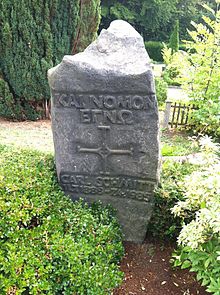 Schmitt starb im April 1985 fast 97jährig. Seine Krankheit, Zerebralsklerose[wp], brachte in Schüben immer länger andauernde Wahnvorstellungen mit sich. Schmitt, der auch schon früher durchaus paranoide[wp] Anwandlungen gezeigt hatte, fühlte sich nun von Schallwellen und Stimmen regelrecht verfolgt. Wellen wurden seine letzte Obsession. Einem Bekannten soll er gesagt haben: "Nach dem Ersten Weltkrieg habe ich gesagt: Souverän ist, wer über den Ausnahmezustand entscheidet. Nach dem Zweiten Weltkrieg, angesichts meines Todes, sage ich jetzt: Souverän ist, wer über die Wellen des Raumes verfügt." [60] Seine geistige Umnachtung ließ ihn überall elektronische Wanzen und unsichtbare Verfolger erblicken. Am Ostersonntag 1985 starb Schmitt alleine im Evangelischen Krankenhaus in Plettenberg. Sein Grab befindet sich auf dem dortigen katholischen Friedhof.[61]
Schmitt starb im April 1985 fast 97jährig. Seine Krankheit, Zerebralsklerose[wp], brachte in Schüben immer länger andauernde Wahnvorstellungen mit sich. Schmitt, der auch schon früher durchaus paranoide[wp] Anwandlungen gezeigt hatte, fühlte sich nun von Schallwellen und Stimmen regelrecht verfolgt. Wellen wurden seine letzte Obsession. Einem Bekannten soll er gesagt haben: "Nach dem Ersten Weltkrieg habe ich gesagt: Souverän ist, wer über den Ausnahmezustand entscheidet. Nach dem Zweiten Weltkrieg, angesichts meines Todes, sage ich jetzt: Souverän ist, wer über die Wellen des Raumes verfügt." [60] Seine geistige Umnachtung ließ ihn überall elektronische Wanzen und unsichtbare Verfolger erblicken. Am Ostersonntag 1985 starb Schmitt alleine im Evangelischen Krankenhaus in Plettenberg. Sein Grab befindet sich auf dem dortigen katholischen Friedhof.[61]
Denken
Die Etikettierungen Schmitts sind vielfältig. So gilt er als Nationalist, Gegner des Pluralismus[wp] und Liberalismus, Verächter des Parlamentarismus[wp], Kontrahent des Rechtsstaats, des Naturrechts[wp] und Neo-Absolutist[wp] im Gefolge eines Machiavelli[wp] und Thomas Hobbes[wp]. Zweifellos hatte sein Denken reaktionäre Züge: Er bewunderte den italienischen Faschismus, war in der Zeit des Nationalsozialismus[wp] als Antisemit[wp] hervorgetreten und hatte Rechtfertigungen für nationalsozialistische Verbrechen geliefert. Schmitts Publikationen enthielten zu jeder Zeit aktuell-politische Exkurse und Bezüge, zwischen 1933 und 1945 waren diese aber eindeutig nationalsozialistisch geprägt. Für die Übernahme von Rassismus und nationalsozialistischer Blut-und-Boden-Mythologie[wp]musste er ab 1933 seine in der Weimarer-Republik entwickelte Politische Theorie[wp] nur graduell modifizieren.
Trotz dieser reaktionären Aspekte und eines offenbar zeitlebens vorhandenen, wenn auch unterschiedlich ausgeprägten Antisemitismus wird Schmitt auch heutzutage ein originelles staatsphilosophisches[wp]Denken attestiert. Im Folgenden sollen seine grundlegenden Konzepte zumindest überblicksartig skizziert werden, wobei die zeitbezogenen Aspekte in den Hintergrund treten.
Schmitt als Katholik und Kulturkritiker
Als Katholik war Schmitt von einem tiefen Pessimismus gegenüber Fortschrittsvorstellungen, Fortschrittsoptimismus und Technisierung[wp] geprägt. Vor dem Hintergrund der Ablehnung wertneutraler Denkweisen und relativistischer Konzepte[wp] entwickelte er eine spezifische Kulturkritik[wp], die sich in verschiedenen Passagen durch seine Arbeiten zieht. Insbesondere das Frühwerk enthält zum Teil kulturpessimistische Ausbrüche. Das zeigt sich vor allem in einer seiner ersten Publikationen, in der er sich mit dem Dichter Theodor Däubler[wp] und seinem Epos[wp] Nordlicht (1916) auseinandersetzte. Hier trat der Jurist vollständig hinter den kunstinteressierten Kulturkommentator zurück. Auch sind gnostische[wp] Anspielungen erkennbar, die Schmitt - er war ein großer Bewunderer Marcions[wp][62] - wiederholt einfließen ließ. Ebenso deutlich wurden Hang und Talent zur Typisierung.
Theodor Däubler war Inspirator für Schmitts Kulturkritik der Moderne
Der junge Schmitt zeigte sich als Polemiker gegen bürgerliche "Sekurität" und saturierte Passivität mit antikapitalistischen Anklängen. Diese Haltung wird vor allem in seinem Buch über Theodor Däublers[wp]Nordlicht deutlich:
- "Dies Zeitalter hat sich selbst als das kapitalistische, mechanistische[wp], relativistische bezeichnet, als das Zeitalter des Verkehrs, der Technik, der Organisation. In der Tat scheint der Betrieb ihm die Signatur zu geben. Der Betrieb als das großartig funktionierende Mittel zu irgendeinem kläglichen oder sinnlosen Zweck[wp], die universelle Vordringlichkeit des Mittels vor dem Zweck, der Betrieb, der den Einzelnen so vernichtet, daß er seine Aufhebung nicht einmal fühlt und der sich dabei nicht auf eine Idee, sondern höchstens ein paar Banalitäten beruft und immer nur geltend macht, daß alles sich glatt und ohne unnütze Reibung abwickeln müsse."
Für den Däubler referierenden Schmitt sind die Menschen durch ihren "ungeheuren materiellen Reichtum" nichts als "arme Teufel" geworden, ein "Schatten der zur Arbeit hinkt":
- " Sie wissen alles und glauben nichts. Sie interessieren sich für alles und begeistern sich für nichts. Sie verstehen alles, ihre Gelehrten registrieren in der Geschichte, in der Natur, in der eigenen Seele. Sie sind Menschenkenner, Psychologen[wp] und Soziologen[wp] und schreiben schließlich eine Soziologie der Soziologie."
Die Betrieb und Organisation gewordene Gesellschaft, dem bedingungslosen Diktat der Zweckmäßigkeit gehorchend, lässt demzufolge "keine Geheimnisse und keinen Überschwang der Seele gelten". Die Menschen sind matt und verweltlicht und können sich zu keiner transzendenten[wp] Position mehr aufraffen:
- "Sie wollen den Himmel auf der Erde, den Himmel als Ergebnis von Handel und Industrie, der tatsächlich hier auf der Erde liegen soll, in Berlin, Paris oder New York, einen Himmel mit Badeeinrichtungen, Automobilen und Klubsesseln, dessen heiliges Buch der Fahrplan wäre." [63]
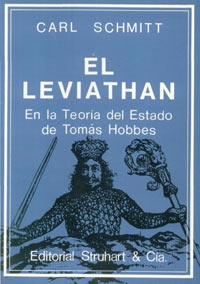 Bei Däubler erschien der Fortschritt als Werk des Antichristen, des großen Zauberers. In seine Rezeption nahm Schmitt antikapitalistische Elemente auf: Der Antichrist[wp], der "unheimliche Zauberer", macht die Welt Gottes nach. Er verändert das Antlitz der Erde und macht die Natur sich untertan[wp]: "Sie dient ihm; wofür ist gleichgültig, für irgendeine Befriedigung künstlicher Bedürfnisse, für Behagen und Komfort." Die getäuschten Menschen sehen nach dieser Auffassung nur den fabelhaften Effekt. Die Natur scheint ihnen überwunden, das "Zeitalter der Sekurität" angebrochen. Für alles sei gesorgt, eine "kluge Voraussicht und Planmäßigkeit" ersetze die Vorsehung. Die Vorsehung macht der "große Zauberer" wie "irgendeine Institution":
Bei Däubler erschien der Fortschritt als Werk des Antichristen, des großen Zauberers. In seine Rezeption nahm Schmitt antikapitalistische Elemente auf: Der Antichrist[wp], der "unheimliche Zauberer", macht die Welt Gottes nach. Er verändert das Antlitz der Erde und macht die Natur sich untertan[wp]: "Sie dient ihm; wofür ist gleichgültig, für irgendeine Befriedigung künstlicher Bedürfnisse, für Behagen und Komfort." Die getäuschten Menschen sehen nach dieser Auffassung nur den fabelhaften Effekt. Die Natur scheint ihnen überwunden, das "Zeitalter der Sekurität" angebrochen. Für alles sei gesorgt, eine "kluge Voraussicht und Planmäßigkeit" ersetze die Vorsehung. Die Vorsehung macht der "große Zauberer" wie "irgendeine Institution":
- "Er weiß im unheimlichen Kreisen der Geldwirtschaft unerklärliche Werte zu schaffen, er trägt aber auch höheren kulturellen Bedürfnissen Rechnung, ohne sein Ziel dadurch zu vergessen. [...] Gold wird zum Geld, das Geld zum Kapital[wp] - und nun beginnt der verheerende Lauf des Verstandes, der alles in seinen Relativismus hereinreißt, den Aufruhr der armen Bauern mit Witzen und Kanonen höhnisch niederschlägt und endlich über die Erde reitet als einer der apokalyptischen Reiter[wp], die der Auferstehung des Fleisches vorauseilen." [64]
Sehr viel später, nach dem Zweiten Weltkrieg, notierte Schmitt, diese apokalyptische[wp] Sehnsucht nach Verschärfung aufgreifend, in sein Tagebuch:
- "Das ist das geheime Schlüsselwort meiner gesamten geistigen und publizistischen Existenz: das Ringen um die eigentlich katholische Verschärfung (gegen die Neutralisierer, die ästhetischen Schlaraffen, gegen Fruchtabtreiber, Leichenverbrenner und Pazifisten)." [65]
Ebenso wie Däublers Kampf gegen Technik, Fortschritt und Machbarkeit faszinierte Schmitt das negative Menschenbild der Gegenrevolution[wp]. Das Menschenbild Donoso Cortés[wp]' charakterisierte er etwa 1922 mit anklingender Bewunderung in seiner Politischen Theologie als universale Verachtung des Menschengeschlechts:
- "Seine [Cortés'] Verachtung des Menschen kennt keine Grenzen mehr; ihr blinder Verstand, ihr schwächlicher Wille, der lächerliche Elan ihrer fleischlichen Begierden scheinen ihm so erbärmlich, daß alle Worte aller menschlichen Sprachen nicht ausreichen, um die ganze Niedrigkeit dieser Kreatur auszudrücken. Wäre Gott nicht Mensch geworden - das Reptil, das mein Fuß zertritt, wäre weniger verächtlich als ein Mensch. Die Stupidität der Massen ist ihm ebenso erstaunlich wie die dumme Eitelkeit ihrer Führer. Sein Sündenbewußtsein ist universal, furchtbarer als das eines Puritaners[wp]. [...] Die Menschheit taumelt blind durch ein Labyrinth, dessen Eingang, Ausgang und Struktur keiner kennt, und das nennen wir Geschichte; die Menschheit ist ein Schiff, das ziellos auf dem Meer umhergeworfen wird, bepackt mit einer aufrührerischen, ordinären, zwangsweise rekrutierten Mannschaft, die gröhlt und tanzt, bis Gottes Zorn das rebellische Gesindel ins Meer stößt, damit wieder Schweigen herrsche."[66]
In der Politischen Romantik weitete Schmitt 1919 die Polemik gegen den zeitgenössischen Literaturbetrieb aus den bereits 1913 erschienenen Schattenrissen zu einer grundsätzlichen Kritik des bürgerlichen[wp] Menschentyps aus. Die Romantik[wp] ist für ihn "psychologisch und historisch ein Produkt bürgerlicher Sekurität". Der Romantiker, so Schmitts Kritik, will sich für nichts mehr entscheiden, sondern nur erleben und sein Erleben stimmungsvoll umschreiben:
- "Weder logische Distinktionen, noch moralische Werturteile, noch politische Entscheidungen sind ihm möglich. Die wichtigste Quelle politischer Vitalität, der Glaube an das Recht und die Empörung über das Unrecht, existiert nicht für ihn".
Hier zieht sich eine Linie durch das schmittsche Frühwerk. Das "Zeitalter der Sekurität" führt für ihn zu Neutralisierung und Entpolitisierung und damit zu einer Vernichtung der staatlichen Lebensgrundlage. Denn dem Romantiker ist "jede Beziehung zu einem rechtlichen oder moralischen Urteil disparat". Jede Norm[wp] erscheint ihm als "antiromantische Tyrannei". Eine rechtliche oder moralische Entscheidung ist dem Romantiker also sinnlos:
- "Der Romantiker ist deshalb nicht in der Lage, aus bewußtem Entschluß Partei zu ergreifen und sich zu entscheiden. Nicht einmal die Staatstheorie, die von dem 'von Natur bösen' Menschen ausgeht, kann er mit romantischen Mitteln entschieden ablehnen, denn wenn sie auch noch so vielen Romantikern unsympathisch ist, so besteht doch die Möglichkeit, auch diesen bösen Menschen, die 'Bestie', zu romantisieren, sofern sie nur weit genug entfernt ist. Romantisch handelt es sich eben um Höheres als um eine Entscheidung. Die selbstbewußte Frühromantik[wp], die sich vom Schwung der andern irrationalen[wp] Bewegungen ihrer Zeit tragen ließ und zudem das absolute, weltschöpferische Ich spielte, empfand das als Überlegenheit."
Daher gibt es nach Schmitt keine politische Produktivität im Romantischen. Es wird vielmehr völlige Passivität gepredigt und auf "mystische, theologische und traditionalistische Vorstellungen, wie Gelassenheit, Demut und Dauer" verwiesen.
- "Das ist also der Kern aller politischer Romantik: der Staat ist ein Kunstwerk, der Staat der historisch-politischen Wirklichkeit ist occasio zu der das Kunstwerk produzierenden schöpferischen Leistung des romantischen Subjekts, Anlaß zur Poesie und zum Roman, oder auch zu einer bloßen romantischen Stimmung." [67]
In seiner Schrift Römischer Katholizismus und politische Form (1923) analysierte Schmitt die Kirche[wp]als eine Complexio Oppositorum, also eine alles umspannende Einheit der Widersprüche. Schmitt diagnostiziert einen "anti-römischen Affekt". Dieser Affekt, der sich Schmitt zufolge durch die Jahrhunderte zieht, resultiert aus der Angst vor der unfassbaren politischen Macht des römischen Katholizismus, der "päpstlichen Maschine", also eines ungeheuren hierarchischen Verwaltungsapparats, der das religiöse Leben kontrollieren und die Menschen dirigieren will. Bei Dostojewski[wp] und seinem "Großinquisitor"[wp] erhebt sich demnach das anti-römische Entsetzen noch einmal zu voller säkularer[wp]Größe.
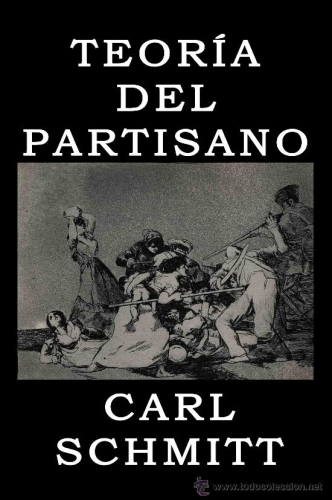 Zu jedem Weltreich, also auch dem römischen, gehöre ein gewisser Relativismus gegenüber der "bunten Menge möglicher Anschauungen, rücksichtslose Überlegenheit über lokale Eigenarten und zugleich opportunistische Toleranz in Dingen, die keine zentrale Bedeutung haben". In diesem Sinne sei die Kirche Complexio Oppositorum: "Es scheint keinen Gegensatz zu geben, den sie nicht umfasst". Dabei wird das Christentum nicht als Privatsache und reine Innerlichkeit[wp] aufgefasst, sondern zu einer "sichtbaren Institution" gestaltet. Ihr Formprinzip sei das der Repräsentation.[68] Dieses Prinzip der Institution sei der Wille zur Gestalt, zur politischen Form.
Zu jedem Weltreich, also auch dem römischen, gehöre ein gewisser Relativismus gegenüber der "bunten Menge möglicher Anschauungen, rücksichtslose Überlegenheit über lokale Eigenarten und zugleich opportunistische Toleranz in Dingen, die keine zentrale Bedeutung haben". In diesem Sinne sei die Kirche Complexio Oppositorum: "Es scheint keinen Gegensatz zu geben, den sie nicht umfasst". Dabei wird das Christentum nicht als Privatsache und reine Innerlichkeit[wp] aufgefasst, sondern zu einer "sichtbaren Institution" gestaltet. Ihr Formprinzip sei das der Repräsentation.[68] Dieses Prinzip der Institution sei der Wille zur Gestalt, zur politischen Form.
Die hier anklingenden strukturellen Analogien zwischen theologischen[wp] und staatsrechtlichen[wp]Begriffen verallgemeinerte Schmitt 1922 in der Politischen Theologie zu der These:
- "Alle prägnanten Begriffe der modernen Staatslehre[wp] sind säkularisierte theologische Begriffe. Nicht nur ihrer historischen Entwicklung nach, weil sie aus der Theologie auf die Staatslehre übertragen wurden, sondern auch in ihrer systematischen Struktur, deren Erkenntnis notwendig ist für eine soziologische Betrachtung dieser Begriffe." [69]
Schon im Frühwerk wird erkennbar, dass Schmitt bürgerliche und liberale Vorstellungen von Staat und Politik zurückwies. Für ihn war der Staat nicht statisch und normativ, sondern vital, dynamisch und faktisch. Daher betonte er das Element der Dezision[wp] gegenüber der Deliberation[wp] und die Ausnahme gegenüber der Norm. Schmitts Staatsvorstellung war organisch, nicht technizistisch. Der politische Denker Schmitt konzentrierte sich vor allem auf soziale Prozesse, die Staat und Verfassung seiner Meinung nach vorausgingen und beide jederzeit gefährden oder aufheben konnten. Als Rechtsphilosoph behandelte er von verschiedenen Perspektiven aus das Problem der Rechtsbegründung und die Frage nach der Geltung von Normen[wp].
Schmitt als politischer Denker
Schmitts Auffassung des Staates setzt den Begriff des Politischen voraus. Anstelle eines Primats des Rechts, postuliert er einen Primat der Politik[wp]. In diesem Sinne war er, wie hier nur angemerkt sei, ein Nestor der jungen akademischen Disziplin der "Politikwissenschaft"[wp]. Der Rechtsordnung, d. h. der durch das Recht gestalteten und definierten Ordnung, geht für Schmitt immer eine andere, nämlich eine staatliche Ordnung voraus. Es ist diese vor-rechtliche Ordnung, die es dem Recht erst ermöglicht, konkrete Wirklichkeit zu werden. Mit anderen Worten: Das Politische folgt einer konstitutiven[wp] Logik, das Rechtswesen einer regulativen. Die Ordnung wird bei Schmitt durch den Souverän[wp] hergestellt, der unter Umständen zu ihrer Sicherung einen Gegner zum existentiellen Feind erklären kann, den es zu bekämpfen, womöglich zu vernichten gelte. Um dies zu tun, dürfe der Souverän die Schranken beseitigen, die mit der Idee des Rechts gegeben sind.
Der Mensch ist für den Katholiken Schmitt nicht von Natur aus gut, allerdings auch nicht von Natur aus böse, sondern unbestimmt - also fähig zum Guten wie zum Bösen. Damit wird er aber (zumindest potentiell) gefährlich und riskant. Weil der Mensch nicht vollkommen gut ist, bilden sich Feindschaften. Derjenige Bereich, in dem zwischen Freund und Feind unterschieden wird, ist für Schmitt die Politik. Der Feind ist in dieser auf die griechische Antike zurückgehenden Sicht immer der öffentliche Feind (hostis bzw. "πολέμιος"), nie der private Feind (inimicus bzw. ""εχθρός"). Die Aufforderung "Liebet eure Feinde" aus der Bergpredigt[wp] (nach der Vulgata[wp]: diligite inimicos vestros, Matthäus 5,44 und Lukas 6,27) beziehe sich dagegen auf den privaten Feind. In einem geordneten Staatswesen gibt es somit für Schmitt eigentlich keine Politik, jedenfalls nicht im existentiellen Sinne einer radikalen Infragestellung, sondern nur sekundäre Formen des Politischen (z. B. Polizei).
Unter Politik versteht Schmitt einen Intensitätsgrad der Assoziation und Dissoziation von Menschen ("Die Unterscheidung von Freund und Feind hat den Sinn, den äußersten Intensitätsgrad einer Verbindung oder Trennung, einer Assoziation oder Dissoziation zu bezeichnen"). Diese dynamische, nicht auf ein Sachgebiet begrenzte Definition eröffnete eine neue theoretische Fundierung politischer Phänomene. Für Schmitt war diese Auffassung der Politik eine Art Grundlage seiner Rechtsphilosophie. Ernst-Wolfgang Böckenförde[wp] führt in seiner Abhandlung Der Begriff des Politischen als Schlüssel zum staatsrechtlichen Werk Carl Schmitts (Abdruck in: Recht, Staat, Freiheit, 1991) dazu aus: Nur wenn die Intensität unterhalb der Schwelle der offenen Freund-Feind-Unterscheidung gehalten werde, besteht Schmitt zufolge eine Ordnung. Im anderen Falle drohen Krieg oder Bürgerkrieg. Im Kriegsfall hat man es in diesem Sinne mit zwei souveränen Akteuren zu tun; der Bürgerkrieg[wp] stellt dagegen die innere Ordnung als solche in Frage. Eine Ordnung existiert nach Schmitt immer nur vor dem Horizont ihrer radikalen Infragestellung. Die Feind-Erklärung ist dabei ausdrücklich immer an den extremen Ausnahmefall gebunden (extremis neccessitatis causa).
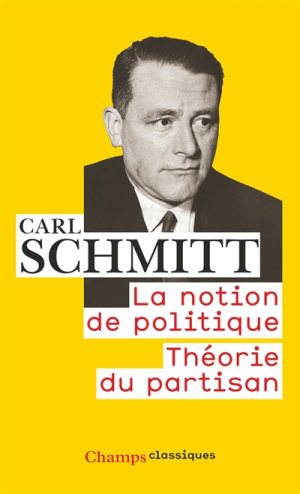 Schmitt selbst gibt keine Kriterien dafür an die Hand, unter welchen Umständen ein Gegenüber als Feind zu beurteilen ist. Im Sinne seines Denkens ist das folgerichtig, da sich das Existenzielle einer vorgängigen Normierung entzieht. Als (öffentlichen) Feind fasst er denjenigen auf, der per autoritativer Setzung durch den Souverän zum Feind erklärt wird. Diese Aussage ist zwar anthropologisch realistisch, gleichwohl ist sie theoretisch problematisch. In eine ähnliche Richtung argumentiert Günther Jakobs[wp] mit seinem Konzept des Feindstrafrechts[wp] zum Umgang mit Staatsfeinden. In diesem Zusammenhang wird häufig auf Carl Schmitt verwiesen, auch wenn Jakobs Schmitt bewusst nicht zitiert hat. So heißt es bei dem Publizisten Thomas Uwer 2006: "An keiner Stelle zitiert Jakobs Carl Schmitt, aber an jeder Stelle scheint er hervor".[70] Auch die vom damaligen Innenminister Wolfgang Schäuble[wp] ausgehende öffentliche Debatte um den Kölner Rechtsprofessor Otto Depenheuer[wp] und dessen These zur Selbstbehauptung des Staates bei terroristischer Bedrohung gehören in diesen Zusammenhang, da Depenheuer sich ausdrücklich auf Schmitt beruft.[71]
Schmitt selbst gibt keine Kriterien dafür an die Hand, unter welchen Umständen ein Gegenüber als Feind zu beurteilen ist. Im Sinne seines Denkens ist das folgerichtig, da sich das Existenzielle einer vorgängigen Normierung entzieht. Als (öffentlichen) Feind fasst er denjenigen auf, der per autoritativer Setzung durch den Souverän zum Feind erklärt wird. Diese Aussage ist zwar anthropologisch realistisch, gleichwohl ist sie theoretisch problematisch. In eine ähnliche Richtung argumentiert Günther Jakobs[wp] mit seinem Konzept des Feindstrafrechts[wp] zum Umgang mit Staatsfeinden. In diesem Zusammenhang wird häufig auf Carl Schmitt verwiesen, auch wenn Jakobs Schmitt bewusst nicht zitiert hat. So heißt es bei dem Publizisten Thomas Uwer 2006: "An keiner Stelle zitiert Jakobs Carl Schmitt, aber an jeder Stelle scheint er hervor".[70] Auch die vom damaligen Innenminister Wolfgang Schäuble[wp] ausgehende öffentliche Debatte um den Kölner Rechtsprofessor Otto Depenheuer[wp] und dessen These zur Selbstbehauptung des Staates bei terroristischer Bedrohung gehören in diesen Zusammenhang, da Depenheuer sich ausdrücklich auf Schmitt beruft.[71]
Dabei bewegt sich eine politische Daseinsform bei Schmitt ganz im Bereich des Existenziellen[wp]. Normative Urteile kann man über sie nicht fällen ("Was als politische Größe existiert, ist, juristisch betrachtet, wert, dass es existiert"). Ein solcher Relativismus[wp] und Dezisionismus[wp][72] bindet eine politische Ordnung nicht an Werte wie Freiheit oder Gerechtigkeit, im Unterschied z. B. zu Montesquieu[wp], sondern sieht den höchsten Wert axiomatisch[wp] im bloßen Vorhandensein dieser Ordnung selbst. Diese und weitere irrationalistische[wp] Ontologismen[wp], etwa sein Glaube an einen "Überlebenskampf zwischen den Völkern", machten Schmitt aufnahmefähig für die Begriffe und die Rhetorik der Nationalsozialisten. Das illustriert die Grenze und zentrale Schwäche von Schmitts Begriffsbildung.
Schmitts Rechtsphilosophie
Schmitt betonte, er habe als Jurist eigentlich nur "zu Juristen und für Juristen" geschrieben. Neben einer großen Zahl konkreter verfassungs- und völkerrechtlicher Gutachten legte er auch eine Reihe systematischer Schriften vor, die stark auf konkrete Situationen hin angelegt waren. Trotz der starken fachjuristischen Ausrichtung ist es möglich, aus der Vielzahl der Bücher und Aufsätze eine mehr oder weniger geschlossene Rechtsphilosophie[wp] zu rekonstruieren. Eine solche geschlossene Lesart veröffentlichte zuletzt 2004 der Luxemburger Rechtsphilosoph und Machiavelli-Kenner Norbert Campagna.[73]
Schmitts rechtsphilosophisches Grundanliegen ist das Denken des Rechts vor dem Hintergrund der Bedingungen seiner Möglichkeit. Das abstrakte Sollen[wp] setzt demnach immer ein bestimmtes geordnetes Sein[wp] voraus, das ihm erst die Möglichkeit gibt, sich zu verwirklichen. Schmitt denkt also in genuin rechtssoziologischen[wp] Kategorien. Ihn interessiert vor allem die immer gegebene Möglichkeit, dass Rechtsnormen[wp] und Rechtsverwirklichung auseinander fallen. Zunächst müssen nach diesem Konzept die Voraussetzungen geschaffen werden, die es den Rechtsgenossen ermöglichen, sich an die Rechtsnormen zu halten. Da die "normale" Situation aber für Schmitt immer fragil und gefährdet ist, kann seiner Ansicht nach die paradoxe Notwendigkeit eintreten, dass gegen Rechtsnormen verstoßen werden muss, um die Möglichkeit einer Geltung des Rechts[wp] herzustellen. Damit erhebt sich für Schmitt die Frage, wie das Sollen sich im Sein ausdrücken kann, wie also aus dem gesollten Sein ein existierendes Sein werden kann.
Verfassung, Souveränität und Ausnahmezustand
Der herrschenden Meinung der Rechtsphilosophie, vor allem aber dem Liberalismus, warf Schmitt vor, das selbständige Problem der Rechtsverwirklichung zu ignorieren.[74] Dieses Grundproblem ist für ihn unlösbar mit der Frage nach Souveränität, Ausnahmezustand[wp] und einem Hüter der Verfassung verknüpft. Anders als liberale Denker, denen er vorwarf, diese Fragen auszublenden, definierte Schmitt den Souverän als diejenige staatliche Gewalt, die in letzter Instanz, also ohne die Möglichkeit Rechtsmittel einzulegen, entscheidet.[75] Den Souverän betrachtet er als handelndes Subjekt und nicht als Rechtsfigur. Laut Schmitt ist er nicht juristisch geformt, aber durch ihn entsteht die juristische Form, indem der Souverän die Rahmenbedingungen des Rechts herstellt. "Die Ordnung muss hergestellt sein, damit die Rechtsordnung einen Sinn hat"[76] Wie Campagna betont hängt damit allerdings auch das Schicksal der Rechtsordnung von der sie begründenden Ordnung ab.[77]
Als erster entwickelte Schmitt keine Staatslehre[wp], sondern eine Verfassungslehre[wp]. Die Verfassung bezeichnete er in ihrer positiven Substanz als "eine konkrete politische Entscheidung über Art und Form der politischen Existenz". Diesen Ansatz grenzt er mit der Formel "Entscheidung aus dem normativen Nichts" positivistisch[wp] gegen naturrechtliche[wp] Vorstellungen ab. Erst wenn der souveräne Verfassungsgeber bestimmte Inhalte als Kern der Verfassung hervorhebt, besitzt die Verfassung demnach einen substanziellen Kern.
Zum politischen Teil der modernen Verfassung gehören für Schmitt etwa die Entscheidung für die Republik[wp], die Demokratie und den Parlamentarismus[wp], wohingegen das Votum für die Grundrechte und die Gewaltenteilung den rechtsstaatlichen Teil der Verfassung ausmacht. Während der politische Teil das Funktionieren des Staates konstituiert, zieht der rechtsstaatliche Teil, so Schmitt, diesem Funktionieren Grenzen. Eine Verfassung nach Schmitts Definition hat immer einen politischen Teil, nicht unbedingt aber einen rechtsstaatlichen. Damit Grundrechte überhaupt wirksam sein können, muss es für Schmitt zunächst einen Staat geben, dessen Macht sie begrenzen. Mit diesem Konzept verwirft er implizit den naturrechtlichen Gedanken universeller Menschenrechte, die für jede Staatsform[wp] unabhängig von durch den Staat gesetztem Recht[wp] gelten, und setzt sich auch hier in Widerspruch zum Liberalismus.
Jede Verfassung steht in ihrem Kern, argumentiert Schmitt, nicht zur Disposition wechselnder politischer Mehrheiten, das Verfassungssystem ist vielmehr unveränderlich. Es sei nicht der Sinn der Verfassungsbestimmungen über die Verfassungsrevision, ein Verfahren zur Beseitigung des Ordnungssystems zu eröffnen, das durch die Verfassung konstituiert werden soll. Wenn in einer Verfassung die Möglichkeit einer Verfassungsrevision vorgesehen ist, so solle das keine legale[wp] Methode zu ihrer eigenen Abschaffung etablieren.[78]
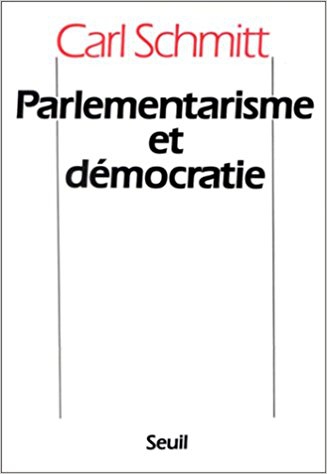 Durch die politische Verfassung, also die Entscheidung über Art und Form der Existenz, entsteht demzufolge eine Ordnung, in der Normen wirksam werden können ("Es gibt keine Norm, die auf ein Chaos anwendbar wäre"). Im eigentlichen Sinne politisch ist eine Existenzform nur dann, wenn sie kollektiv ist, wenn also ein vom individuellen Gut eines jeden Mitglieds verschiedenes kollektives Gut im Vordergrund steht. In der Verfassung, so Schmitt, drücken sich immer bestimmte Werte aus, vor deren Hintergrund unbestimmte Rechtsbegriffe wie die "öffentliche Sicherheit"[wp] erst ihren konkreten Inhalt erhalten. Die Normalität[wp] könne nur vor dem Hintergrund dieser Werte überhaupt definiert werden. Das wesentliche Element der Ordnung ist dabei für Schmitt die Homogenität[wp] als Übereinstimmung aller bezüglich der fundamentalen Entscheidung hinsichtlich des politischen Seins der Gemeinschaft.[79] Dabei ist Schmitt bewusst, dass es illusorisch wäre, eine weitreichende gesellschaftliche Homogenität erreichen zu wollen. Er bezeichnet die absolute Homogenität daher als "idyllischen Fall".
Durch die politische Verfassung, also die Entscheidung über Art und Form der Existenz, entsteht demzufolge eine Ordnung, in der Normen wirksam werden können ("Es gibt keine Norm, die auf ein Chaos anwendbar wäre"). Im eigentlichen Sinne politisch ist eine Existenzform nur dann, wenn sie kollektiv ist, wenn also ein vom individuellen Gut eines jeden Mitglieds verschiedenes kollektives Gut im Vordergrund steht. In der Verfassung, so Schmitt, drücken sich immer bestimmte Werte aus, vor deren Hintergrund unbestimmte Rechtsbegriffe wie die "öffentliche Sicherheit"[wp] erst ihren konkreten Inhalt erhalten. Die Normalität[wp] könne nur vor dem Hintergrund dieser Werte überhaupt definiert werden. Das wesentliche Element der Ordnung ist dabei für Schmitt die Homogenität[wp] als Übereinstimmung aller bezüglich der fundamentalen Entscheidung hinsichtlich des politischen Seins der Gemeinschaft.[79] Dabei ist Schmitt bewusst, dass es illusorisch wäre, eine weitreichende gesellschaftliche Homogenität erreichen zu wollen. Er bezeichnet die absolute Homogenität daher als "idyllischen Fall".
Seit dem 19. Jahrhundert besteht laut Schmitt die Substanz der Gleichheit vor allem in der Zugehörigkeit zu einer bestimmten Nation[wp]. Homogenität in der modernen Demokratie ist aber nie völlig zu verwirklichen, sondern es liegt stets ein "Pluralismus"[wp] partikularer[wp] Interessen vor, daher ist nach Schmitts Auffassung die "Ordnung" immer gefährdet. Die Kluft von Sein und Sollen könne jederzeit aufbrechen. Der für Schmitt zentrale Begriff der Homogenität ist zunächst nicht ethnisch[wp] oder gar rassistisch gedacht, sondern vielmehr positivistisch: Die Nation verwirklicht sich in der Absicht, gemeinsam eine Ordnung zu bilden. Nach 1933 stellte Schmitt sein Konzept allerdings ausdrücklich auf den Begriff der "Rasse" ab.
Der Souverän schafft und garantiert in Schmitts Denken die Ordnung. Hierfür hat er das Monopol der letzten Entscheidung. Souveränität ist für Schmitt also juristisch von diesem Entscheidungsmonopol her zu definieren ("Souverän ist, wer über den Ausnahmezustand entscheidet"), nicht von einem Gewalt- oder Herrschaftsmonopol[wp] aus. Die im Ausnahmezustand getroffenen Entscheidungen (Verurteilungen, Notverordnungen[wp] etc.) lassen sich aus Schmitts Sicht hinsichtlich ihrer Richtigkeit nicht anfechten ("Dass es die zuständige Stelle war, die eine Entscheidung fällt, macht die Entscheidung [...] unabhängig von der Richtigkeit ihres Inhaltes"). Souverän ist für Schmitt dabei immer derjenige, der den Bürgerkrieg[wp] vermeiden oder wirkungsvoll beenden kann.
Die Ausnahmesituation hat daher den Charakter eines heuristischen[wp] Prinzips:
- "Die Ausnahme ist interessanter als der Normalfall. Das Normale beweist nichts, die Ausnahme beweist alles; sie bestätigt nicht nur die Regel, die Regel lebt überhaupt nur von der Ausnahme. In der Ausnahme durchbricht die Kraft des wirklichen Lebens die Kruste einer in der Wiederholung erstarrten Mechanik." [80]
Repräsentation, Demokratie und Homogenität
Der moderne Staat ist für Schmitt demokratisch legitimiert. Demokratie in diesem Sinne bedeutet die "Identität von Herrscher und Beherrschten, Regierenden und Regierten, Befehlenden und Gehorchenden". Zum Wesen der Demokratie gehört die "Gleichheit", die sich allerdings nur nach innen richtet und daher nicht die Bürger anderer Staaten umfasst. Innerhalb eines demokratischen Staatswesens sind alle Staatsangehörigen gleich. Demokratie als Staatsform setzt laut Schmitt immer ein "politisch geeintes Volk" voraus. Die demokratische Gleichheit verweist damit auf eine Gleichartigkeit bzw. Homogenität. In der Zeit des Nationalsozialismus[wp] bezeichnete Schmitt dieses Postulat nicht mehr als "Gleichartigkeit", sondern als "Artgleichheit".
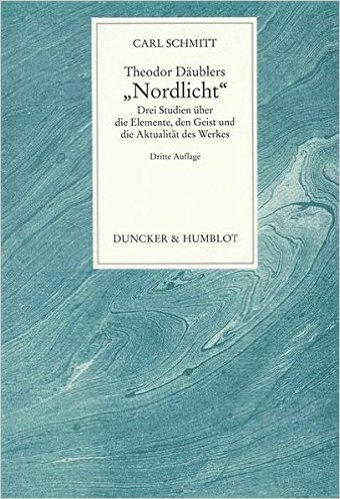 Die Betonung der Notwendigkeit einer relativen Homogenität teilt Schmitt mit seinem Antipoden Hermann Heller[wp], der die Homogenität jedoch sozial und nicht politisch verstand.[81] Heller hatte sich im Jahre 1928 brieflich an Schmitt gewandt, da er eine Reihe von Gemeinsamkeiten im verfassungspolitischen Urteil bemerkt hatte. Neben der Frage der politischen Homogenität betraf das vor allem die Nutzung des Notverordnungsparagraphen Art. 48 in der Weimarer Verfassung[wp], zu der Schmitt 1924 ein Referat auf der Versammlung der Staatsrechtslehrer gehalten hatte, mit dem Heller übereinstimmte. Der Austausch brach jedoch abrupt wieder ab, nachdem Heller Schmitts Begriff des Politischen Bellizismus[wp]vorgeworfen hatte. Schmitt hatte diesem Urteil vehement widersprochen.
Die Betonung der Notwendigkeit einer relativen Homogenität teilt Schmitt mit seinem Antipoden Hermann Heller[wp], der die Homogenität jedoch sozial und nicht politisch verstand.[81] Heller hatte sich im Jahre 1928 brieflich an Schmitt gewandt, da er eine Reihe von Gemeinsamkeiten im verfassungspolitischen Urteil bemerkt hatte. Neben der Frage der politischen Homogenität betraf das vor allem die Nutzung des Notverordnungsparagraphen Art. 48 in der Weimarer Verfassung[wp], zu der Schmitt 1924 ein Referat auf der Versammlung der Staatsrechtslehrer gehalten hatte, mit dem Heller übereinstimmte. Der Austausch brach jedoch abrupt wieder ab, nachdem Heller Schmitts Begriff des Politischen Bellizismus[wp]vorgeworfen hatte. Schmitt hatte diesem Urteil vehement widersprochen.
In der Frage der politischen Homogenität hat sich auch das Bundesverfassungsgericht in dem berühmten Maastricht-Urteil[wp] 1993 auf eine relative politische Homogenität berufen: "Die Staaten bedürfen hinreichend bedeutsamer eigener Aufgabenfelder, auf denen sich das jeweilige Staatsvolk in einem von ihm legitimierten und gesteuerten Prozeß politischer Willensbildung entfalten und artikulieren kann, um so dem, was es - relativ homogen - geistig, sozial und politisch verbindet, rechtlichen Ausdruck zu geben." Dabei bezog es sich ausdrücklich auf Hermann Heller, obwohl der Sachverhalt inhaltlich eher Schmitt hätte zugeordnet werden müssen. Dazu schreibt der Experte für Öffentliches Recht[wp] Alexander Proelß[wp] 2003: "Die Benennung Hellers zur Stützung der Homogenitätsvoraussetzung des {Staatsvolkes geht jedenfalls fehl [...]. Das Gericht dürfte primär das Ziel verfolgt haben, der offenbar als wenig wünschenswert erschienenen Zitierung des historisch belasteten Schmitt auszuweichen."[82]
Hinter den bloß partikularen Interessen muss es, davon geht Schmitt im Sinne Rousseaus[wp] aus, eine volonté générale[wp] geben, also ein gemeinsames, von allen geteiltes Interesse. Diese "Substanz der Einheit" ist eher dem Gefühl als der Rationalität zugeordnet. Wenn eine starke und bewusste Gleichartigkeit und damit die politische Aktionsfähigkeit fehlt, bedarf es nach Schmitt der Repräsentation[wp]. Wo das Element der Repräsentation in einem Staat überwiege, nähere sich der Staat der Monarchie[wp], wo indes das Element der Identität stärker sei, nähere sich der Staat der Demokratie. In dem Moment, in dem in der Weimarer Republik[wp] der Bürgerkrieg als reale Gefahr am Horizont erschien, optierte Schmitt daher für einen souveränen Reichspräsidenten[wp] als Element der "echten Repräsentation". Den Parlamentarismus[wp] bezeichnete er dagegen als "unechte Fassade", die sich geistesgeschichtlich[wp] überholt habe. Das Parlament lehnte er als "Hort der Parteien[wp]" und "Partikularinteressen" ab. In Abgrenzung dazu unterstrich er, dass der demokratisch legitimierte Präsident die Einheit repräsentiere. Als Repräsentant der Einheit ist aus dieser Sicht der Souverän der "Hüter der Verfassung", der politischen Substanz der Einheit.
Diktatur, Legalität und Legitimität
Der "Leviathan" - Hobbes'sches Sinnbild des modernen Staates - wird in den Augen Schmitts vom Pluralismus der indirekten Gewalten vernichtet.
Das Instrument, mit dem der Souverän die gestörte Ordnung wiederherstellt, ist Schmitt zufolge die "Diktatur"[wp], die nach seiner Auffassung das Rechtsinstitut der Gefahrenabwehr[wp] darstellt (vgl. Artikel Ausnahmezustand[wp]). Eine solche Diktatur, verstanden in der altrömischen Grundbedeutung[wp] als Notstandsherrschaft[wp] zur "Wiederherstellung der bedrohten Ordnung", ist nach Schmitts Beurteilung zwar durch keine Rechtsnorm gebunden, trotzdem bildet das Recht immer ihren Horizont. Zwischen dieser Diktatur und der "Rechtsidee" besteht dementsprechend nur ein relativer, kein absoluter Gegensatz.
Die Diktatur, so Schmitt, sei ein bloßes Mittel, um einer gefährdeten "Normalität" wieder diejenige Stabilität zu verleihen, die für die Anwendung und die Wirksamkeit des Rechts erforderlich ist. Indem der Gegner sich nicht mehr an die Rechtsnorm hält, wird die Diktatur als davon abhängige Antwort erforderlich. Die Diktatur stellt somit die Verbindung zwischen Sein und Sollen (wieder) her, indem sie die Rechtsnorm vorübergehend suspendiert, um die "Rechtsverwirklichung" zu ermöglichen. Schmitt:
- "Dass jede Diktatur die Ausnahme von einer Norm enthält, besagt nicht zufällige Negation einer beliebigen Norm. Die innere Dialektik[wp] des Begriffs liegt darin, dass gerade die Norm negiert wird, deren Herrschaft durch die Diktatur in der geschichtlich-politischen Wirklichkeit gesichert werden soll."[83]
Das "Wesen der Diktatur" sieht er im Auseinanderfallen von Recht und Rechtsverwirklichung:
- "Zwischen der Herrschaft der zu verwirklichenden Norm und der Methode ihrer Verwirklichung kann also ein Gegensatz bestehen. Rechtsphilosophisch[wp] liegt hier das Wesen der Diktatur, nämlich der allgemeinen Möglichkeit einer Trennung von Normen des Rechts und Normen der Rechtsverwirklichung." [83][84]
Schmitt moniert, dass die "liberale Rechtsphilosophie" diesem selbständigen bedeutenden "Problem der Rechtsverwirklichung"[85] mit Ignoranz begegne, da ihre Vertreter auf den "Normalfall" fixiert seien und den Ausnahmefall ausblendeten. Campagna fasst diese Schmittsche Position wie folgt zusammen:
- "Im Normalfall braucht man die Rechtsnormen nicht zu verletzen, um die Verwirklichung dieser Normen zu sichern, aber weil dieser Normalfall, bei einer realistischen Betrachtung der menschlichen Angelegenheiten, nicht auf alle Ewigkeiten abgesichert ist, muß man immer mit der Möglichkeit rechnen, daß die Rechts- und die Rechtsverwirklichungsnormen sich trennen werden, daß man also gegen die Rechtsnormen verstoßen muß, um die Möglichkeit eines rechtlichen Zusammenlebens zu garantieren." [74]
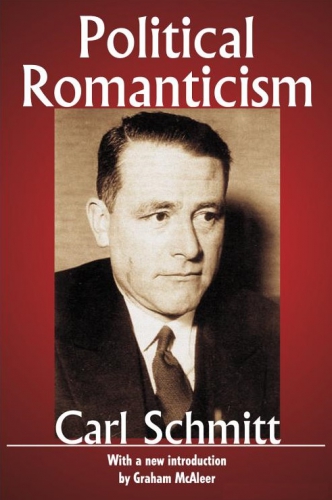 Analog können nach Schmitt auch Legalität[wp] und Legitimität[wp] auseinanderfallen. Dies diagnostizierte er etwa in der Endphase der Weimarer Republik. Ein nur noch funktionalistisches Legalitätsystem, so Schmitt 1932, drohe, sich gegen sich selbst zu wenden und damit die eigene Legalität und Legitimität letztlich selbst aufzuheben: Bei Richard Thoma[wp] "ist wenigstens noch das bürgerlich-rechtliche System selbst mit seinem Gesetzes- und Freiheitsbegriff heilig, die liberale Wertneutralität[wp] wird als ein Wert angesehen und der politische Feind - Faschismus und Bolschewismus[wp] - offen genannt. Anschütz[wp]dagegen geht die Wertneutralität eines nur noch funktionalistischen Legalitätssystems bis zur absoluten Neutralität gegen sich selbst und bietet den legalen Weg zur Beseitigung der Legalität selbst, sie geht also in ihrer Neutralität bis zum Selbstmord." [86] Diese Kritik an dem Wertrelativismus der herrschenden Lehre verdichtete Schmitt in einer berühmten Formulierung:
Analog können nach Schmitt auch Legalität[wp] und Legitimität[wp] auseinanderfallen. Dies diagnostizierte er etwa in der Endphase der Weimarer Republik. Ein nur noch funktionalistisches Legalitätsystem, so Schmitt 1932, drohe, sich gegen sich selbst zu wenden und damit die eigene Legalität und Legitimität letztlich selbst aufzuheben: Bei Richard Thoma[wp] "ist wenigstens noch das bürgerlich-rechtliche System selbst mit seinem Gesetzes- und Freiheitsbegriff heilig, die liberale Wertneutralität[wp] wird als ein Wert angesehen und der politische Feind - Faschismus und Bolschewismus[wp] - offen genannt. Anschütz[wp]dagegen geht die Wertneutralität eines nur noch funktionalistischen Legalitätssystems bis zur absoluten Neutralität gegen sich selbst und bietet den legalen Weg zur Beseitigung der Legalität selbst, sie geht also in ihrer Neutralität bis zum Selbstmord." [86] Diese Kritik an dem Wertrelativismus der herrschenden Lehre verdichtete Schmitt in einer berühmten Formulierung:
- "Eine Verfassung, die es nicht wagen würde, sich hier [also bei drohender Beseitigung des Legalitätssystems selbst] zu entscheiden, sondern statt einer substanzhaften Ordnung den kämpfenden Klassen, Richtungen und Zielsetzungen die Illusion geben wollte, daß sie legal auf ihre Rechnung kommen, alle ihre Parteiziele legal erreichen und alle ihren Gegner legal vernichten können, ist heute nicht einmal mehr als dilatorischer Formelkompromiß möglich und würde im praktischen Ergebnis auch ihre Legalität und Legitimität zerstören. Sie müßte in dem kritischen Augenblick, in dem eine Verfassung sich zu bewähren hat, notwendigerweise versagen."
Legal ist eine Handlung, wenn sie sich restlos einer allgemeinen Norm des positiven Rechts[wp]subsumieren lässt. Die Legitimität hingegen ist für Schmitt nicht unbedingt an diese Normen gebunden. Sie kann sich auch auf Prinzipien beziehen, die dem positiven Recht übergeordnet sind, etwa das "Lebensrecht des Staates" oder die Staatsräson. Die Diktatur beruft sich dementsprechend auf die Legitimität. Sie ist nicht an positive Normierungen gebunden, sondern nur an die Substanz der Verfassung, also ihre Grundentscheidung über Art und Form der politischen Existenz. Gemäß Schmitt muss sich die Diktatur selbst überflüssig machen, d. h. sie muss die Wirklichkeit so gestalten, dass der Rückgriff auf eine außerordentliche Gewalt überflüssig wird. Die Diktatur ist bei Vorliegen einer Verfassung notwendig kommissarisch, da sie keinen anderen Zweck verfolgen kann, als die Verfassung wieder in Gültigkeit zu bringen. Der Diktator ist somit eine konstituierte Gewalt (pouvoir constitué), die sich nicht über den Willen der konstituierenden Gewalt (pouvoir constituant) hinwegsetzen kann. In Abgrenzung davon gibt es laut Schmitt eine "souveräne Diktatur", bei der der Diktator erst eine Situation herstellt, die sich aus seiner Sicht zu bewahren lohnt. Hier hatte Schmitt vor allem den souveränen Fürsten[wp] vor Augen. Dies bedeutet in der Konsequenz, was Schmitt auch formulierte: Souveräne Diktatur und Verfassung schließen einander aus.
Krieg, Feindschaft, Völkerrecht
Homogenität, die nach Schmitt zum Wesenskern der Demokratie gehört, setzt auf einer höheren Ebene immer Heterogenität[wp] voraus. Einheit gibt es nur in Abgrenzung zu einer Vielheit. Jedes sich demokratisch organisierende Volk kann dies folglich nur im Gegensatz zu einem anderen Volk vollziehen. Es existiert für dieses Denken also immer ein "Pluriversum" verschiedener Völker und Staaten. Wie das staatliche Recht, so setzt für Schmitt auch das internationale Recht ("Völkerrecht"[wp]) eine konkrete Ordnung voraus.
Diese konkrete Ordnung war seit dem Westfälischen Frieden[wp] von 1648 die internationale Staatenordnung als Garant einer internationalen Rechtsordnung. Da Schmitt den Untergang dieser Staatenordnung konstatiert, stellt sich für ihn jedoch die Frage nach einem neuen konkreten Sein internationaler Rechtssubjekte, das eine "seinswirkliche" Grundlage für eine internationale Rechtsordnung garantieren könne.
Historisch wurde laut Schmitt eine solche Ordnung immer durch Kriege souveräner Staaten hergestellt, die ihre politische Idee als Ordnungsfaktor im Kampf gegen andere durchsetzen wollten. Erst wenn die Ordnungsansprüche an eine Grenze gestoßen sind, etabliere sich in einem Friedensschluss ein stabiles Pluriversum, also eine internationale Ordnung ("Sinn jedes nicht sinnlosen Krieges besteht darin, zu einem Friedensschluss zu führen"). Es muss erst eine als "normal" angesehene Teilung des Raumes gegeben sein, damit es zu einer wirksamen internationalen Rechtsordnung kommen kann.
Durch ihre politische Andersartigkeit sind die pluralen Gemeinwesen füreinander immer potentielle Feinde, solange keine globale Ordnung hergestellt ist. Schmitt hält jedoch entschieden an einem eingeschränkten Feindbegriff fest und lässt damit Platz für die Idee des Rechts. Denn nur mit einem Gegenüber, der als (potentieller) Gegner und nicht als absoluter Feind betrachtet wird, ist ein Friedensschluss möglich. Hier stellt Schmitt die Frage nach der "Hegung des Krieges". Das ethische Minimum der Rechtsidee ist für ihn dabei das Prinzip der Gegenseitigkeit. Dieses Element dürfe in einem Krieg niemals wegfallen, das heißt, es müssten auch dem Feind im Krieg immer dieselben Rechte zuerkannt werden, die man für sich selbst in Anspruch nimmt.
Schmitt unterscheidet dabei folgende Formen der Feindschaft[wp]: konventionelle Feindschaft, wirkliche Feindschaft und absolute Feindschaft. Zur absoluten Feindschaft komme es paradoxerweise etwa dann, wenn sich eine Partei den Kampf für den Humanismus auf ihre Fahne geschrieben habe. Denn wer zum Wohle oder gar zur Rettung der gesamten Menschheit kämpfe, müsse seinen Gegner als "Feind der gesamten Menschheit" betrachten und damit zum "Unmenschen" deklarieren. In Abwandlung Pierre-Joseph Proudhons[wp] Wort "Wer Gott sagt, will betrügen", heißt es bei Schmitt: "Wer Menschheit sagt, will betrügen".[87]
- "Die Führung des Namens 'Menschheit', die Berufung auf die Menschheit, die Beschlagnahme dieses Wortes, alles das könnte, weil man nun einmal solche erhabenen Namen nicht ohne gewisse Konsequenzen führen kann, nur den schrecklichen Anspruch manifestieren, daß dem Feind die Qualität des Menschen abgesprochen, daß er hors-la-loi [Außerhalb des Rechts] und hors L'humanité erklärt und dadurch der Krieg zur äußersten Unmenschlichkeit getrieben werden soll."[87]
Die Verallgemeinerung dieser These vollzog Schmitt 1960 in einem Privatdruck mit dem Titel Die Tyrannei der Werte. Hier lehnte er den gesamten Wertediskurs ab:
- "Wer Wert sagt, will geltend machen und durchsetzen. Tugenden[wp] übt man aus; Normen wendet man an; Befehle werden vollzogen; aber Werte werden gesetzt und durchgesetzt. Wer ihre Geltung behauptet, muss sie geltend machen. Wer sagt, dass sie gelten, ohne dass ein Mensch sie geltend macht, will betrügen."
Den konventionellen Krieg bezeichnete Schmitts als gehegten Krieg (ius in bello[wp]), an dem Staaten und ihre regulären Armeen beteiligt, sonst niemand. Auf diesem Prinzip basieren, so Schmitt, auch die nach dem Zweiten Weltkrieg abgeschlossenen vier Genfer Konventionen[wp], da sie eine souveräne Staatlichkeit zugrunde legen. Schmitt würdigte diese Konventionen als "Werk der Humanität", stellt aber zugleich fest, dass sie von einer Wirklichkeit ausgingen, die als solche nicht mehr existiere. Daher könnten sie ihre eigentliche Funktion, eine wirksame Hegung des Krieges zu ermöglichen, nicht mehr erfüllen. Denn mit dem Verschwinden des zugrundeliegenden Seins habe auch das Sollen keine Grundlage mehr.
Den Gedanken, dass Frieden nur durch Krieg möglich ist, da nur der echte Friedensschluss nach einem Krieg eine konkrete Ordnung herbeiführen kann, formulierte Schmitt zuerst im Zusammenhang der Auseinandersetzung mit dem Ausgang des Ersten Weltkrieges[wp]. Auf der Grundlage dieser Vorstellung proklamierte er die provozierende Alternative: "Frieden oder Pazifismus". Als Beispiel für einen Friedensschluss, der keine neue Ordnung im Sinne eines Friedensschlusses brachte, betrachtete Schmitt den Versailler Vertrag[wp] und die Gründung des Genfer Völkerbunds[wp] 1920. Der Völkerbund führte, aus Schmitts Perspektive, nur die Situation des Krieges fort. Er erschien ihm daher wie eine Fortsetzung dieses Krieges mit anderen Mitteln.[88] Dazu schrieb er während des Zweiten Weltkriegs 1940:
- "In Wahrheit hat die Genfer Kombination den Namen eines Bundes, einer Sozietät oder Liga im Sinne einer politischen Vereinigung nur insofern verdient, als sie den Versuch machte, die Weltkriegskoalition fortzusetzen und darin auch die im Weltkrieg neutralen Staaten einzubeziehen." [89]
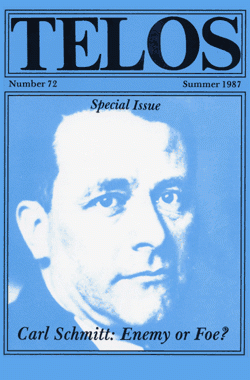 Konkret bezog sich Schmitt auf die Ruhrbesetzung[wp] durch französische und belgische Truppen im Januar 1923, mit der beide Länder auf einen Streit um die Höhe der deutschen Reparationen[wp]reagierten, um sich eine Schlüsselstellung in Bezug auf die noch unbesetzten Teile des Ruhrgebiets sowie die wichtigsten Handelszentren zu verschaffen. Begründet wurde diese Aktion mit der Sicherung der "Heiligkeit der Verträge". Dies geißelte Schmitt als ideologische Verschleierung handfester Interessenpolitik. Eine solche Juridifizierung der Politik, die nur die Machtansprüche der starken Staaten bemäntele, bezeichnete er als Hauptgefahr für den Frieden. Sie sei eine Art verdeckter Fortsetzung des Krieges, die durch den gewollten Mangel an Sichtbarkeit des Feindes zu einer Steigerung der Feindschaft im Sinne des absoluten Feindbegriffs und letztlich zu einem diskriminierenden Kriegsbegriff führe. Eine konkrete Ordnung werde durch einen solchen "unechten" Frieden nicht geschaffen. Statt einer Ordnung entstehe die Fassade einer Ordnung, hinter der die politischen Ziele changieren:
Konkret bezog sich Schmitt auf die Ruhrbesetzung[wp] durch französische und belgische Truppen im Januar 1923, mit der beide Länder auf einen Streit um die Höhe der deutschen Reparationen[wp]reagierten, um sich eine Schlüsselstellung in Bezug auf die noch unbesetzten Teile des Ruhrgebiets sowie die wichtigsten Handelszentren zu verschaffen. Begründet wurde diese Aktion mit der Sicherung der "Heiligkeit der Verträge". Dies geißelte Schmitt als ideologische Verschleierung handfester Interessenpolitik. Eine solche Juridifizierung der Politik, die nur die Machtansprüche der starken Staaten bemäntele, bezeichnete er als Hauptgefahr für den Frieden. Sie sei eine Art verdeckter Fortsetzung des Krieges, die durch den gewollten Mangel an Sichtbarkeit des Feindes zu einer Steigerung der Feindschaft im Sinne des absoluten Feindbegriffs und letztlich zu einem diskriminierenden Kriegsbegriff führe. Eine konkrete Ordnung werde durch einen solchen "unechten" Frieden nicht geschaffen. Statt einer Ordnung entstehe die Fassade einer Ordnung, hinter der die politischen Ziele changieren:
- "Im übrigen fehlt [dem Völkerbund] jeder konstruktive Gedanke, jede Gemeinschaftssubstanz, daher auch jede politische Folgerichtigkeit und jede Identität und Kontinuität im rechtlichen Sinne. Der politische Inhalt des Genfer Völkerbundes hat oft gewechselt, und die unter Beibehaltung derselben Etikette weitergeführte Genfer Veranstaltung hat sich [bis 1936] mindestens sechsmal in ein politisches und daher auch völkerrechtliches aliud[wp] verwandelt." [89]
Auflösung der internationalen Ordnung: Großraum, Pirat und Partisan
Schmitt diagnostiziert ein Ende der Staatlichkeit ("Die Epoche der Staatlichkeit geht zu Ende. Darüber ist kein Wort mehr zu verlieren"). Das Verschwinden der Ordnung souveräner Staatlichkeit sieht er in folgenden Faktoren: Erstens lösen sich die Staaten auf, es entstehen neuartige Subjekte internationalen Rechts; zweitens ist der Krieg ubiquitär - also allgegenwärtig und allverfügbar - geworden und hat damit seinen konventionellen und gehegten Charakter verloren.
Der Freibeuter - heute in seiner zeitgenössischen Variante als somalischer Pirat[wp] - ist in Schmitts Kategorien der Vorläufer des modernen Terroristen.
An die Stelle des Staates treten Schmitt zufolge mit der Monroe-Doktrin[wp] 1823 neuartige "Großräume" mit einem Interventionsverbot für raumfremde Mächte. Hier habe man es mit neuen Rechtssubjekten zu tun: Die USA[wp] zum Beispiel sind laut Schmitt seit der Monroe-Doktrin kein gewöhnlicher Staat mehr, sondern eine führende und tragende Macht, deren politische Idee in ihren Großraum, nämlich die westliche Hemisphäre ausstrahlt. Damit ergibt sich eine Einteilung der Erde in mehrere durch ihre geschichtliche, wirtschaftliche und kulturelle Substanz erfüllte Großräume. Den seit 1938 entwickelten Begriff des Großraums füllte Schmitt 1941 nationalsozialistisch; die politische Idee des deutschen Reiches sei die Idee der "Achtung jedes Volkes als einer durch Art und Ursprung, Blut und Boden[wp]bestimmte Lebenswirklichkeit". An die Stelle eines Pluriversums von Staaten tritt für Schmitt also ein Pluriversum von Großräumen.
Gleichzeitig geht den Staaten, so Schmitts Analyse, das Monopol der Kriegsführung (ius ad bellum[wp]) verloren. Es träten neue, nichtstaatliche Kombattanten hervor, die als kriegsführende Parteien aufträten. Im Zentrum dieser neuen Art von Kriegsführung sieht Schmitt Menschen, die sich total mit dem Ziel ihrer Gruppe identifizieren und daher keine einhegenden Grenzen für die Verwirklichung dieser Ziele kennen. Sie sind bereit Unbeteiligte, Unschuldige, ja sogar sich selbst zu opfern. Damit werde die Sphäre der Totalität[wp] betreten und damit auch der Boden der absoluten Feindschaft.
Nach Schmitt hat man es nunmehr mit dem Partisanen[wp] zu tun, der sich durch vier Merkmale auszeichnet: Irregularität, starkes politisches Engagement, Mobilität und "tellurischen Charakter" (Ortsgebundenheit). Der Partisan ist nicht mehr als regulärer Kombattant erkennbar, er trägt keine Uniform, er verwischt bewusst den Unterschied zwischen Kämpfern und Zivilisten, der für das Kriegsrecht konstitutiv ist. Durch sein starkes politisches Engagement unterscheidet sich der Partisan vom Piraten[wp].[90] Dem Partisan geht es in erster Linie darum, für politische Ziele zu kämpfen, mit denen er sich restlos identifiziert. Der lateinische Ursprung des Wortes Partisan sei, was oft vergessen werde, "Anhänger einer Partei".
Der Partisan ist durch seine Irregularität hochgradig mobil. Anders als stehende Heere kann er rasch und unerwartet zuschlagen und sich ebenso schnell zurückziehen. Er agiert nicht hierarchisch und zentral, sondern dezentral und in Netzwerken. Sein tellurischer Charakter zeigt sich nach Schmitt darin, dass der Partisan sich an einen konkreten Ort gebunden fühle, den er verteidige. Der verortete oder ortsgebundene Partisan führt primär einen Verteidigungskrieg[wp]. Dieses letzte Merkmal beginnt der Partisan, so Schmitt, aber zu verlieren. Der Partisan (oder, wie man heute sagen würde: der Terrorist) wird zu einem "Werkzeug einer mächtigen Weltpolitik treibenden Zentrale, die ihn im offenen oder im unsichtbaren Krieg einsetzt und nach Lage der Dinge wieder abschaltet".
Während der konventionelle Feind im Sinne des gehegten Krieges einen bestimmten Aspekt innerhalb eines von allen Seiten akzeptierten Rahmens in Frage stellt, stelle der wirkliche Feind den Rahmen als solchen in Frage. Der nicht mehr ortsgebundene Partisan verkörpert die Form der absoluten Feindschaft und markiert somit den Übergang zu einem totalen Krieg. Für Schmitt erfolgte der Übergang vom "autochthonen[wikt] zum weltaggressiven Partisan" historisch mit Lenin[wp]. Es geht, betont Schmitt, in den neuen Kriegen, die von der absoluten Feindschaft der Partisanen geprägt sind, nicht mehr darum, neue Gebiete zu erobern, sondern eine Existenzform wegen ihrer angeblichen Unwertigkeit zu vernichten. Aus einer kontingent definierten Feindschaft wird eine ontologisch[wp] oder intrinsisch[wp] bestimmte. Mit einem solchen Feind ist kein gehegter Krieg und auch kein Friedensschluss mehr möglich. Schmitt nennt das im Unterschied zum "paritätisch geführten Krieg" den "diskriminierend geführten Krieg". Sein diskriminierender Kriegsbegriff bricht mit der Reziprozität und beurteilt den Feind in Kategorien des Gerechten und Ungerechten. Wird der Feindbegriff in einem solchen Sinne total, wird die Sphäre des Politischen verlassen und die des Theologischen betreten, also die Sphäre der letzten, nicht mehr verhandelbaren Unterscheidung. Der Feindbegriff des Politischen ist nach Schmitt ein durch die Idee des Rechts begrenzter Begriff. Es ist demzufolge gerade die Abwesenheit einer ethischen[wp] Bestimmung des Kriegsziels, welche eine "Hegung des Krieges" erst ermöglicht, weil ethische Postulate, da sie grundsätzlich nicht verhandelbar sind, zur "theologischen Sphäre" gehören.
Der Nomos der Erde
Nach dem Wegfall der Ordnung des Westfälischen Friedens stellt sich für Schmitt die Frage nach einer neuen seinsmäßigen Ordnung, die das Fundament eines abstrakten Sollens werden kann. Für ihn ist dabei klar, dass es keine "One World Order" geben kann. Die Entstaatlichung der internationalen Ordnung dürfe nicht in einen Universalismus münden. Laut Schmitt ist allein eine Welt der Großräume mit Interventionsverbot für andere Großmächte in der Lage, die durch die Westfälische Ordnung garantierte Hegung des Krieges zu ersetzen.
Er konstruiert 1950 einen "Nomos[wp] der Erde", der - analog zur souveränen Entscheidung - erst die Bedingungen der Normalität schafft, die für die Verwirklichung des Rechts notwendig sind. Somit ist dieser räumlich verstandene Nomos der Erde für Schmitt die Grundlage für jede völkerrechtliche Legalität. Ein wirksames Völkerrecht wird nach seiner Auffassung immer durch eine solche konkrete Ordnung begründet, niemals durch bloße Verträge. Sobald auch nur ein Element der Gesamtordnung diese Ordnung in Frage stelle, sei die Ordnung als solche in Gefahr.
Der erste Nomos war für Schmitt lokal, er betraf nur den europäischen Kontinent. Nach der Entdeckung Amerikas sei der Nomos global geworden, da er sich nun auf die ganze Welt ausgedehnt habe. Für den neuen Nomos der Erde, der sich für Schmitt noch nicht herausgebildet hat, sieht die Schmittsche Theorie drei prinzipielle Möglichkeiten: a) eine alles beherrschende Macht unterwirft sich alle Mächte, b) der Nomos, in dem sich souveräne Staaten gegenseitig akzeptieren, wird wiederbelebt, c) der Raum wird zu einem neuartigen Pluriversum von Großmächten.
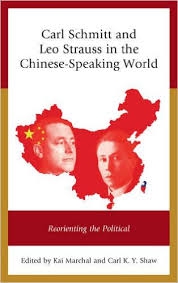 Die Verwirklichung der zweiten Variante hält Schmitt für unwahrscheinlich. Die erste Variante lehnt er entschieden ab ("Recht durch Frieden ist sinnvoll und anständig; Friede durch Recht ist imperialistischer[wp] Herrschaftsanspruch"). Es dürfe nicht sein, dass "egoistische Mächte", womit er vor allem die Vereinigten Staaten im Blick hat, die Welt unter ihre Machtinteressen stellen. Das Ius belli dürfe nicht zum Vorrecht einer einzigen Macht werden, sonst höre das Völkerrecht auf, paritätisch und universell zu sein. Somit bleibt gemäß Schmitt nur das Pluriversum einiger weniger Großräume. Voraussetzung dafür wäre in der Konsequenz des Schmittschen Denkens allerdings ein globaler Krieg, da nur eine kriegerische Auseinandersetzung geeignet ist, einen neuen Nomos der Erde zu begründen.
Die Verwirklichung der zweiten Variante hält Schmitt für unwahrscheinlich. Die erste Variante lehnt er entschieden ab ("Recht durch Frieden ist sinnvoll und anständig; Friede durch Recht ist imperialistischer[wp] Herrschaftsanspruch"). Es dürfe nicht sein, dass "egoistische Mächte", womit er vor allem die Vereinigten Staaten im Blick hat, die Welt unter ihre Machtinteressen stellen. Das Ius belli dürfe nicht zum Vorrecht einer einzigen Macht werden, sonst höre das Völkerrecht auf, paritätisch und universell zu sein. Somit bleibt gemäß Schmitt nur das Pluriversum einiger weniger Großräume. Voraussetzung dafür wäre in der Konsequenz des Schmittschen Denkens allerdings ein globaler Krieg, da nur eine kriegerische Auseinandersetzung geeignet ist, einen neuen Nomos der Erde zu begründen.
Rezeption
Nach 1945 war Schmitt wegen seines Engagements für den Nationalsozialismus[wp] akademisch und publizistisch isoliert. Er wurde neben Ernst Jünger[wp], Arnold Gehlen[wp], Hans Freyer[wp] und Martin Heidegger[wp] als intellektueller Wegbereiter und Stütze des NS-Regimes angesehen.
Dennoch hatte er zahlreiche Schüler, die das juristische Denken der frühen Bundesrepublik mitprägten. Dazu gehören Ernst Rudolf Huber[wp], Ernst Forsthoff[wp], Werner Weber[wp], Roman Schnur[wp], Hans Barion[wp] und Ernst Friesenhahn[wp], die alle außer Friesenhahn selbst durch längeres nationalsozialistisches Engagement belastet waren.[91] Diese Schüler widmeten dem Jubilar jeweils zum 70. und 80. Geburtstag eine Festschrift, um ihm öffentlich ihre Reverenz zu erweisen (Festschrift zum 70. Geburtstag für Carl Schmitt, 1959 und Epirrhosis. Festgabe für Carl Schmitt zum 80. Geburtstag, 1968). Weitere Schüler Schmitts waren etwa der als Kanzlerberater bekannt gewordene politische Publizist Rüdiger Altmann[wp] oder der einflussreiche Publizist Johannes Gross[wp]. Jüngere Verfassungsjuristen wie Ernst-Wolfgang Böckenförde[wp][92] oder Josef Isensee[wp][93] wurden nachhaltig von Carl Schmitt beeinflusst und lassen sich der von ihm begründeten Denktradition zuordnen, die gelegentlich auch als Schmitt-Schule[wp] bezeichnet wird.[94] Bekannt ist das an Schmitt angelehnte Diktum Böckenfördes[wp], dass der Staat von Voraussetzungen lebe, die er selbst nicht garantieren kann.[95] Verschiedene öffentliche Persönlichkeiten suchten in der Frühzeit der Bundesrepublik den Rat oder die juristische Expertise Schmitts, darunter etwa der SPIEGEL[wp]-Herausgeber Rudolf Augstein[wp] 1952.[96]
Schmitt wirkte aber auch in andere Disziplinen hinein. In der Geschichtswissenschaft[wp] waren vor allem Reinhart Koselleck[wp] (Kritik und Krise) und Christian Meier[wp] (Die Entstehung des Politischen bei den Griechen) von Schmitt beeinflusst, in der Soziologie[wp] Hanno Kesting[wp] (Geschichtsphilosophie und Weltbürgerkrieg); in der Philosophie rezipierten Odo Marquard[wp] (Individuum und Gewaltenteilung), Hermann Lübbe[wp] (Der Streit um Worte: Sprache und Politik) und Alexandre Kojève[wp] (Hegel, eine Vergegenwärtigung seines Denkens) schmittsche Theoreme. Auch Hans Blumenberg[wp] (Legitimität der Neuzeit) beschäftigte sich in seinem Werk an verschiedenen Stellen teils kritisch, teils anerkennend mit Schmitt.[97] In der Religionswissenschaft[wp] war es vor allem Jacob Taubes[wp] (Abendländische Eschatologie[wp]), der an Schmitts Politischer Theologie anknüpfte.[98]
Eine besonders diffizile Frage in der Wirkungsgeschichte Carl Schmitts ist dessen Rezeption in der intellektuellen und politischen Linken[wp]. Sie war Gegenstand scharfer Kontroversen.[99] Auf der einen Seite galt Schmitt als eine Art intellektueller Hauptgegner - Ernst Bloch[wp] bezeichnete ihn etwa als eine der "Huren des völlig mortal gewordenen, des nationalsozialistischen Absolutismus"[100] -, auf der anderen Seite gab es argumentative Übereinstimmungen, inhaltliche Anklänge und versteckte Bezugnahmen.
In einem breit diskutierten[101] Aufsatz über Schmitt und die Frankfurter Schule argumentierte Ellen Kennedy 1986, dass Jürgen Habermas[wp] in seiner Parlamentarismuskritik Schmittsche Argumentationsfiguren verwendet habe.[102] In Iring Fetschers[wp] Frankfurter Seminaren um 1968 spielte Schmitt - wie Eike Hennig[wp] berichtet - eine große Rolle.[103] Reinhard Mehring schrieb dazu 2006: "Ein Einfluss von Schmitt auf Habermas wurde wiederholt diskutiert. Er lag in der Frankfurter Luft. Schmitt war so etwas wie ein Hausjurist der Kritischen Theorie und Frankfurter Schule. Otto Kirchheimer und Franz Neumann, Ernst Fraenkel und Walter Benjamin hatten alle vor 1933 ihren Schmitt gelesen. Kirchheimer hatte bei Schmitt promoviert; er und Neumann trafen Schmitt in Berlin häufiger. Dessen politische Betrachtung des Rechts und der Volkssouveränität war ihnen für die Ausarbeitung einer sozialistischen Rechtstheorie interessant. Früh kritisierte Kirchheimer allerdings Schmitts Begriffsrealismus, worunter er eine geschichtsphilosophische Überspannung juristischer Kategorien verstand. Neumann adaptierte Schmitts rechtstheoretische Diagnose einer Auflösung des rechtsstaatlichen Gesetzesbegriffs dann auch für seine Beschreibung des nationalsozialistischen Behemoth. Seitdem gab es einen juristischen Links-Schmittismus, dem Habermas in Frankfurt begegnete."[104]
Der Politikwissenschaftler Wilhelm Hennis[wp] hatte in seiner Freiburger Antrittsrede im Juli 1968 mit dem an Schmitt anknüpfenden Titel Verfassung und Verfassungswirklichkeit das Verfassungsdenken der "Linken" - genauer: die Unterscheidung zwischen den formalen Organisationsformen und den materiellen Prinzipien der Grundrechte - als "reinen Carl Schmitt frankfurterisch" bezeichnet.[105] Schmitt, dem Hennis die Schrift zugesandt hatte, antwortete im Dezember 1968 mit einer lobenden Bemerkung in Richtung der Autoren der Frankfurter Schule:
- "Meine Schrift über Legalität und Legitimität sollte verhindern, dass sie [gemeint ist die Verfassung] ein Instrument des Bürgerkrieges würde; daher die wichtigste rechtswissenschaftliche Erkenntnis der ganzen Schrift: die Lehre von den 'politischen Prämien auf den legalen Machtbesitz', die in einer Zeit der großen Koalition[wp] [gemeint ist die Regierung Kurt Georg Kiesinger[wp] und Willy Brandt[wp]1966-1969[wp]] von selbst zu einer Praxis legaler Prämien auf dem politischen Machtbesitz werden. Das ist es, was die Frankfurter begreifen und was andere nicht begreifen wollen."[106]
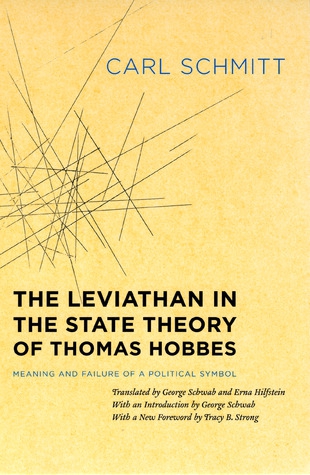 Neben Anknüpfungspunkten von Schmitt mit Protagonisten der Frankfurter Schule gab es Elemente einer "problematischen Solidarität" (Friedrich Balke) zwischen der politischen Philosophin Hannah Arendt[wp]und Carl Schmitt.[107] In ihrem Werk Elemente und Ursprünge totaler Herrschaft[wp] von 1951[108]postulierte Arendt, es habe eine relativ kleine Zahl "wirklicher Künstler und Gelehrter" gegeben, die sich "in Nazideutschland nicht nur gleichgeschaltet[wp] hatten, sondern überzeugte Nazis waren" [...]. "Zur Illustration sei an die Karriere Carl Schmitts erinnert, der zweifellos der bedeutendste Mann in Deutschland auf dem Gebiet des Verfassungs- und Völkerrechts war und sich die allergrößte Mühe gegeben hat, es den Nazis recht zu machen. Es ist ihm nie gelungen." Vielmehr sei er von den Nationalsozialisten "schleunigst durch zweit- und drittrangige Begabungen wie Theodor Maunz[wp], Werner Best[wp], Hans Frank[wp], Gottfried Neesse[wp] und Reinhold Hoehn [sic! recte: Reinhard Höhn[wp]] ersetzt und an die Wand gespielt [worden]." [109] Arendt verwendete einige Schmittsche Begriffe wie "politische Romantik" (nach der Ausgabe von 1925)[110] und bezieht sich in diesem Zusammenhang auf dessen Thesen über die Verbindung von Philistern und politischen Romantikern. Sogar seiner 1934 erschienenen nationalsozialistisch geprägten Schrift Staat, Bewegung, Volk entnahm sie Gedankengänge.[111] In ihre umfangreiche Bibliographie am Schluss des Werkes nahm sie neben diese beiden Bücher auch Schmitts Arbeiten Totaler Feind, totaler Krieg, totaler Staat (1937) und Völkerrechtliche Großraumordnung für raumfremde Mächte (1941) auf. Mit ihrem Konzept einer auf pluraler öffentlicher politischer Kommunikation beruhenden Rätedemokratie[wp] war Arendt jedoch im Grundsätzlichen weit von Schmitts Auffassungen entfernt.[112]
Neben Anknüpfungspunkten von Schmitt mit Protagonisten der Frankfurter Schule gab es Elemente einer "problematischen Solidarität" (Friedrich Balke) zwischen der politischen Philosophin Hannah Arendt[wp]und Carl Schmitt.[107] In ihrem Werk Elemente und Ursprünge totaler Herrschaft[wp] von 1951[108]postulierte Arendt, es habe eine relativ kleine Zahl "wirklicher Künstler und Gelehrter" gegeben, die sich "in Nazideutschland nicht nur gleichgeschaltet[wp] hatten, sondern überzeugte Nazis waren" [...]. "Zur Illustration sei an die Karriere Carl Schmitts erinnert, der zweifellos der bedeutendste Mann in Deutschland auf dem Gebiet des Verfassungs- und Völkerrechts war und sich die allergrößte Mühe gegeben hat, es den Nazis recht zu machen. Es ist ihm nie gelungen." Vielmehr sei er von den Nationalsozialisten "schleunigst durch zweit- und drittrangige Begabungen wie Theodor Maunz[wp], Werner Best[wp], Hans Frank[wp], Gottfried Neesse[wp] und Reinhold Hoehn [sic! recte: Reinhard Höhn[wp]] ersetzt und an die Wand gespielt [worden]." [109] Arendt verwendete einige Schmittsche Begriffe wie "politische Romantik" (nach der Ausgabe von 1925)[110] und bezieht sich in diesem Zusammenhang auf dessen Thesen über die Verbindung von Philistern und politischen Romantikern. Sogar seiner 1934 erschienenen nationalsozialistisch geprägten Schrift Staat, Bewegung, Volk entnahm sie Gedankengänge.[111] In ihre umfangreiche Bibliographie am Schluss des Werkes nahm sie neben diese beiden Bücher auch Schmitts Arbeiten Totaler Feind, totaler Krieg, totaler Staat (1937) und Völkerrechtliche Großraumordnung für raumfremde Mächte (1941) auf. Mit ihrem Konzept einer auf pluraler öffentlicher politischer Kommunikation beruhenden Rätedemokratie[wp] war Arendt jedoch im Grundsätzlichen weit von Schmitts Auffassungen entfernt.[112]
Ein Bindeglied zwischen Schmitt und der Frankfurter Schule war der Politologe Franz Neumann[wp], der als junger Jurist Schmitt rezipiert hatte.[113] Die auch bei Neumann anklingende Parlamentarismuskritik lässt sich von Neumann über Arendt bis zu Habermas verfolgen. Carl J. Friedrich[wp], der mit Arendt, Fraenkel und Neumann die Totalitarismustheorie begründete, war in jungen Jahren ebenfalls ein Bewunderer von Schmitt und besonders dessen Theorie der Diktatur[wp].[114] Auch im philosophischen Umfeld bestanden Kontakte zu sozialistischen Theoretikern. Neben Walter Benjamin[wp] ist hier vor allem der marxistische Philosoph Georg Lukács[wp] zu nennen, der Schmitts Politische Romantik rühmte, wofür dieser sich durch ein Zitat "des bekannten kommunistischen Theoretikers" im Begriff des Politischen von 1932 revanchierte. Benjamin hatte Schmitt am 9. Dezember 1930 einen Brief geschrieben, in dem er diesem sein Buch Ursprung des deutschen Trauerspiels übersandte.[115]
In der Bundesrepublik wurden die Verbindungen einiger Protagonisten der Studentenbewegung[wp], etwa Hans Magnus Enzensbergers[wp] - Hans Mathias Kepplinger[wp] nennt sie "rechte Leute von links" - zu Carl Schmitt diskutiert.[116] Der Politologe Wolfgang Kraushaar[wp] - ehemals selbst Teil der Studentenbewegung - vom Hamburger Institut für Sozialforschung[wp] vertrat die Auffassung, Hans-Jürgen Krahl[wp] müsse Carl Schmitts Theorie des Partisanen rezipiert haben, wie sich aus den Kriterien und Abgrenzungen zur Definition des Guerilleros ergebe, die dieser gemeinsam mit Rudi Dutschke[wp] 1967 auf einer berühmten SDS[wp]-Delegiertentagung entwickelt hatte (sog. Organisationsreferat). Diese Orientierung linker Theoretiker an der von Schmitt 1963 publizierten Partisanentheorie ist in der Tat nicht unwahrscheinlich, hatte doch z. B. der damalige Maoist[wp] Joachim Schickel in seinem 1970 edierten Buch Guerilleros, Partisanen - Theorie und Praxis ein "Gespräch über den Partisanen" mit Carl Schmitt veröffentlicht und diesen als "einzig erreichbaren Autor" bezeichnet, "der sich kompetent zum Thema geäußert hat".[117] In einem anderen Zusammenhang stellte Kraushaar die These auf, aus der Parlamentarismuskritik Johannes Agnolis[wp], einem der wesentlichen Impulsgeber der Studentenrevolte, sprächen Gedanken rechter Denker wie Carl Schmitt, Gaetano Mosca[wp] und Vilfredo Pareto[wp].[118]
Auch der linke Studentenführer Jens Litten, Mitglied des SHB[wp], führte im Jahre 1970 - zusammen mit Rüdiger Altmann[wp] - für den Norddeutschen Rundfunk[wp] ein Gespräch mit Schmitt, über das er in der protestantischen Wochenzeitung Deutsches Allgemeines Sonntagsblatt[wp] berichtete.[119] Wenn Schmitt von seinen Schülern spreche, so Litten, dann tauchten Namen auf, die "bei der Linken Autorität genießen". Für Schmitt sei dies selbstverständlich gewesen, denn: "links und rechts sind ihm Begriffe der politischen Vulgärsprache".[120]
Liegen Wurzeln der Parlamentarismuskritik einer APO-Bewegung bei Carl Schmitt?
Vor diesem Hintergrund wurde ein möglicher Einfluss Schmitts auf die 68er-Bewegung[wp] diskutiert, obwohl der Staatsrechtler bei linken Denkern gemeinhin als zentraler Antipode gesehen wird. Auch gibt es in den wenigsten Fällen direkte Bezugnahmen. Die Beeinflussung erfolgte in der Regel über linke Vordenker wie Fraenkel, Neumann oder Kirchheimer, die zeitweise stark von Schmitt beeinflusst waren. Der gemeinsame Anknüpfungspunkt war zumeist die Parlamentarismuskritik. Dieses Thema verband konservative Antiliberale mit einigen Theoretikern der sogenannten "Außerparlamentarischen Opposition"[wp] (APO). Der Politikwissenschaftler Heinrich Oberreuter[wp] betonte 2002: "Die radikale Systemkritik ging über die von Carl Schmitt und Jürgen Habermas begründeten Systemzweifel gegenüber einem Parlamentarismus, der seine geistigen Grundlagen und seine moralische Wahrheit verloren habe, hinaus."[121] Bereits 1983 hatte der Jurist Volker Neumann geschrieben: "Carl Schmitts Werk ist für die Linken attraktiv geblieben - bis heute. Das Interesse für ähnliche Problemlagen und eine vergleichbare Radikalität der Fragestellung lieferten das Material für eine liberale Kritik, die am Beispiel Schmitts und der Studentenbewegung die Übereinstimmung der Extreme konstatierte. Angesetzt hatte sie an der für das politische Selbstverständnis der Studentenbewegung wichtigen Parlamentarismuskritik Johannes Agnolis, die in die Kontinuität des von Schmitt geprägten Anti-Liberalismus und -Parlamentarismus gerückt wurde."[122] Leonard Landois behauptete in seinem 2008 erschienenen Buch Konterrevolution von links: Das Staats- und Gesellschaftsverständnis der '68er' und dessen Quellen bei Carl Schmitt, dass die Ursprünge des Staats- und Gesellschaftsverständnisses der Studentenbewegung bei Schmitt gesucht werden müssten.[123] Zwar konnte Landois tatsächlich verschiedene Parallelen zwischen Schmitt und den 68ern aufzeigen, er musste allerdings konzedieren, dass Vertreter der 68er mit Schmitt allenfalls indirekt Kontakt aufnahmen. Ebenso 2008 erschien Götz Alys[wp] sehr persönlich gefärbte Aufarbeitung der Studentenrevolte unter dem provokanten Titel Unser Kampf - 1968. Er argumentiert, die 68er hätten "im Geiste des Nazi-Juristen Carl Schmitt" den Pluralismus[wp] verachtet.[124]
 Ein Beispiel für einen direkten Schnittpunkt zwischen Schmitt und der 68er-Bewegung war eine Tagung des Sozialistischen Deutschen Studentenbundes[wp] (SDS) in Berlin. Der bekannte Hegel[wp]-Forscher Alexandre Kojève[wp], der sich selbst als "einzigen echten Sozialisten" bezeichnete, hatte im Rahmen der Veranstaltung mitgeteilt, sein nächstes Reiseziel sei Plettenberg: "Wohin soll man denn in Deutschland fahren? Carl Schmitt ist doch der Einzige, mit dem zu reden sich lohnt". Aus dem engsten Umfeld Schmitts wird berichtet, dieser sei der Studentenrevolte gegenüber durchaus aufgeschlossen gewesen. Schmitt habe gemerkt: da bricht etwas auf. Das habe ihm gefallen. In diesem Sinne suchte er auch die konstruktive Auseinandersetzung mit Veröffentlichungen der 68er-Bewegung. So soll er etwa Texte des linken Literaturwissenschaftler Helmut Lethen[wp] mit besonderem Interesse gelesen haben. Zudem habe er sich selbst nie als Konservativen betrachtet. Er habe eine Vorliebe für schillernde und extreme Figuren gleich welcher politischen Ausrichtung gehabt, solange sie ihm geistreich und unvoreingenommen erschienen.[125] Dazu gehörte etwa auch Günter Maschke[wp], der seine politische Sozialisierung beim SDS erlebte, dann politisches Asyl im Kuba[wp] Fidel Castros[wp] suchte und heute der Neuen Rechtenzugeordnet wird.
Ein Beispiel für einen direkten Schnittpunkt zwischen Schmitt und der 68er-Bewegung war eine Tagung des Sozialistischen Deutschen Studentenbundes[wp] (SDS) in Berlin. Der bekannte Hegel[wp]-Forscher Alexandre Kojève[wp], der sich selbst als "einzigen echten Sozialisten" bezeichnete, hatte im Rahmen der Veranstaltung mitgeteilt, sein nächstes Reiseziel sei Plettenberg: "Wohin soll man denn in Deutschland fahren? Carl Schmitt ist doch der Einzige, mit dem zu reden sich lohnt". Aus dem engsten Umfeld Schmitts wird berichtet, dieser sei der Studentenrevolte gegenüber durchaus aufgeschlossen gewesen. Schmitt habe gemerkt: da bricht etwas auf. Das habe ihm gefallen. In diesem Sinne suchte er auch die konstruktive Auseinandersetzung mit Veröffentlichungen der 68er-Bewegung. So soll er etwa Texte des linken Literaturwissenschaftler Helmut Lethen[wp] mit besonderem Interesse gelesen haben. Zudem habe er sich selbst nie als Konservativen betrachtet. Er habe eine Vorliebe für schillernde und extreme Figuren gleich welcher politischen Ausrichtung gehabt, solange sie ihm geistreich und unvoreingenommen erschienen.[125] Dazu gehörte etwa auch Günter Maschke[wp], der seine politische Sozialisierung beim SDS erlebte, dann politisches Asyl im Kuba[wp] Fidel Castros[wp] suchte und heute der Neuen Rechtenzugeordnet wird.
- Der Feind wird außerhalb des Rechts gesetzt - Carl Schmitt liefert Giorgio Agamben die Kategorien für eine fundamentale Guantánamo-Kritik.
Zuletzt gab es Kontroversen über das Werk des italienischen Philosophen Giorgio Agamben[wp], der sich neben dem Poststrukturalisten[wp] Michel Foucault[wp] und dem Vordenker der Kritischen Theorie[wp], Walter Benjamin[wp], in zentralen Elementen auf Carl Schmitt und dessen Theorie des Ausnahmezustands[wp] stützt. Agambens Guantánamo[wp]-Kritik, die Gefangenen würden als "irreguläre Kombattanten" "außerhalb der internationalen Ordnung der zivilisierten Welt gestellt" (hors la loi, wie Schmitt sagen würde), bedient sich Schmittscher Argumentationsmuster.
Teilweise ähnlich wie Schmitt argumentierte der US-amerikanische Politologe und Berater des US-Außenministeriums Samuel P. Huntington[wp] u. a. in seinem bekanntesten Werk Clash of Civilizations (1996). Auch die Globalisierungskritiker Michael Hardt[wp] und Antonio Negri[wp] haben für ihre Arbeit Empire - Die neue Weltordnung (Erstveröffentlichung 2004) von Schmittschen Analysewerkzeugen profitiert.
Ein marxistischer Autor, der eine vielfach bemängelte Nähe zu Carl Schmitt aufweist, ist der französische Philosoph und langjähriges Mitglied der KPF[wp] Étienne Balibar[wp]. Balibar hatte unter anderem den französischen Neudruck des Schmitt-Buches Der Leviathan[wp] in der Staatslehre des Thomas Hobbes - einer Publikation aus der NS-Zeit - mit einem Vorwort versehen.[126] Daraufhin wurde ihm vorgeworfen, Schmitt in gefährlicher Weise zu verharmlosen.[127]
Die Verwendung von Schmittschen Kategorien durch postmarxistische[wp] Theoretiker wie Michael Hardt, Antonio Negri, Giorgio Agamben, Chantal Mouffe[wp], Gopal Balakrishnan oder auch die Rezeption durch das Theorie-Organ "Telos"[wp] (eine zur Popularisierung der Ideen der Frankfurter Schule in den USA 1968 gegründete Zeitschrift) illustrieren die Anknüpfung an die frühe linke Rezeption Schmitts durch Benjamin, Fraenkel, Kirchheimer und Neumann. Vor allem die Interventionspolitik der Vereinigten Staaten (siehe etwa Irak-Krieg[wp]) oder die Rolle der Vereinten Nationen[wp] als eine Art "Weltregierung" werden häufig unter Rückgriff auf Schmittsche Theoreme abgelehnt. Teilweise wurden Schmitts Argumente gegen den Völkerbund auf US-amerikanische Politik übertragen und den Vereinigten Staaten eine ökonomische Interessenpolitik unter dem Schleier demokratischer Ziele zugeschrieben. Andererseits können sich die Befürworter von mit Natur[wp]- oder Menschenrechten begründeter Interventionen auf Schmitts Postulat der "absoluten Feindschaft" bzw. "Tyrannei der Werte" beziehen, die das Prinzip der Gegenseitigkeit im Völkerrecht aufhebe.
Auch die Theorien des Politikwissenschaftlers und Machiavelli[wp]-Experten Herfried Münkler[wp] zu "asymmetrischen Kriegen" und zum "Imperium" knüpfen an Thesen Carl Schmitts an. Der postmoderne Philosoph und Begründer des Dekonstruktivismus Jacques Derrida[wp] setzte sich in seinem Buch Politik der Freundschaft (2000) sehr ausführlich mit Schmitt auseinander und proklamierte bereits in einem Interview 1994 die Notwendigkeit einer neuen Rezeption: "Kurz gesagt, ich glaube, man muß Schmitt, wie Heidegger, neu lesen - und auch das, was sich zwischen ihnen abspielt. Wenn man die Wachsamkeit und den Wagemut dieses entschieden reaktionären Denkers ernst nimmt, gerade da, wo es auf Restauration aus ist, kann man seinen Einfluß auf die Linke ermessen, aber auch zugleich die verstörenden Affinitäten - zu Leo Strauss[wp], Benjamin und einigen anderen, die das selbst nicht ahnen."[128]
Das Projekt der Demaskierung bürgerlicher Strukturen als (ökonomische) Interessenpolitik durch Schmitt ist ein Punkt, den Linke wie Rechte aufgriffen. Auch Antiparlamentarismus, Antiliberalismus, Etatismus, Antiimperialismus und Antiamerikanismus[wp] stießen auf beiden Seiten des politischen Spektrums auf Interesse.
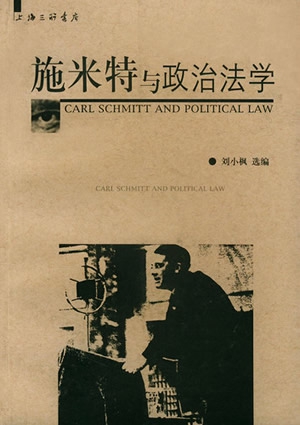 Für die politische Rechte sind darüber hinaus vor allem Ethnopluralismus[wp], Nationalismus, Kulturpessimismus[wp] und die Bewunderung für den italienischen Faschismus anschlussfähig. Hinzu kommt Schmitts Option für Ausnahmezustand und Diktatur zur Wahrung der politischen Ordnung, auch unter Verletzung des positiven Rechts[wp]. Daher stoßen Schmitts Werke auch heute noch auf ein reges Interesse in konservativen Kreisen (s. etwa die Rezeption durch die Frankfurter Allgemeine Zeitung[129]) und im Umfeld der sog. Neuen Rechten (s. vor allem Junge Freiheit, Etappe[wp], Staatsbriefe[wp] oder Criticón[wp], selbiges gilt für die Nouvelle Droite[wp] in Frankreich[130]). Führende Theoretiker der Neuen Rechten/Nouvelle Droite beschäftigen sich intensiv mit Carl Schmitt, allen voran Alain de Benoist[wp], Günter Maschke[wp] und Armin Mohler[wp] (der sich selbst als sein "Schüler" bezeichnete). Aufgrund der aktualisierenden Rezeption aus neurechtem und rechtsextremistischem Umfeld taucht Schmitt regelmäßig in Publikationen des Verfassungsschutzes[wp] als Ahnherr revisionistischer[wp] Bestrebungen auf. So vermerkte etwa der Verfassungsschutz Mecklenburg-Vorpommern im Jahre 2003, die Zeitschrift Nation und Europa[wp], das "bedeutendste rechtsextremistische Strategie- und Theorieorgan", habe in antiamerikanischer Absicht auf völkerrechtliche Theoreme Schmitts Bezug genommen: "Die Forderungen nach einem Ausschluss raumfremder Mächte aus Europa knüpfen an die Auffassungen des Staatsrechtlers Carl Schmitt an, welcher zu Zeiten des Dritten Reiches für die Vorherrschaft Deutschlands in einem von den USA nicht beeinflussten Europa eintrat. Eine Trennung von Amerika soll im revisionistischen Sinn mit einer politisch motivierten Korrektur von Geschichtsauffassungen verbunden sein."[131]
Für die politische Rechte sind darüber hinaus vor allem Ethnopluralismus[wp], Nationalismus, Kulturpessimismus[wp] und die Bewunderung für den italienischen Faschismus anschlussfähig. Hinzu kommt Schmitts Option für Ausnahmezustand und Diktatur zur Wahrung der politischen Ordnung, auch unter Verletzung des positiven Rechts[wp]. Daher stoßen Schmitts Werke auch heute noch auf ein reges Interesse in konservativen Kreisen (s. etwa die Rezeption durch die Frankfurter Allgemeine Zeitung[129]) und im Umfeld der sog. Neuen Rechten (s. vor allem Junge Freiheit, Etappe[wp], Staatsbriefe[wp] oder Criticón[wp], selbiges gilt für die Nouvelle Droite[wp] in Frankreich[130]). Führende Theoretiker der Neuen Rechten/Nouvelle Droite beschäftigen sich intensiv mit Carl Schmitt, allen voran Alain de Benoist[wp], Günter Maschke[wp] und Armin Mohler[wp] (der sich selbst als sein "Schüler" bezeichnete). Aufgrund der aktualisierenden Rezeption aus neurechtem und rechtsextremistischem Umfeld taucht Schmitt regelmäßig in Publikationen des Verfassungsschutzes[wp] als Ahnherr revisionistischer[wp] Bestrebungen auf. So vermerkte etwa der Verfassungsschutz Mecklenburg-Vorpommern im Jahre 2003, die Zeitschrift Nation und Europa[wp], das "bedeutendste rechtsextremistische Strategie- und Theorieorgan", habe in antiamerikanischer Absicht auf völkerrechtliche Theoreme Schmitts Bezug genommen: "Die Forderungen nach einem Ausschluss raumfremder Mächte aus Europa knüpfen an die Auffassungen des Staatsrechtlers Carl Schmitt an, welcher zu Zeiten des Dritten Reiches für die Vorherrschaft Deutschlands in einem von den USA nicht beeinflussten Europa eintrat. Eine Trennung von Amerika soll im revisionistischen Sinn mit einer politisch motivierten Korrektur von Geschichtsauffassungen verbunden sein."[131]
Weitere Anknüpfungspunkte gab es in - auch für Zeitgenossen - überraschenden Zusammenhängen. Beispielsweise berichtete der jüdische Religionsphilosoph Jacob Taubes[wp], der mit Schmitt in Kontakt stand, dass dessen Verfassungslehre in der Diskussion um eine mögliche israelische Verfassung herangezogen worden sei. Dies habe er als Research-Fellow 1949 zufällig durch eine erfolglose Bestellung des Buches in der Bibliothek der Jerusalemer Hebräischen Universität[wp] festgestellt: "Einen Tag, nachdem ich Carl Schmitts Verfassungslehre angefordert hatte, kam ein dringender Anruf vom Justizministerium, der Justizminister Pinchas Rosen[wp] (früher Rosenblüth) brauche Carl Schmitts Verfassungslehre zur Ausarbeitung einiger schwieriger Probleme in den Entwürfen zur Verfassung des Staates Israel".[132] Taubes, damals Professor an der FU Berlin[wp], war eine wichtige Bezugsfigur für die deutsche Studentenbewegung[wp]. Er hatte etwa ein Flugblatt der Kommunarden Rainer Langhans[wp]und Fritz Teufel[wp], das indirekt zu Brandanschlägen aufrief, in einem gerichtlichen Gutachten in die Tradition der "europäischen Avantgarde[wp]" gestellt und damit zu einem Freispruch beigetragen.[133] Die Anschlussfähigkeit Schmitts für Taubes illustriert die Inhomogenität der Rezeption.
Im Zusammenhang mit dem europäischen Integrationsprozess wurde die Frage erörtert, ob die Großraumtheorie Carl Schmitts oder seine "Verfassungslehre des Bundes" (1928) als Grundlage für das europäische Gemeinschaftskonzept bezeichnet werden kann. So wurde darauf hingewiesen, dass die von Schmitt angeführten Gründe für die Entstehung von Großräumen - grenzüberschreitende Anforderungen an Verkehr und Kommunikationstechnik, Berücksichtigung wirtschaftlicher Abhängigkeiten zwischen verschiedenen Volkswirtschaften - auch bei der Schaffung der Europäischen Gemeinschaften[wp] eine wichtige Rolle gespielt hätten. Auch sei Schmitts Beschreibung des Großraums als eine faktisch und rechtlich hinter dem Staat zurückbleibende völkerrechtliche Einheit für die Europäische Union[wp]zutreffend. Die These, die EU sei ein Großraum im Sinne Carl Schmitts, wurde aber auch zurückgewiesen. Europa sei, anders als bei Carl Schmitt, kein Raum, in dem sich Wirtschaft, Technik und Verwaltung einem supranationalen Primat unterzuordnen hätten; auch sei der Staat im Prozess der europäischen Integration keineswegs überflüssig, sondern geradezu entscheidende Integrationsvoraussetzung.[134] Dagegen äußerte der Europarechtler Hans-Peter Folz 2006 die Auffassung, dass die Europäische Gemeinschaft geradezu ein Modellfall von Schmitts "Verfassungslehre des Bundes" sei. Schmitt habe nämlich in seiner Verfassungslehre der traditionellen Unterscheidung von Bundesstaat und Staatenbund, die sich in der Analyse als unzureichend erwiesen habe, eine dritte Kategorie hinzugefügt: die nicht-konsolidierte Staatenverbindung. Mit dieser Kategorie sei es besser möglich, sich entwickelnde multistaatliche Gebilde wie die Europäische Union zu beschreiben. Als das Wesen des Bundes hatte Schmitt den unaufgelösten Konflikt zwischen dem Bund - als Zentrum einer auf Dauer angelegten Staatenverbindung - und den Gliedstaaten definiert. Der Bund lebt demnach von dem gleichberechtigten Nebeneinander zweier politischer Existenzen und der Unklarheit der Souveränitätsfrage. Die in einem Bund organisierten Einheiten können nach Schmitts Auffassung sogar auf miteinander unvereinbaren Prinzipien beruhen, solange es gelingt, existenzbedrohende Konflikte zu vermeiden. Diese Charakteristika ließen sich, so die These, auch bei der Europäischen Union beobachten. Dies zeige sich etwa an der unklaren Rechtsnatur der Europäischen Gemeinschaft und dem Fehlen einer abschließenden juristischen Definition des die Eigenständigkeit des Integrationsansatzes betonenden Begriffs der "Supranationalität"[wp]. Zwar hätten sich in der Rechtsprechung des Europäischen Gerichtshofs[wp] drei Wesensmerkmale der Supranationalität der Gemeinschaft herauskristallisiert - Supranationalität des Entscheidungsprozesses, Normative Supranationalität, Ausstattung der Gemeinschaft mit eigenen Rechtsetzungskompetenzen -, alle diese Merkmale seien aber umstritten geblieben. Daher seien Konfliktvermeidungsstrategien entwickelt worden, die trotz grundsätzlich unterschiedlicher Positionen das Bestehen der Gemeinschaft sichern sollten (z. B. Streit um Beschlussfassungsregeln im Ministerrat gem. Art. 148 EGV[wp], Luxemburger Kompromiss vom 29. Januar 1966, Grundrechtskonflikt zwischen EuGH und BverfG, Justizkonflikt um die Bananen-Marktordnung). Folz urteilt daher: "Zusammenfassend können wir feststellen, dass die Gemeinschaft in all ihren wesentlichen supranationalen Merkmalen von Konflikten zwischen der Gemeinschaft und ihren Mitgliedsstaaten geprägt worden ist. Das Modell des Bundes im Schmittschen Sinne ist deshalb auf die Gemeinschaft übertragbar und hervorragend geeignet, das Verhältnis zwischen der Gemeinschaft und ihren Mitgliedsstaaten zu beschreiben."[135]
Gegenwärtig erlebt Schmitts Werk in der politischen Wissenschaft und Publizistik eine Renaissance: Trotz seines Rufes als "Kronjurist des Dritten Reiches" und seines vielfach dokumentierten Antisemitismus wird es zunehmend international rezipiert, etwa wenn über seinen Einfluss auf die amerikanischen Neokonservativen diskutiert[136] oder der bewaffnete Terrorismus[wp] als "Partisanenstrategie" analysiert wird.[137] Heinrich Meier[wp] hebt den Umstand hervor, dass mit Leo Strauss[wp] - bei all dessen kritischer Auseinandersetzung mit Schmitts Begriff des Politischen[138] - eine führende Persönlichkeit der frühen Neokonservativen in den USA stark von dem umstrittenen Staatsrechtslehrer beeinflusst war.
Schriften (Auswahl)
- Über Schuld und Schuldarten. Eine terminologische Untersuchung. 1910.
- Gesetz und Urteil. Eine Untersuchung zum Problem der Rechtspraxis. 1912.
- Schattenrisse. (In Zusammenarbeit mit Dr. Fritz Eisler veröffentlicht unter dem gemeinsamen Pseudonym Johannes Mox Doctor Negelinus) 1913.
- Der Wert des Staates und die Bedeutung des Einzelnen. 1914.
- Theodor Däublers Nordlicht: Drei Studien über die Elemente, den Geist und die Aktualität des Werkes.1916.
- Die Buribunken. in: Summa 1/1917/18, 89 ff.
- Politische Romantik. 1919. (Digitalisat)
- Die Diktatur. Von den Anfängen des modernen Souveränitätsgedankens bis zum proletarischen Klassenkampf. 1921.
- Politische Theologie. Vier Kapitel zur Lehre von der Souveränität. 1922.
- Die geistesgeschichtliche Lage des heutigen Parlamentarismus. 1923.
- Römischer Katholizismus und politische Form. 1923.
- Die Rheinlande als Objekt internationaler Politik. 1925.
- Die Kernfrage des Völkerbundes. 1926.
- Der Begriff des Politischen. In: Archiv für Sozialwissenschaften und Sozialpolitik[wp]. Bd. 58 (1927), S. 1 bis 33.
- Volksentscheid und Volksbegehren. Ein Beitrag zur Auslegung der Weimarer Verfassung und zur Lehre von der unmittelbaren Demokratie. 1927.
- Verfassungslehre. 1928.
- Hugo Preuß. Sein Staatsbegriff und seine Stellung in der dt. Rechtslehre. 1930
- Der Völkerbund und das politische Problem der Friedenssicherung. 1930, 2. erw. Aufl., 1934.
- Der Hüter der Verfassung. 1931 (Erweiterung eines Aufsatzes von 1929).
- Der Begriff des Politischen. 1932 (Erweiterung des Aufsatzes von 1927).
- Legalität und Legitimität. 1932.
- Staat, Bewegung, Volk. Die Dreigliederung der politischen Einheit. 1933.
- Das Reichsstatthaltergesetz. 1933.
- Staatsgefüge und Zusammenbruch des Zweiten Reiches. Der Sieg des Bürgers über den Soldaten.1934.
- Über die drei Arten des rechtswissenschaftlichen Denkens. 1934.
- Der Leviathan in der Staatslehre des Thomas Hobbes. 1938.
- Die Wendung zum diskriminierenden Kriegsbegriff. 1938.
- Völkerrechtliche Großraumordnung und Interventionsverbot für raumfremde Mächte. Ein Beitrag zum Reichsbegriff im Völkerrecht. 1939.
- Positionen und Begriffe im Kampf mit Weimar - Genf - Versailles 1923-1939. 1940 (Aufsatzsammlung).
- Land und Meer. Eine weltgeschichtliche Betrachtung. 1942.
- Der Nomos der Erde im Völkerrecht des Jus Publicum Europaeum. 1950.
- Donoso Cortes in gesamteuropäischer Interpretation. 1950.
- Ex captivitate salus. Erinnerungen der Zeit 1945/47. 1950.
- Die Lage der europäischen Rechtswissenschaft. 1950.
- Gespräch über die Macht und den Zugang zum Machthaber. 1954.
- Hamlet oder Hekuba. Der Einbruch der Zeit in das Spiel. 1956.
- Verfassungsrechtliche Aufsätze aus den Jahren 1924-1954. 1958 (Aufsatzsammlung).
- Theorie des Partisanen. Zwischenbemerkung zum Begriff des Politischen.[wp] 1963.
- Politische Theologie II. Die Legende von der Erledigung jeder Politischen Theologie. 1970.
- Glossarium. Aufzeichnungen der Jahre 1947-1951. Postum herausgegeben von Eberhard Freiherr von Medem, 1991.
- Das internationalrechtliche Verbrechen des Angriffskrieges. Postum herausgegeben von Helmut Quaritsch[wp], 1993.
- Staat - Großraum - Nomos. Postum herausgegeben von Günter Maschke, 1995.
- Frieden oder Pazifismus? Postum herausgegeben von Günter Maschke, 2005.
Zitate
- "Es scheint also das Schicksal der Demokratie zu sein, sich im Problem der Willensbildung selbst aufzuheben. Für den radikalen Demokraten hat die Demokratie als solche einen eigenen Wert, ohne Rücksicht auf den Inhalt der Politik, die man mit Hilfe der Demokratie macht. Besteht aber Gefahr, daß die Demokratie benutzt wird, um die Demokratie zu beseitigen, so muß der radikale Demokrat sich entschließen, auch gegen die Mehrheit Demokrat zu bleiben oder aber sich selbst aufzugeben."[139]
- "In manchen Staaten hat es der Parlamentarismus schon dahin gebracht, daß sich alle öffentlichen Angelegenheiten in Beute- und Kompromißobjekte von Parteien und Gefolgschaften verwandeln und die Politik, weit davon entfernt, die Angelegenheit einer Elite zu sein, zu dem ziemlich verachteten Geschäft einer ziemlich verachteten Klasse von Menschen geworden ist." [140][141]
- "Die Parteien treten heute nicht mehr als diskutierende Meinungen, sondern als soziale oder wirtschaftliche Machtgruppen einander gegenüber, berechnen die beiderseitigen Interessen und Machtmöglichkeiten und schließen auf dieser taktischen Grundlage Kompromisse und Koalitionen. Die Massen werden durch einen Propaganda-Apparat gewonnen, dessen größte Wirkungen auf einem Appell an nächstliegende Interessen und Leidenschaften beruhen. Das Argument im eigentlichen Sinne, das für die echte Diskussion charakteristisch ist, verschwindet." [142][141]
- "Die spezifisch politische Unterscheidung, auf welche sich die politischen Handlungen und Motive zurückführen lassen, ist die Unterscheidung von Freund und Feind." [143][141]
- "Dadurch, daß ein Volk nicht mehr die Kraft oder den Willen hat, sich in der Sphäre des Politischen zu halten, verschwindet das Politische nicht aus der Welt. Es verschwindet nur ein schwaches Volk." [144][141]
Literatur
Übersicht Primär- und Sekundärliteratur:
- Alain de Benoist[wp]: Carl Schmitt. Bibliographie seiner Schriften und Korrespondenzen. Akademie Verlag, Berlin 2003. ISBN 3-05-003839-X
- Alain de Benoist: Carl Schmitt. Internationale Bibliographie der Primär- und Sekundärliteratur. Ares-Verlag, Graz 2010. ISBN 978-3-902475-66-4
Leben
- Monographien
- Joseph W. Bendersky: Carl Schmitt, Theorist for the Reich. Princeton University Press, Princeton 1983, ISBN 0-691-05380-4
- Paul Noack[wp]: Carl Schmitt. Eine Biographie. Propyläen Verlag, Berlin 1993, ISBN 3-549-05260-X
- Christian Linder[wp]: Der Bahnhof von Finnentrop. Eine Reise ins Carl-Schmitt-Land. Matthes & Seitz, Berlin 2008, ISBN 978-3-88221-704-9
- Reinhard Mehring: Carl Schmitt - Aufstieg und Fall. Eine Biographie. Verlag C.H. Beck, München 2009, ISBN 978-3-406-59224-9
- Aufsätze
- Hans-Christof Kraus: Carl Schmitt (1988-1985). In: Michael Fröhlich (Hrsg.): Die Weimarer Republik. Porträt einer Epoche in Biographien. Darmstadt 2002, ISBN 3-89678-441-2, S. 326-337
- Henning Ottmann[wp]: Carl Schmitt - Leben und Werke. In: Karl Graf Ballestrem, Henning Ottmann (Hrsg.): Politische Philosophie des 20. Jahrhunderts. München 1990, ISBN 3-486-55141-8, S. 61-87
- Tagebücher
- Ernst Hüsmert (Hrsg.): Carl Schmitt. Tagebücher vom Oktober 1912 bis Februar 1915. 2., korr. Aufl., Akademie Verlag, Berlin 2005, ISBN 3-05-004093-9
- Ernst Hüsmert, Gerd Giesler (Hrsg.): Carl Schmitt. Die Militärzeit 1915 bis 1919, Akademie Verlag, Berlin 2005, ISBN 3-05-004079-3
- Wolfgang Schuller[wp], Gerd Giessler (Hrsg.): Carl Schmitt. Tagebücher 1930 bis 1934. Akademie Verlag, Berlin 2010, ISBN 978-3-05-003842-1
- Briefwechsel
- Rolf Rieß (Hrsg.): Carl Schmitt - Ludwig Feuchtwanger[wp]. Briefwechsel 1918-1935. Mit einem Vorwort von Edgar Feuchtwanger[wp]. Duncker & Humblot, Berlin 2007, ISBN 3-428-12448-0.
- Reinhard Mußgnug[wp], Dorothee Mußgnug, Angela Reinthal (Hrsg.): Briefwechsel Ernst Forsthoff[wp]- Carl Schmitt (1926-1974). Akademie Verlag, Berlin 2007, ISBN 3-05-003535-8. (eingeschränkte Vorschau).
- Alexander Schmitz, Marcel Lepper (Hrsg.): Hans Blumenberg, Carl Schmitt: Briefwechsel 1971-1978. Und weitere Materialien. Suhrkamp, Frankfurt am Main 2007, ISBN 978-3-518-58482-8.
- Reinhard Mehring (Hrsg.): "Auf der gefahrenvollen Straße des öffentlichen Rechts". Briefwechsel Carl Schmitt - Rudolf Smend[wp] (1921-1961). Mit ergänzenden Materialien. Duncker & Humblot, Berlin 2010, ISBN 3-428-13394-3.
- Helmuth Kiesel[wp] (Hrsg.): Ernst Jünger[wp] - Carl Schmitt: Briefe 1930 -1983. Verlag Klett-Cotta, Stuttgart 2012, ISBN 978-3-608-93940-8.
- Gespräche
- Frank Hertweck und Dimitrios Kisoudis (Hrsg.): Solange das Imperium hält. Carl Schmitt im Gespräch mit Klaus Figge und Dieter Groh[wp], Duncker & Humblot, Berlin 2010 ISBN 978-3-428-13452-6
Allgemeine Literatur zu Leben und Werk
- Norbert Campagna: Carl Schmitt. Eine Einführung. Berlin 2004, ISBN 3-937262-00-8.
- Gopal Balakrishnan: The Enemy. An Intellectual Portrait of Carl Schmitt. New York 2002, ISBN 1-85984-359-X.
- Hugo Eduardo Herrera: Carl Schmitt als politischer Philosoph. Versuch einer Bestimmung seiner Stellung bezüglich der Tradition der praktischen Philosophie. Duncker & Humblot, Berlin 2010, ISBN 978-3-428-83399-3.
- Hasso Hofmann[wp]: Legitimität gegen Legalität. Der Weg der politischen Philosophie Carl Schmitts. 4. Auflage. Duncker & Humblot, Berlin 2002, ISBN 3-428-10386-6.
- Reinhard Mehring: Carl Schmitt zur Einführung. 4. vollst. überarb. Neufassung. Junius, Hamburg 2011, ISBN 978-3-88506-685-9.
- Helmut Quaritsch[wp]: Positionen und Begriffe Carl Schmitts. Berlin 1995, ISBN 3-428-08257-5.
- Helmut Quaritsch (Hrsg.): Complexio Oppositorum. Über Carl Schmitt. Berlin 1988, ISBN 3-428-06378-3.
- Reinhard Mehring: Wie fängt man ein Chamäleon? Probleme und Wege einer Carl Schmitt-Biographie. In: Zeitschrift für Ideengeschichte. III/2 (2009), S. 71-86.
- Reinhard Mehring: Carl Schmitt im Archiv. In Annette Brockmöller[wp], Eric Hilgendorf (Hrsg.): Rechtsphilosophie im 20. Jahrhundert - 100 Jahre Archiv für Rechts- und Sozialphilosophie. Reihe Archiv für Rechts- und Sozialphilosophie, Beiheft 116, S. 51-67.
- Reinhard Mehring: Ausgerechnet ich! Souverän ist, wer der Nachwelt die Auswahl des Lesenswerten überläßt. Warum es keine Carl-Schmitt-Gesamtausgabe gibt. In: FAZ. 10. Juli 2006.
Einzelne Aspekte
Politische Theorie
- Reinhard Mehring (Hrsg.): Carl Schmitt - Der Begriff des Politischen. Ein kooperativer Kommentar. Berlin 2003, ISBN 3-05-003687-7.
- David Dyzenhaus: Law As Politics. Carl Schmitt's Critique of Liberalism. Durham & London 1998, ISBN 0-8223-2244-7.
- Heinrich Meier[wp]: Die Lehre Carl Schmitts. Vier Kapitel zur Unterscheidung Politischer Theologie und Politischer Philosophie. Stuttgart/Weimar 2004, ISBN 3-476-02052-5.
- Hartmuth Becker: Die Parlamentarismuskritik bei Carl Schmitt und Jürgen Habermas[wp]. Berlin 2003, ISBN 3-428-11054-4.
Weimarer Republik
- David Dyzenhaus: Legality and Legitimacy. Carl Schmitt, Hans Kelsen and Hermann Heller in Weimar. Oxford 2000, ISBN 0-19-829846-3
- Ellen Kennedy: Constitutional Failure. Carl Schmitt in Weimar. Durham 2004, ISBN 0-8223-3243-4
- Lutz Berthold: Carl Schmitt und der Staatsnotstandsplan am Ende der Weimarer Republik. Berlin 1999, ISBN 3-428-09988-5
- Gabriel Seiberth: Anwalt des Reiches. Carl Schmitt und der Prozess "Preußen contra Reich" vor dem Staatsgerichtshof. Berlin 2001, ISBN 3-428-10444-7
- Stefan Breuer: Carl Schmitt im Kontext. Intellektuellenpolitik in der Weimarer Republik. Berlin 2012, ISBN 978-3-05-005943-3
Drittes Reich
- Joseph W. Bendersky: Carl Schmitt. Theorist for the Reich. Princeton NJ 1983, ISBN 0-691-05380-4
- Andreas Koenen: Der Fall Carl Schmitt. Darmstadt 1995, ISBN 3-534-12302-6
- Dirk Blasius: Carl Schmitt. Preußischer Staatsrat in Hitlers Reich. Göttingen 2001, ISBN 3-525-36248-X
- Bernd Rüthers[wp]: Entartetes Recht. Rechtslehren und Kronjuristen im Dritten Reich. München 1988, ISBN 3-406-32999-3
- Bernd Rüthers: Carl Schmitt im Dritten Reich - Wissenschaft als Zeitgeist-Verstärkung?. 2. Auflage. München 1990, ISBN 3-406-34701-0
- Felix Blindow: Carl Schmitts Reichsordnung. Berlin 1999, ISBN 3-05-003405-X
- Helmut Quaritsch: Carl Schmitt. Antworten in Nürnberg. Berlin 2000, ISBN 3-428-10075-1
- Raphael Gross[wp]: Carl Schmitt und die Juden. Frankfurt 2000, ISBN 3-518-29354-0
- Karl Graf Ballestrem[wp]: Carl Schmitt und der Nationalsozialismus. Ein Problem der Theorie oder des Charakters? In: O. W. Gabriel u. a. (Hrsg.): Der demokratische Verfassungsstaat. Theorie, Geschichte, Probleme, Festschrift für Hans Buchheim zum 70. Geburtstag. Oldenbourg 1992, ISBN 3-486-55934-6, S. 115-132
Bundesrepublik
- Jürgen Habermas[wp]: Carl Schmitt in der politischen Geistesgeschichte der Bundesrepublik. In dsb., Die Normalität einer Berliner Republik. Frankfurt 1995, ISBN 3-518-11967-2, S. 112-122
- Dirk van Laak: Gespräche in der Sicherheit des Schweigens. Carl Schmitt in der politischen Geistesgeschichte der frühen Bundesrepublik. Berlin 1993, ISBN 3-05-003744-X
- Jan-Werner Müller: Ein gefährlicher Geist. Carl Schmitts Wirkung in Europa. WBG, Darmstadt 2007 ISBN 3-534-19716-X. Neuaufl. um ein Register ergänzt ebd. 2011 (Aus dem Englischen v. Nikolaus de Palézieux: A Dangerous Mind. Carl Schmitt in Post-War European Thought. Yale University Press[wp], New Haven 2003, ISBN 0-300-09932-0)
Einzelnachweise
- ↑ Christian Barzik: Carl Schmitt über den Parlamentarismus, die Bühne im Kampf der Meinungen, Blaue Narzisse am 6. April 2009
- ↑ Bernd Rüthers: Besprechung von Carl Schmitt - Die Militärzeit. In: Zeitschrift der Savigny-Stiftung für Rechtsgeschichte[wp]. Band 124, 2007, S. 729 (Internet). S. auch die Geburtsurkunde auf carl-schmitt.de
- ↑ Herfried Münkler: Erkenntnis wächst an den Rändern (Der Denker Carl Schmitt beschäftigt auch 20 Jahre nach seinem Tod Rechte wie Linke), Die Welt am 7. April 2005
- ↑ Zum Beispiel bezüglich des "konstruktiven Misstrauensvotums[wp]". Lutz Berthold: Das konstruktive Misstrauensvotum und seine Ursprünge in der Weimarer Staatsrechtslehre, in: Der Staat[wp], Bd. 36 (1997), S. 81-94, oder eines änderungsfesten Verfassungskerns[wp], s. Reinhard Mußgnug, Carl Schmitts verfassungsrechtliches Werk und sein Fortwirken im Staatsrecht der Bundesrepublik Deutschland, in: Helmut Quaritsch (Hg.), Complexio Oppositorum. Über Carl Schmitt, 1988, S. 517 ff.; Hans J. Lietzmann, Carl Schmitt und die Verfassungsgründung in der Bundesrepublik Deutschland, in: Klaus Hansen/Hans J. Lietzmann (Hg.), Carl Schmitt und die Liberalismuskritik, 1988, S. 107-118
- ↑ Helmut Rumpf, Carl Schmitt und Thomas Hobbes - Ideale Beziehungen und aktuelle Bedeutung, 1972
- ↑ Hugo Eduardo Herrera, Carl Schmitt als politischer Philosoph. Versuch einer Bestimmung seiner Stellung bezüglich der Tradition der praktischen Philosophie, 2010
- ↑ Armin Steil, Die imaginäre Revolte. Untersuchungen zur faschistischen Ideologie und ihrer theoretischen Vorbereitung bei Georges Sorel, Carl Schmitt und Ernst Jünger, 1984;
- ↑ S. Piet Tommissen[wp]: Gehlen - Pareto - Schmitt, in: Helmut Klages und Helmut Quaritsch (Hrsg.): Zur geisteswissenschaftlichen Bedeutung Arnold Gehlens, 1994, S. 171-197
- ↑ Christian Linder: Freund oder Feind, Lettre International, Heft 68, 2005, S. 86
- ↑ Carl Schmitt, Begriff des Politischen, 1987, S. 13 (Vorwort)
- ↑ Christian Linder: Freund oder Feind, Lettre International, Heft 68, 2005, S. 83
- ↑ "Starker Staat und gesunde Wirtschaft. Ein Vortrag vor Wirtschaftsführern", 1932, in: Carl Schmitt, Staat, Großraum, Nomos, 1995, S. 71 ff., hier S. 81
- ↑ Rüstow hatte gesagt: "Der neue Liberalismus jedenfalls, der heute vertretbar ist und den ich mit meinen Freunden vertrete, fordert einen starken Staat, einen Staat oberhalb der Wirtschaft, oberhalb der Interessenten, da, wo er hingehört." zit. nach: Alexander Rüstow, Freie Wirtschaft, Starker Staat, Vortrag auf der Jahrestagung des Vereins für Socialpolitik, September 1932, in: Franz Bosse (Hg.), Deutschland und die Weltkrise, Schriften des Vereins für Socialpolitik 187, München 1932, S. 62-69, s. auch Michael von Prollius, Menschenfreundlicher Neoliberalismus, FAZ, 10. November 2007, S. 13
- ↑ Ralf Ptak, Vom Ordoliberalismus zur sozialen Marktwirtschaft, Stationen des Neoliberalismus in Deutschland, 2004, S. 36f
- ↑ S. etwa Kelsen, Schmitt und "der Hüter der Verfassung": Weimar, 1931 (Tagungsbericht); Hans C. Mayer, Wer soll Hüter der europäischen Verfassung sein? In: Archiv des öffentlichen Rechts (AöR[wp]) 129 (2004), Heft 3, S. 411-435 (Internet); Dan Diner/Michael Stolleis (Hg.), Hans Kelsen and Carl Schmitt: a Juxtaposition, Gerlingen 1999; Volker Neumann, Theologie als staatsrechtswissenschaftliches Argument: Hans Kelsen und Carl Schmitt, in: Der Staat 47 (2008), S. 163-186
- ↑ Carl Schmitt, Politische Theologie, 6. Aufl. 1993, S. 67
- ↑ Schmitt, Politische Theologie, 1. Aufl., S. 54. Zur Exegese Eduard Schweizer: Das Evangelium nach Matthäus, Ausgabe 16, 1986, S. 331ff
- ↑ Politische Theologie, 6. Aufl., S. 67
- ↑ Paul Noack, Carl Schmitt, 1993, S. 81. Schmitts Auseinandersetzung mit dem italienischen Faschismus begann 1923 in seiner Schrift über "Die geistesgeschichtliche Lage des heutigen Parlamentarismus". 1929 konkretisierte er seine Überlegungen in einer ausführlichen Rezension von Erwin von Beckeraths "Wesen und Werden des faschistischen Staates" (zitiert nach Positionen und Begriffe, S. 124 ff.). Noack urteilt über Schmitts Verhältnis zu Mussolini: "Schmitt hat sich zwar oft auf italienische Staatstheoretiker von Machiavelli über Mosca bis zu Pareto bezogen, die soziale und politische Wirklichkeit des faschistischen Staates aber ist ihm fremd geblieben." (Noack, S. 83). Wolfgang Schieder[wp] urteilte: "Carl Schmitt hat sich [...] mit dem italienischen Faschismus nie wirklich beschäftigt." (Wolfgang Schieder: Carl Schmitt und Italien, in: Vierteljahrshefte für Zeitgeschichte, Jg. 37, 1989, S. 1 ff., hier S. 14). 1936 wurde Schmitt als Teil einer Delegation für eine halbstündige Audienz bei Mussolini empfangen. Ein persönliches Gespräch kam aber nicht zustande. S. Wolfgang Schieder, Eine halbe Stunde bei dem Diktator - Zunächst bestritt Carl Schmitt, 1936 in Rom gewesen zu sein, dann erzählte er von Mussolini, FAZ, Natur und Wissenschaft, 3. Januar 2007
- ↑ (Wesen und Werden des faschistischen Staates, in: Positionen und Begriffe, S. 126)
- ↑ S. etwa Otto Kirchheimer/Nathan Leites, Bemerkungen zu Carl Schmitts 'Legalität und Legitimität', in: Arch. für Sozialwiss. und Sozialpol. 68/1933, 457 ff.; Zu Kirchheimer und Schmitt s. Volker Neumann, Verfassungstheorie politischer Antipoden: Otto Kirchheimer und Carl Schmitt. In: Kritische Justiz 14/1981, 31 ff; Riccardo Bavaj, Otto Kirchheimers Parlamentarismuskritik in der Weimarer Republik. Ein Fall von "Linksschmittianismus", Vierteljahrshefte für Zeitgeschichte, LV, 1, Januar 2007, Seiten 33-51; Reinhard Mehring: "ein typischer Fall jugendlicher Produktivität". Otto Kirchheimers Bonner Promotionsakte, in: Forum Historie Juris, 2010; Zu Fraenkel und Schmitt s. Michael Wildt, Ernst Fraenkel und Carl Schmitt: Eine ungleiche Beziehung, in: Daniela Münkel/Jutta Schwarzkopf (Hg.), Geschichte als Experiment. Festschrift für Adelheid von Saldern, 2004 (PDF); Zu Neumann und Schmitt s. Volker Neumann, Kompromiß oder Entscheidung? Zur Rezeption der Theorie Carl Schmitts in den Weimarer Arbeiten von Franz Neumann, in: Joachim Perels (Hrsg.), Recht, Demokratie und Kapitalismus, 1984, S. 65 ff.; Alfons Söllner, Linke Schüler der Konservativen Revolution? Zur politischen Theorie von Neumann, Kirchheimer und Marcuse am Ende der Weimarer Republik, in: Leviathan, 1983, 2. Jg., S. 214ff.; Volker Neumann, Entzauberung des Rechts? Franz Neumann und Carl Schmitt, in: Samuel Salzborn[wp] (Hrsg.), Kritische Theorie des Staates, Staat und Recht bei Franz Neumann, 2009, S. 79-107
- ↑ Otto Kirchheimer, Legalität und Legitimität, in: Die Gesellschaft, Band 2, Heft 7, 1932, abgedruckt in: Otto Kirchheimer, Politische Herrschaft - Fünf Beiträge zur Lehre vom Staat, 4. Aufl. 1981, S. 1 ff. Zur Bezugnahme Schmitts auf diese Arbeit Kirchheimers s. Carl Schmitt, Legalität und Legitimität, 1932, 5. Aufl. 1993, S. 14
- ↑ S. die Tagebucheintragungen Carl Schmitts von 7.5., 23.7. und 4. August 1931, zitiert nach Seiberth, Anwalt des Reiches, 2001, S. 86 FN 40
- ↑ Ernst Fraenkel, Verfassungsreform und Sozialdemokratie, Die Gesellschaft, IX, 1932, S. 297 ff
- ↑ Lutz Berthold, Carl Schmitt und der Staatsnotstandsplan am Ende der Weimarer Republik, 1999. Siehe auch die Rezension des Buches von Michael Stolleis[wp], in: Historische Zeitschrift, Sonderheft 19, 2000, S. 70 f. Hier heißt es: "Schmitt [ging] tatsächlich bis Ende Januar 1933 davon aus, durch eine begrenzte und kontrollierte Überschreitung des Verfassungstextes die Verfassung retten zu können. Diesen Eindruck gewinnt man auch aus den Tagebuchnotizen Schmitts. Seine Entscheidung, für den Nationalsozialismus zu optieren, fiel erst mit dem Ermächtigungsgesetz vom 24. März 1933."
- ↑ Wolfram Pyta, Verfassungsumbau, Staatsnotstand und Querfront: Schleichers Versuche zur Fernhaltung Hitlers von der Reichskanzlerschaft August 1932-Januar 1933, in: Wolfram Pyta / Ludwig Richter (Hg.), Gestaltungskraft des Politischen, Festschrift für Eberhard Kolb, 1988, S. 173ff. Darin auch die Beschreibung der Rolle Schmitts als "juristischer Berater Schleichers" (S. 177). Auch Bernd Rüthers[wp] urteilt: "Nach dem gesicherten Stand der Forschung [hatte] Schmitt bis zur Machtübergabe an Hitler 1933 für diesen und die Nationalsozialisten keinerlei Sympathie gezeigt. Er war zwar in seinen Grundpositionen zutiefst antidemokratisch, antiparlamentarisch und antiliberal, aber sein Ziel war es, die gleichsam aristokratische Diktatur des Reichspräsidenten zu legitimieren und zu stärken. Es ging [...] letztlich darum, ein präsidial-autoritäres System mit plebiszitären Elementen zu errichten, zu Lasten der Rolle des Parlaments. Schmitt war [...] ganz 'der Mann Schleichers'". Bernd Rüthers: Anwalt des Reiches NJW, 2002, Heft 51, S. 3762
- ↑ Vittorio Hösle[wp], Carl Schmitts Kritik an der Selbstaufhebung einer wertneutralen Verfassung in 'Legalität und Legitimität', in: Deutsche Vierteljahresschrift für Literaturwissenschaft und Geistesgeschichte 61/1987, 1 ff
- ↑ Der Historiker Heinrich August Winkler[wp] schreibt: "Die Weimarer Verfassung sei, so hat einer ihrer schärfsten Kritiker, der Staatsrechtler Carl Schmitt, im Sommer 1932 formuliert, von einem inhaltlich indifferenten, selbst gegen seine Geltung neutralen, von jeder materiellen Gerechtigkeit absehenden Legalitätsbegriff geprägt und infolgedessen neutral bis zum Selbstmord gewesen. Die Kritik Schmitts, der damals noch kein Parteigänger der Nationalsozialisten, sondern ein Verteidiger des Präsidialsystems war, traf ins Schwarze: Die Reichsverfassung war relativistisch. Im Jahr 1919 war freilich an eine abwehrbereite Demokratie, die ihren Feinden vorsorglich den Kampf ansagte, gar nicht zu denken." Winkler, Auf ewig in Hitlers Schatten? Anmerkungen zur Deutschen Geschichte, 2007
- ↑ So etwa Heinrich Muth, Carl Schmitt in der Deutschen Innenpolitik des Sommers 1932, in: Historische Zeitung, Beiheft 1, 1971, S. 75ff. S. auch Dieter Grimm[wp], Verfassungserfüllung - Verfassungsbewahrung - Verfassungsauflösung, Positionen der Staatsrechtslehre in der Staatskrise der Weimarer Republik, in: Heinrich August Winkler (Hg.), Die deutsche Staatskrise 1930-1933 - Handlungsspielräume und Alternativen, 1992, S. 183ff
- ↑ z. B. Lutz Berthold, Carl Schmitt und der Staatsnotstandsplan, 1999; Wolfram Pyta, Schmitts Begriffsbestimmung im politischen Kontext, in: Reinhard Mehring (Hg.): Carl Schmitt. Der Begriff des Politischen. Ein kooperativer Kommentar. Berlin 2003, S. 219-236; Wolfram Pyta / Gabriel Seiberth, Die Staatskrise der Weimarer Republik im Spiegel des Tagebuchs von Carl Schmitt, in: Der Staat 38 Heft 3 und 4, 1999; siehe dazu etwa auch Paul Noack: Schleichers Außerkraftsetzer, FAZ am 20. November 2001, Nr. 270 / S. 10; Thomas Wirtz, Alle sehr deprimiert - Staatskrise der Weimarer Republik: Carl Schmitts Tagebücher, Frankfurter Allgemeine Zeitung, 13. September 2000
- ↑ Andreas Kaiser, Preußen contra Reich - Hermann Heller als Prozessgegner Carl Schmitts vor dem Staatsgerichtshof 1932, in: Christoph Müller / Ilse Staff (Hg.), Der soziale Rechtsstaat - Gedächtnisschrift für Hermann Heller 1891-1933, 1984, S. 287ff.; Gabriel Seiberth, Anwalt des Reiches - Carl Schmitt und der Prozess Preußen contra Reich vor dem Staatsgerichtshof, 2001
- ↑ Abgedruckt u. a. bei Berthold, S. 81 f
- ↑ Zitiert nach Noack, S. 159
- ↑ Abgedruckt in "Carl Schmitt und der 30. Januar 1933" (FAZ (Geisteswissenschaften), 6. Juni 2006). S. auch Wolfgang Schuller/Gerd Giesler, Carl Schmitt - Tagebücher 1930-1934, 2010. Zu Schmitts Position in der Weimarer Endphase urteilt ein Beobachter: "Wie neuere Untersuchungen auf der Basis der Tagebücher Schmitts plausibel machen, war Schmitt zwischen August und etwa dem 9. Dezember 1932 Anhänger und zum Teil auch verfassungsrechtlicher Konstrukteur des Schleicher-Plans: die Präsidialregierung sollte durch Präsidialproklamation autorisiert werden, sowohl Misstrauensvoten des Reichstages gegen die Regierung als auch sein Aufhebungsrecht gegenüber Notverordnungen zu ignorieren, um ein von parlamentarischer 'Obstruktion' aber auch Kontrolle unabhängiges Regieren zu ermöglichen. Nachdem sich Hindenburg gegen den Schleicher-Plan und für die von Papen propagierte scheinbar verfassungskonformere Option zugunsten Hitlers entschieden hatte, sah sich Schmitt genötigt, den von ihm selbst mitinszenierten 'Hindenburg-Mythos' zu demontieren und sein vormaliges Engagement für den Schleicher-Plan unkenntlich zu machen, um sich kurz darauf (unmittelbar im Anschluß an die Verabschiedung des Ermächtigungsgesetzes) als Hitler-Protagonist der ersten Stunde zu präsentieren." vgl. auch Ulrich Thiele: "Demokratische Diktatur" - Carl Schmitts Interpretation der politischen Philosophie der Aufklärung, Vortragstext (doc-Datei) (IPC-Tagung: Politische Theorien der Gegenaufklärung: Zur aktuellen Rezeption und Wirkung Carl Schmitts, 16.-18. Oktober 2003), S. 14
- ↑ Alfons Söllner, Kronjurist des Dritten Reiches - Das Bild Carl Schmitts in den Schriften der Emigranten, in: Jahrbuch für Antisemitismusforschung, 1992, Band 1
- ↑ S. Ewald Grothe, Carl Schmitt und die "neuen Aufgaben der Verfassungsgeschichte" im Nationalsozialismus, in: Forum Historiae Iuris, 31. März 2006 (Internet)
- ↑ Der Führer schützt das Recht, DJZ vom 1. August 1934, Heft 15, 39. Jahrgang, Spalten 945-950. Kompletter Artikel online: PDF
- ↑ Zu Schmitts Antisemitismus vgl. Raphael Gross, Carl Schmitt und die Juden. Eine deutsche Rechtslehre, 2. Auflage 2005; ders. Carl Schmitts Nomos und die Juden, in: Merkur, Mai 1993, Heft 5; ders. Jesus oder Christus? Überlegungen zur Judenfrage in der politischen Theologie Carl Schmitts, in: Dirk van Laak u. a. (Hg.), Metamorphosen des Politischen, 1995, S. 75ff
- ↑ DJZ 40/1935
- ↑ Vgl. Zeitschrift der Akademie für deutsches Recht, Bd. 3, 1936, S. 205
- ↑ Das Judentum in der deutschen Rechtswissenschaft. Ansprachen, Vorträge und Ergebnisse der Tagung der Reichsgruppe Hochschullehrer im NRSB am 3. und 4. Oktober 1936, Heft 1, Berlin 1936, S. 29 f.
- ↑ Reinhard Mehring: Carl Schmitt und der Antisemitismus. Ein unbekannter Text, in: Forum Historiae Iuris, März 2006
- ↑ Christian Linder: Freund oder Feind, Lettre International, Heft 68, 2005
- ↑ Frank-Rutger Hausmann: Die Aktion Ritterbusch - Auf dem Weg zum Politischen: Carl Schmitt und der Kriegseinsatz der deutschen Geisteswissenschaft, in: Frankfurter Allgemeine Zeitung, Samstag, 13. März 1999, Nr. 61, II (Bilder und Zeiten)
- ↑ Claus Dietrich Wieland, Carl Schmitt in Nürnberg (1947), in: 1999. Zeitschrift für Sozialgeschichte des 20. und 21. Jahrhunderts, Heft 1/1987, S. 96-122; Joseph W. Bendersky, Carl Schmitt at Nuremberg, in: Telos, Summer 1987, No. 72, S. 91 ff.; ansonsten: Robert M.W. Kempner, Das Dritte Reich im Kreuzverhör, 1969. Zitiert nach Noack, S. 242 und Linder, Freund oder Feind, Lettre, S. 83 f
- ↑ Carl Schmitt, Antworten in Nürnberg, hg. u. komment. von Helmut Quaritsch, 2000, S. 60
- ↑ Schmitt kannte Stirners Werk "seit Unterprima". 1907 empfand er ihn als wohltuendes Antidot[wp]gegen den "Ich-Wahn" des nietzscheanisch beeinflussten Berliner Establishments. - Carl Schmitt: Weisheit der Zelle. In: ders.: Ex captivitate salus. Köln: Greven-Verlag 1950, S. 79-91. Vgl. auch Carl Schmitt: Glossarium. Aufzeichnungen der Jahre 1947-1951, hg. v. Eberhard Frh. von Medem, Berlin: Duncker & Humblot 1991 (bis Juli 1948). Für eine ausführliche Behandlung des Verhältnisses Schmitt/Stirner vgl. Bernd A. Laska: 9Katechon : und 9Anarch :. Carl Schmitts und Ernst Jüngers Reaktionen auf Max Stirner. Nürnberg: LSR-Verlag 1997, S. 13-39
- ↑ Hans J. Lietzmann, Carl Schmitt alias Dr. Haustein - Anmerkungen zu einem Theorie- und Lebenskonzept zwischen "Occasionalität" und Opportunismus, in: Klaus Hansen/Hans J. Lietzmann (Hg.), Carl Schmitt und die Liberalismuskritik, 1988, S. 157-170
- ↑ Dazu etwa David Chandler, The Revival of Carl Schmitt in International Relations: The Last Refuge of Critical Theorists?, in: Millennium: Journal of International Studies Vol. 37 No. 1, pp. 27-48 (PDF)
- ↑ Dazu etwa Mathias Schmoeckel, Carl Schmitts Begriff des Partisanen - Fragen zur Rechtsgeschichte des Partisanen und Terroristen, in: Forum Historiae Iuris 31. März 2006; Jan-Werner Müller, 'An Irregularity that Cannot be Regulated': Carl Schmitt's Theory of the Partisan and the 'War on Terror', Notizie di Politeia: Rivista di Etica e Scelte Pubbliche, Vol. XXII (2006) (PDF)
- ↑ Glossarium, S. 272
- ↑ zitiert nach Noack, S. 209, s. auch Linder, S. 93
- ↑ Eine Festschrift, in: Juristenzeitung 14 (1959), 729-731
- ↑ Glossarium, S. 265
- ↑ Glossarium, S. 267
- ↑ so Raphael Gross, Carl Schmitt und die Juden, 2000, S. 32, S. 312, S. 366
- ↑ Das Zitat stellt offenbar das Kurzreferat eines Absatzes von Peter F. Drucker[wp], The end of economic man (1939) dar. So jedenfalls Andreas Raithel, Carl Schmitt exzerpierte nur, FAZ am 15. August 2000 (Leserbrief). Hier wird auch der komplette Abschnitt aus Druckers Werk zitiert: "For the individual Communist can always recant; but 'once a Jew, always a Jew'... Nazi anti-Semitism is therefore due neither to the irreconcilable conflict between the Nordic and the Semitic principle as the Nazis assert, nor to the inherent anti-Semitism of the German people, as is so often said in the outside world. It has been caused precisely by the absence of any distinction, conflict and strangeness between the German Jews and a large part of the German people - to wit, the liberal middle classes. The Nazis do not persecute the Jews because they remained a foreign body within Germany, but actually because they had become almost completely assimilated and had ceased to be Jews. It is therefore quite irrelevant what the Jews really are, or what their character, their actions, and their thoughts are. The famous Protocols of Zion can be proved a hundred times a clumsy forgery; they must be genuine, as the Jewish conspiracy against Germany must be real." (Drucker, The End of Economic Man, Seite 158 folgende, zitiert nach FAZ (PDF; 104 kB). Drucker, selbst Jude und mit Hans Kelsen verwandt (gregorbrand), war nach 1945 Unternehmensberater und Nestor der Managementlehre (Biographie). Er kannte Schmitt bereits aus der Weimarer Zeit (peterdrucker.at). Auch Wolfgang Spindler schreibt: "Das Wort vom sich gleichbleibenden, assimilierten Juden als dem 'wahren Feind' stammt nämlich gar nicht von dem Staatsrechtler. Es handelt sich um ein ungenaues Exzerpt aus dem von Schmitt erwähnten Buch 'The End of Economic Man - A Study of the New Totalitarism' von Peter F. Drucker." Wolfgang Spindler, In Schmitts Welt, Carl Schmitt in der deutschsprachigen Literatur, Die Neue Ordnung, Nr. 6/2005, Dezember, Jg. 59 (Internet)
- ↑ Glossarium, S. 18
- ↑ "Ich glaube an den Katechon: er ist für mich die einzige Möglichkeit, als Christ Geschichte[wp] zu verstehen und sinnvoll zu finden." (Glossarium, S. 63, Dez. 1947)
- ↑ Zitiert nach Christian Linder, Freund oder Feind, Lettre International, Heft 68, 2005, S. 95. Zeitlebens habe Schmitt Angst vor Wellen und Strahlen gehabt. Radio oder Fernsehen ließ er Berichten zufolge in seiner Wohnung nicht zu, damit nicht "Ungebetenes wie Wellen oder Strahlungen" in seinen Raum eindringen konnte. Schon in der Zeit des Nationalsozialismus[wp]habe, wenn jemand eine Rede des Führers habe hören wollen, ein Radio ausgeliehen werden müssen. S. Linder, S. 84
- ↑ die Inschrift kai nómon egno (etwa: "Er kannte den Nomos[wp]") war von seiner vor ihm verstorbenen Tochter Anima entworfen worden. Bild des Grabes
- ↑ Christian Linder, Freund oder Feind, Lettre International, Heft 68, 2005, S. 92
- ↑ Theodor Däublers Nordlicht, S. 59
- ↑ Nordlicht, S. 62f. und S. 67
- ↑ Glossarium, 16. Juni 1948, S. 165)
- ↑ Politische Theologie, S. 63
- ↑ Politische Romantik, S. 172 f
- ↑ Vertretung einer Gesamtheit von Personen durch eine einzelne Person oder Gruppe
- ↑ Politische Theologie, S. 43
- ↑ Thomas Uwer (Hg.), Bitte bewahren Sie Ruhe. Leben im Feindrechtsstaat, Schriftenreihe der Strafverteidigervereinigungen, Berlin 2006
- ↑ Die Debatte wurde dadurch ausgelöst, dass sich Bundesinnenminister Wolfgang Schäuble am 19. Juli 2007 in einem Interview mit der ZEIT direkt auf Depenheuer bezog. Die Frage lautete: "Selbst ein so gefestigter Rechtsstaat wie die Vereinigten Staaten tut sich offenbar schwer damit, diese rechtsstaatlichen Grenzen einzuhalten, Stichwort Guantánamo[wp]. Der Kampf gegen den Terror scheint den Rechtsstaat bis an seine Grenzen zu fordern - und darüber hinaus?" Schäuble antwortete: "Lesen Sie einmal das Buch Selbstbehauptung des Rechtsstaats von Otto Depenheuer, und verschaffen Sie sich einen aktuellen Stand zur Diskussion." (CDU Archiv). Diese Bemerkung wurde als Zustimmung Schäubles zu Depenheuer interpretiert, und damit indirekt auf Carl Schmitt. Dazu David Salomon, Carl Schmitt Reloaded - Otto Depenheuer und der 'Rechtsstaat', PROKLA. Zeitschrift für kritische Sozialwissenschaft, Heft 152, 38. Jg., 2008, Nr. 3 (PDF)
- ↑ vgl. als frühe Arbeit Christian Graf v. Krockow[wp], Die Entscheidung. Eine Untersuchung über Ernst Jünger, Carl Schmitt, Martin Heidegger, Stuttgart 1958
- ↑ Carl Schmitt, 2004
- ↑ 74,0 74,1 Campagna, S. 22
- ↑ Campagna, S. 35
- ↑ Politische Theologie, S. 19
- ↑ Politische Theologie, S. 24f
- ↑ Legalität und Legitimität, S. 56 f
- ↑ Campagna, S. 54
- ↑ Politische Theologie, S. 21
- ↑ Hermann Heller, Politische Demokratie und soziale Homogenität (1928), in: M. Drath u. a. (Hrsg.), Hermann Heller: Gesammelte Schriften, 2. Band, S. 421-433 (428)
- ↑ S. Forum Historiae Iuris, 12. Mai 2003
- ↑ 83,0 83,1 Diktatur, XVII
- ↑ Campagna, S. 20
- ↑ auch Politische Theologie, S. 29
- ↑ Legalität und Legitimität, S. 46 f
- ↑ 87,0 87,1 Begriff des Politischen, 1932, S. 55
- ↑ Es ist die Spiegelung einer Aussage von Clausewitz[wp]: "Der Krieg ist eine bloße Fortsetzung der Politik mit anderen Mitteln." - Vom Kriege, 1. Buch, 1. Kapitel, Unterkapitel 24 (Überschrift); "Der Krieg ist nichts als eine Fortsetzung des politischen Verkehrs mit Einmischung anderer Mittel, um damit zugleich zu behaupten, daß dieser politische Verkehr durch den Krieg selbst nicht aufhört, nicht in etwas anderes verwandelt wird, sondern daß er in seinem Wesen fortbesteht, wie auch die Mittel gestaltet sein mögen, deren er sich bedient." - Vom Kriege, 1. Buch, 1. Kapitel, Unterkapitel 24 (Wortlaut)
- ↑ 89,0 89,1 "Positionen und Begriffe im Kampf mit Weimar - Genf - Versailles", 1940, S. 240
- ↑ Mathias Schmoeckel, Carl Schmitts Begriff des Partisanen - Fragen zur Rechtsgeschichte des Partisanen und Terroristen, in: Froum Historiae Iuris, 31. März 2006; Markus Vasek, Mit Carl Schmitt nach Guantánamo: der Terrorist, ein moderner Partisan?, Juridikum. Zeitschrift für Kritik, Recht, Gesellschaft, Wien 2009, 1, S. 18-20; s. auch zur Frage politischer Motivation piratischer Akte und der Übertragbarkeit auf den modernen Terrorismus: Olivier Gänsewein, Michael Kempe, Die Feinde der Welt - Sind internationale Terroristen die neuen Piraten?, in: FAZ, 25. September 2007, S. 36: "Piraterie und Terrorismus sind Phänomene der permanenten Grenzüberschreitung und Aufhebung von Unterscheidungen, etwa der Unterscheidung von Krieg und Frieden, von regulärer und irregulärer Kriegsführung, von Militär und Zivilbevölkerung, von Staatlichkeit und Privatheit oder von Freund und Feind."
- ↑ Thomas Marschler: Kirchenrecht im Bannkreis Carl Schmitts. Hans Barion vor und nach 1945, Bonn 2004
- ↑ S. auch Ernst-Wolfgang Böckenförde, Der verdrängte Ausnahmezustand (Carl Schmitt zum 90. Geburtstag) - Zum Handeln der Staatsgewalt in außergewöhnlichen Lagen, in: NJW 1978, S. 1881 bis 1890; Ernst-Wolfgang Böckenförde: Der Begriff des Politischen als Schlüssel zum staatsrechtlichen Werk Carl Schmitts; in: ders. Recht, Staat, Freiheit. Studien zur Rechtsphilosophie, Staatstheorie und Verfassungsgeschichte. Frankfurt am Main: Suhrkamp Verlag, 1991; S. 344-366. 4. Aufl. 2006
- ↑ Zur inhaltlichen Anknüpfung Isensees an Schmitt s. etwa Josef Isensee, Bundesverfassungsgericht - Quo vadis?, in: Verhandlungen des 61. Deutschen Juristentages, Band II/1, Abschnitt H
- ↑ s. etwa Dirk van Laak, Gespräche in der Sicherheit des Schweigens. Carl Schmitt in der politischen Geistesgeschichte der frühen Bundesrepublik, 1993 oder Frieder Günter, Denken vom Staat her. Die bundesdeutsche Staatsrechtslehre zwischen Dezision und Integration 1949-1970, 2004; Günter spricht in Anlehnung an Ludwik Fleck[wp] (ders., Entstehung und Entwicklung einer wissenschaftlichen Tatsache. Einführung in die Lehre vom Denkstil und Denkkollektiv, 1935) auch von den sich formierenden "Denkkollektiven" der Smend- und Schmitt-Schule (s. dazu etwa die Rezension von Reinhard Mehring in H-Soz-u-Kult)
- ↑ Dirk van Laak urteilt: "Ernst-Wolfgang Böckenförde ist heute der wohl eminenteste Jurist aus dem direkten Umkreis Schmitts, der nicht nur einzelne von dessen Themen aufgriff, sondern Schmitts Fragehorizonte geradezu systematisch abgeschritten hat. [...] Dabei hat es Böckenförde verstanden, den programmatischen Blick Schmitts auf die Entstehung des Staates und des Rechts wie dessen politisch-theologische Perspektive entschieden rechtsstaatlich und freiheitsorientiert zu wenden. In dieser Hinsicht darf er als Schmitts legitimer Nachfolger bezeichnet werden." Dirk van Laak, Gespräche in der Sicherheit des Schweigens - Carl Schmitt in der politischen Geistesgeschichte der frühen Bundesrepublik, 1993, S. 213
- ↑ Lutz Hachmeister und Stefan Krings, Rudolf Augstein rief Carl Schmitt zu Hilfe, FAZ, 22. August 2007, FAZ, 23. August 2007, Nr. 195, S. 29. Augstein wollte gegen eine bundesweite Beschlagnahmung der Nr. 28 des SPIEGEL durch Konrad Adenauer[wp] eine Verfassungsbeschwerde einreichen. Dazu ersuchte er Schmitt um juristische Unterstützung. Er bemerkt in einem Brief, dass er sich bei Schmitt "freundschaftlicher Nachsicht einigermaßen sicher" fühle. Er besuchte Schmitt auch persönlich, den das "publizistische und strategische Gesamtproblem einer solchen Verfassungsbeschwerde" interessierte. Die Sache verlief jedoch im Sande.
- ↑ Wolfgang Huebener, Carl Schmitt und Hans Blumenberg oder über Kette und Schuß in der historischen Textur der Moderne, in: Jacob Taubes (Hg.), Der Fürst dieser Welt. Carl Schmitt und die Folgen, 1983, S. 57-76
- ↑ Reinhard Mehring, Karl Löwith, Carl Schmitt, Jacob Taubes und das "Ende der Geschichte", in: Zeitschrift für Religions- und Geistesgeschichte[wp], 48, 1996, S. 231-248; Zur Beschäftigung Löwiths mit Schmitt s. auch: Karl Löwith[wp]: Der okkasionelle Dezisionismus von Carl Schmitt. in: Sämtliche Schriften, Band 8 (Heidegger), Stuttgart 1984, S. 32-71
- ↑ S. etwa Volker Neumann, Carl Schmitt und die Linke, in: Die Zeit, 8. Juli 1983, Nr. 28, S. 32
- ↑ Ernst Bloch, Naturrecht und menschliche Würde, 1961, S. 62
- ↑ Martin Jay[wp], Reconciling the Irreconcilable: A Rejoinder to Kennedy, Ulrich K. Preuß[wp], The Critique of German Liberalism: A Reply to Kennedy) und Alfons Söllner[wp], Beyond Carl Schmitt: Political Theory in the Frankfurt School; Zur Parlamentarismuskritik von Habermas vgl., Hartmuth Becker, Die Parlamentarismuskritik bei Carl Schmitt und Jürgen Habermas, Berlin 2003, 2. Aufl
- ↑ Ellen Kennedy, Carl Schmitt und die Frankfurter Schule in Geschichte und Gesellschaft 12/1986, 380 ff. Englische Fassung ("Carl Schmitt and the Frankfurt School") in: TELOS 71, Spring 1987
- ↑ Die Frankfurter Schule der Achtundsechziger[wp], Leserbrief, FAZ 14. August 2008, S. 8
- ↑ Reinhard Mehring: Der "Nomos" nach 1945 bei Carl Schmitt und Jürgen Habermas, Forum Historiae Iuris, 31. März 2006. Siehe auch: Reinhard Mehring: Carl Schmitt - zur Einführung. Hamburg 1992
- ↑ Wilhelm Hennis, Verfassung und Verfassungswirklichkeit: Ein deutsches Problem; Freiburger Antrittsvorlesung vom 5. Juli 1968, 1968, S 35
- ↑ Zitiert nach: Stephan Schlak, Wilhelm Hennis - Szenen einer Ideengeschichte der Bundesrepublik, 2007, S. 117
- ↑ Friedrich Balke: Punkte problematischer Solidarität. Hannah Arendt, Carl Schmitt und die Furcht vor den Massen. - In: Intellektuelle im Nationalsozialismus. Wolfgang Bialas, Manfred Gangl. Frankfurt/M.: Peter Lang 2000, S. 210-227; Ansonsten siehe zu Arendt und Schmitt: Philipp zum Kolk, Hannah Arendt und Carl Schmitt. Ausnahme und Normalität - Staat und Politik. Peter Lang, Frankfurt am Main [u. a.] 2009; Andreas Herberg-Rothe, "Hannah Arendt und Carl Schmitt - Vermittlung von Freund und Feind", in: Der Staat, Heft 1/ März 2004, S. 35-55; Christian J. Emden: Carl Schmitt, Hannah Arendt and the Limits of Liberalism, Telos 2008 (142), S. 110-134 (PDF), Hans Sluga, The Pluralism of the Political: From Carl Schmitt to Hannah Arendt, Telos 142 (Spring 2008), S. 91-109 (PDF)
- ↑ deutsche Erstveröffentlichung 1955
- ↑ ungekürzte Taschenbuchausgabe von 1986, S. 724. Im US-amerikanischen Original Origins of Totalitarianism von 1951 heißt es: "Most interesting is the example of the jurist Carl Schmitt, whose very ingenious theories about the end of democracy and legal government still make arresting reading; as early as the middle thirties, he was replaced by the Nazi's own brand of political and legal theorists." See Hannah Arendt, The Origins of Totalitarianism (New York: Harcourt, Brace and Company, 1951), p. 332. Zitiert nach: Christian J. Emden: Carl Schmitt, Hannah Arendt and the Limits of Liberalism, Telos 2008 (142), S. 114 (PDF). Auch an anderen Stellen zitiert Arendt Schmitt zustimmend, etwa wenn es heißt, Schmitt sei "the most able defender of the notion of sovereignty" oder "He (Schmitt) recognizes clearly that the root of sovereignty is the will: Sovereign is he who wills and commands." Zitiert nach Emden, S. 115
- ↑ S. 369 ff
- ↑ S. 531, S. 551 f.
- ↑ So etwa Annette Vowinckel: Arendt (Grundwissen Philosophie) Leipzig 2006, S. 45 f
- ↑ Am 7. September 1932 schrieb Neumann an Schmitt: "Ich stimme in den kritischen Teil des Buches [Legalität und Legitimität] restlos mit Ihnen überein. Auch ich stehe auf dem Standpunkt, dass die parlamentarische Demokratie nicht mehr so lange funktionieren kann, wie die Durchführung des Prinzips der gleichen Chance möglich ist. Stellt sich heraus, daß dieser Grundsatz zur Gewinnung innerpolitischer Macht versagt, dann muß notwendig auch der parlamentarische Gesetzgebungsstaat handlungsunfähig werden. [...] Stellt man sich nämlich auf den Standpunkt, daß der grundlegende politische Gegensatz in Deutschland der ökonomische Gegensatz ist, daß die entscheidende Freund/Feind-Gruppierung in Deutschland die Gruppierung Arbeit und Eigentum ist, so leuchtet ein, daß bei einer solchen politischen Gegensätzlichkeit parlamentarisch nicht mehr regiert werden kann." (abgedruckt in Rainer Erd: Reform und Resignation, 1985, S. 79 f.)
- ↑ Hans J. Lietzmann, Von der konstitutionellen zur totalitären Diktatur - Carl Joachim Friedrichs Totalitarismustheorie, in: Alfons Söllner, Ralf Walkenhaus, Karin Wieland, Totalitarismus, Eine Ideengeschichte Des 20. Jahrhunderts, 1994, S. 174 ff.: "Wer die klassische Totalitarismustheorie Carl Joachim Friedrichs verstehen will, muß Carl Schmitt lesen. [...] Aus jener Zeit datieren die ersten Stellungnahmen Friedrichs zu diesem Thema; und er formuliert sie in unmittelbarer Anlehnung an Carl Schmitts Diktaturtheorie von 1921" (S. 174)
- ↑ Benjamin schrieb an Schmitt: "Vielleicht darf ich auch Ihnen darüber hinausgehend sagen, daß ich auch in Ihren späteren Werken, vor allem der Diktatur eine Bestätigung meiner kunstphilosophischen Forschungsweisen durch ihre staatsphilosophischen entnommen habe." (zitiert nach Noack, S. 111); Theodor W. Adorno[wp] ließ diesen Brief in den von ihm 1955 herausgegebenen Schriften außen vor, um die Verbindung Schmitt-Benjamin zu verschweigen. Schmitt selbst zitierte das Trauerspiel-Werk Benjamins später ausführlich in seiner kleinen kunsttheoretischen Betrachtung Hamlet oder Hekuba - Der Einbruch der Zeit in das Spiel (1956)
- ↑ Hans Matthias Kepplinger, Rechte Leute von links. Gewaltkult und Innerlichkeit, 1970; Christian Linder, Der lange Sommer der Romantik. Über Hans-Magnus Enzensberger, in: Literaturmagazin 4, 1975 S. 85-107. Vgl. auch Christian Linder, Freund oder Feind, in: Lettre International, Heft 68, 2005, S. 84f. S. auch die Bemerkungen bei Tae-Ho Kang, Poesie als Selbstkritik - Hans Magnus Enzensbergers negative Poetik, Dissertation, 2002, S. 3f. (PDF)
- ↑ Schickel, Gespräche mit Carl Schmitt, 1993, S. 9
- ↑ Rainer Blasius, Seitenwechsel und Veränderung - 1968 bis 1973 im deutsch-italienischen Vergleich: Johannes Agnolis Parlamentarismuskritik, FAZ, 12. Dezember 2006 mit einem Bericht über die Tagung "Krisenzeiten von 1968 bis 1973" am Comer See. Dort auch die Wiedergabe des Referats von Kraushaar mit dem Titel: "Die Entstehung außerparlamentarisch agierender oppositioneller Gruppen und ihre Wirkung auf Politik, Gesellschaft und Kultur"
- ↑ Jens Litten / Rüdiger Altmann, Von der TV-Demokratie. Die Aggressivität des Fortschritts, Deutsches Allgemeines Sonntagsblatt, XXIII, 26./28. Juni 1970, S. 8 (Auszüge aus dem Gespräch mit Schmitt sowie eine Einleitung von Jens Litten mit dem Titel: "Geschmäht und auch bewundert. Über ein Gespräch mit Professor Carl Schmitt".)
- ↑ Vergleiche auch den persönlichen Bericht von Lutz Niethammer[wp] in einem Vortrag einer Tagung des Max-Planck-Instituts für Geschichte aus dem März 2000 über die Rolle der Kulturwissenschaften im Nationalsozialismus: "Was mir damals weniger bewußt war, erfuhr ich in der folgenden Zeit mit wachsendem Erstaunen - nämlich die Faszination Schmitts auch für die Linke. In Heidelberg war seinerzeit nur darüber getuschelt worden, daß Jürgen Habermas' Konzeption der bürgerlichen Offenheit in seiner Habilitationsschrift auffallende Ähnlichkeiten zu derjenigen Schmitts aufwies. Später konnte ich - in sehr unterschiedlichen Formen - diese Faszination bei - mir Linksliberalem nahestehenden, aber zeitweise wesentlich linkeren - Kollegen wie Dieter Groh[wp], Jacob Taubes, Dan Diner[wp], Nicolaus Sombart[wp] oder Jürgen Seifert[wp]auch persönlich entdecken, was mich besonders bei zwei so bewußten Juden wie Taubes und Diner angesichts des eliminatorischen Antisemitismus Schmitts mindestens zwischen 1933 und 1936 und der auf Juden bezogenen Grundspannung seines Lebenswerks noch einmal mehr verwunderte. Seither hat sich diese Spur ja noch sehr verbreitert: erinnert sei hier nur etwa an Ellen Kennedys Ausgrabung von Walter Benjamins Huldigung an C.S., die Bekehrung des Maoisten Günter Maschke zur Schmitt-Gelehrsamkeit, den Umstand, daß die führende New Yorker '68er-Zeitschrift 'Telos' in den 1980ern zu einer Art amerikanischer Importagentur für Schmitts Werk geworden ist, daß Heiner Müller[wp] am Ende der DDR von nichts so sehr fasziniert schien wie von Jünger und Schmitt, daß der Demokratiebegriff der westdeutschen '68er unbewußt - und derjenige der ersten DDR-Verfassung bewußt - auf einer höchst problematischen Begriffskonstruktion Schmitts beruhte. [...] Unter den jüngeren Schmittianern waren [...] auch zu radikalen Ausschlägen neigende Irrlichter wie Bernard Willms[wp], der die 70er Jahre als Ultra-Linker begann und als Ultra-Rechter beendete und damit eine auch sonst seither in z. T. weniger extremer Form (siehe z. B. Bahro[wp], Enzensberger[wp], Sloterdijk[wp], Botho Strauß[wp] oder auch noch extremer der RAF[wp]- und NPD[wp]-Anwalt Mahler[wp]) beobachtbare, aber gottlob nicht allgemeine Tendenz verkürzte." Lutz Niethammer, Die polemische Anstrengung des Begriffs - Über die exemplarische Faszination Carl Schmitts, in: Hartmut Lehmann, Otto Gerhard Oexle (Hg.), Nationalsozialismus in den Kulturwissenschaften, Band 2, 2004, S. 41-82 (S. 49)
- ↑ Heinrich Oberreuter, Mehr Demokratie wagen? Parlamentarismuskritik und Parlamentsformen in den 60er und 70er Jahren, in: Von Marie-Luise Recker (Hg.), Parlamentarismus in Europa, Schriften des Historischen Kollegs Kolloquien 60, 2002, S. 183
- ↑ Volker Neumann: Carl Schmitt und die Linke, Die Zeit Nr. 28/1983, 8. Juli 1983
- ↑ Leonard Landois, Konterrevolution von links: Das Staats- und Gesellschaftsverständnis der '68er' und dessen Quellen bei Carl Schmitt. (Würzburger Universitätsschriften zu Geschichte und Politik 11), Nomos-Verlag, Baden-Baden 2008. Armin Pfahl-Traughber[wp] kommentierten: "Insbesondere bei Johannes Agnoli und Hans-Jürgen Krahl, zwei bedeutenden Theoretikern der Achtundsechziger, fielen immer wieder Anklänge an Argumentationsmuster von Carl Schmitt auf. Daher war eine detaillierte Untersuchung dieses Einflusses mehr als nur überfällig." hpd Nr. 5252, 10. September 2008
- ↑ Götz Aly, Unser Kampf - 1968, 2008, S. 7 (Auszug; PDF; 125 kB)
- ↑ Timo Frasch, Gute Feinde auf Leben und Tod - Anziehung und Abstoßung: Carl Schmitt und die Achtundsechziger, FAZ, 30. Juli 2008, S. 8
- ↑ Étienne Balibar: Le Hobbes de Schmitt, le Schmitt de Hobbes, préface de Carl Schmitt, Le Léviathan dans la doctrine de l'État de Thomas Hobbes, tr. Denis Trierweiler (Paris: Seuil 2002), S. 7. S. auch Anselm Haverkamp, Säkularisation als Metapher, Transversalités 87 (2003), 15-28 (deutsch als PDF)
- ↑ Siehe etwa Yves Charles Zarka, Cités 6 (6. April 2001), S. 3; Yves Charles Zarka, "Carl Schmitt le nazi,Ä in Cités, No. 14 (2003), S. 163
- ↑ Le cahier livres de Libération, 24. November 1994, S. I-III
- ↑ Thomas Assheuer, Zur besonderen Verfügung: Carl Schmitt, Kursbuch Heft 166, s. Zeit.de
- ↑ Armin Pfahl-Traughber, Die "Neue Rechte" in Frankreich und Deutschland - Zur Entwicklung einer rechtsextremistischen Intellektuellenszene, FU-Berlin
- ↑
 Haltung der rechtsextremistischen Szene zum Irak-Konflikt - Innenministerium des Landes Nordrhein-Westfalen, März 2003 (S. 6)
Haltung der rechtsextremistischen Szene zum Irak-Konflikt - Innenministerium des Landes Nordrhein-Westfalen, März 2003 (S. 6)
- ↑ Taubes, Ad Carl Schmitt - Gegenstrebige Fügung, 1987, S. 19
- ↑ S. dazu etwa Wolfgang Kraushaar, Dies ist keine Bombe - Der Anschlag auf die Jüdische Gemeinde in Berlin vom 9. November 1969 und seine wahren Hintermänner, in: FAZ, 28. Juni 2005, Nr. 147 / Seite 41
- ↑ Alexander Proelß, Nationalsozialistische Baupläne für das europäische Haus? John Laughland's "The Tainted Source" vor dem Hintergrund der Großraumtheorie Carl Schmitts, in: Forum Historiae Iuris, 12. Mai, 2003
- ↑ Hans-Peter Folz, Verfassungslehre des Bundes von Carl Schmitt und die Europäische Union, in: Martina Wittkopp-Beine im Auftrag der Stadt Plettenberg (Hg.): Carl Schmitt in der Diskussion. Zusammengestellt von Ingeborg Villinger, Plettenberg 2006, S. 69-83, hier, S. 83
- ↑ Siehe z. B. 'Theologico-Political Resonance: Carl Schmitt between the Neocons and the Theonomists', in Differences. A Journal of Feminist Cultural Studies, 18, 2007, S. 43-80
- ↑ So William E. Scheuerman: Carl Schmitt and the Road to Abu Ghraib, in: Constellations, March 2006, S. 108
- ↑ Vgl. Leo Strauss, Anmerkungen zu Carl Schmitt, Der Begriff des Politischen, Archiv für Sozialwissenschaft und Sozialpolitik, Tübingen, 67. Band, 6. Heft, August/September 1932, S. 732-749, abgedruckt und kommentiert bei Heinrich Meier: Carl Schmitt, Leo Strauss und "Der Begriff des Politischen" - Zu einem Dialog unter Abwesenden. 1988; erweit. Neuaufl. Stuttgart 1998
- ↑ Carl Schmitt: Die geistesgeschichtliche Lage des heutigen Parlamentarismus, 1923
- ↑ Carl Schmitt: Die geistesgeschichtliche Lage des heutigen Parlamentarismus, 1923, S. 8
- ↑ 141,0 141,1 141,2 141,3 Hubert Brune: Schmitt - Aphorismen
- ↑ Carl Schmitt: Die geistesgeschichtliche Lage des heutigen Parlamentarismus, 1923, S. 11
- ↑ Carl Schmitt: Der Begriff des Politischen, 1927, S. 22
- ↑ Carl Schmitt: Der Begriff des Politischen, 1927, S. 54
Querverweise
- Rechtsstaatsverständnis im Nationalsozialismus[wp]
Netzverweise
- Wikipedia führt einen Artikel über Carl Schmitt
- Christoph Rothämel: Carl Schmitt: Auf den Punkt gedacht, Blaue Narzisse am 30. März 2010
- Christian Barzik: Carl Schmitt über den Parlamentarismus, die Bühne im Kampf der Meinungen, Blaue Narzisse am 6. April 2009
- Daniel Bigalke: Carl Schmitt - Inquisitor gegen Moralismus und Entwurzelung, Blaue Narzisse am 19. September 2007
- Sven Beier: "Die Lüge vom ewigen Krieg für ewigen Frieden", Junge Freiheit 38/05 16. September 2005 (Interview: Der Publizist Günter Maschke über die Aktualität von Carl Schmitts Völkerrechtsdenken und den tödlichen Mythos vom Weltfrieden)
- Albrecht v. Arnswaldt:
 Carl Schmitt (Biographie) - 2001 (46 KB)
Carl Schmitt (Biographie) - 2001 (46 KB)
- Thomas Assheuer: "Wider den inneren Feind" (Essay über Carl Schmitt), Die Zeit am 2. März 2006.
- Hermann Avenarius, Carl Schmitt - Leben und Werk, 2004, Sauerländer Heimatbund
- Thomas Darnstädt: Mephisto als Untertan, SPIEGEL SPECIAL Geschichte 1/2008 vom 29. Januar 2008, S. 30
- Der Spiegel: Artikelsammlung
- Christian Sigmundt, Rechtsgewinnung und Erbhofrecht - Eine Analyse der Methoden in Wissenschaft und Rechtsprechung des Reichserbhofrechts, Dissertation, 2005 (pdf), darin: "Die Ordnungskonzeptionen in der völkischen Rechtswissenschaft, 1. Carl Schmitt", S. 52-73
- Herfried Münkler: Erkenntnis wächst an den Rändern (Der Denker Carl Schmitt beschäftigt auch 20 Jahre nach seinem Tod Rechte wie Linke), Die Welt am 7. April 2005









 del.icio.us
del.icio.us
 Digg
Digg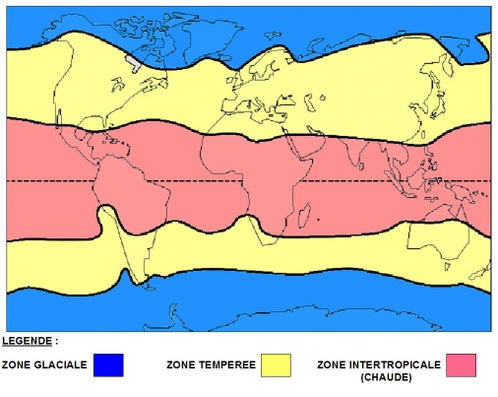
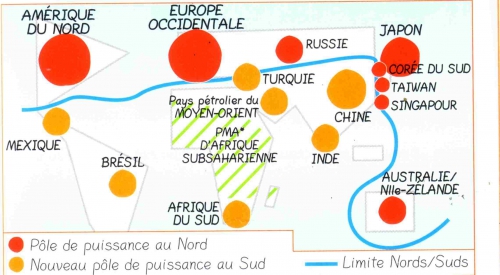
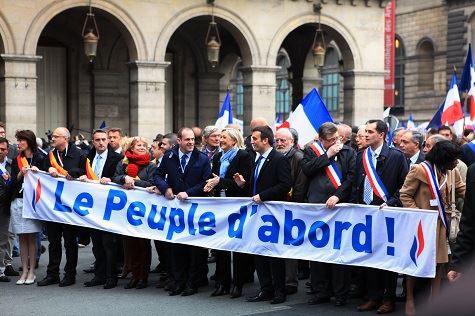
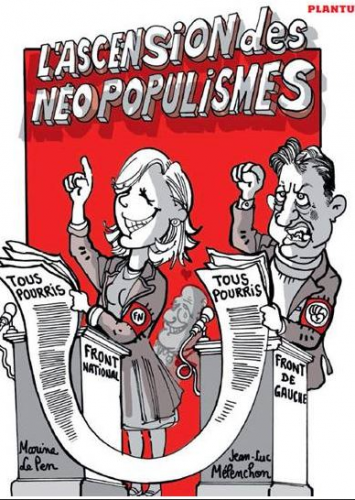 Professor Tarchi, l'avanzata del populismo sembrava inarrestabile.
Professor Tarchi, l'avanzata del populismo sembrava inarrestabile.  Il momento che sta vivendo l'Europa sembra essere socialmente travagliato. Eppure in Olanda e in Francia, alla fine, ha vinto il moderatismo. Perchè?
Il momento che sta vivendo l'Europa sembra essere socialmente travagliato. Eppure in Olanda e in Francia, alla fine, ha vinto il moderatismo. Perchè?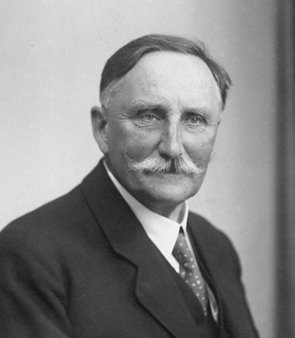
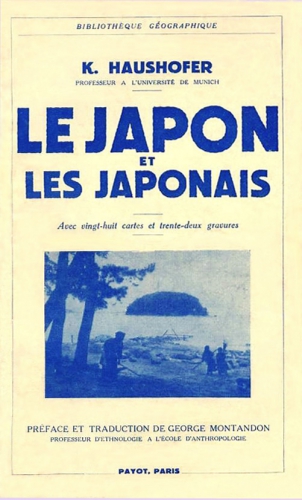
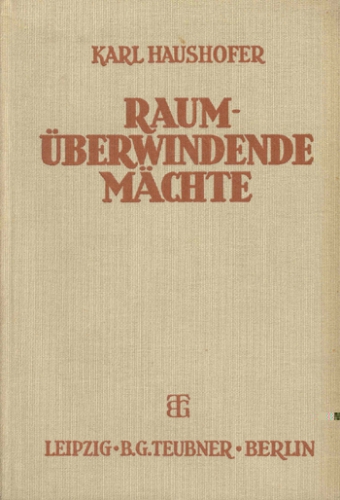
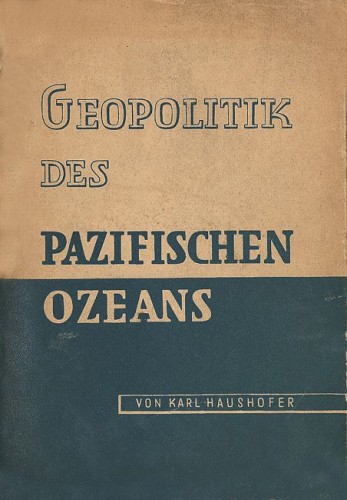
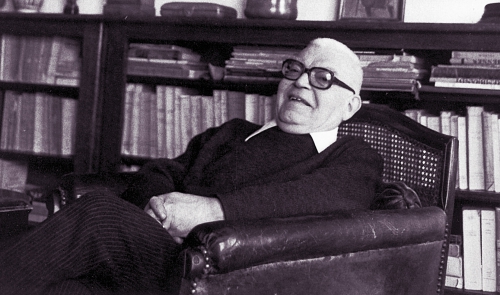
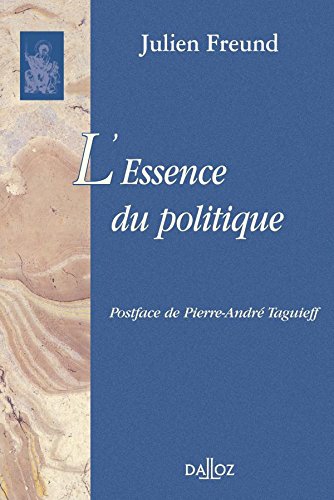
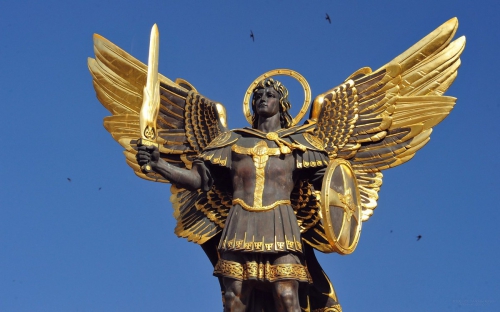

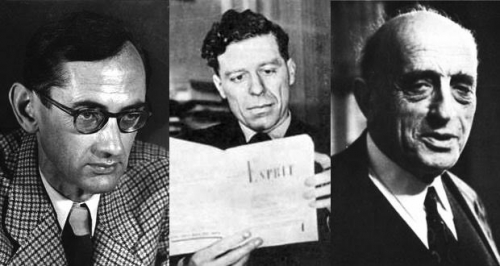

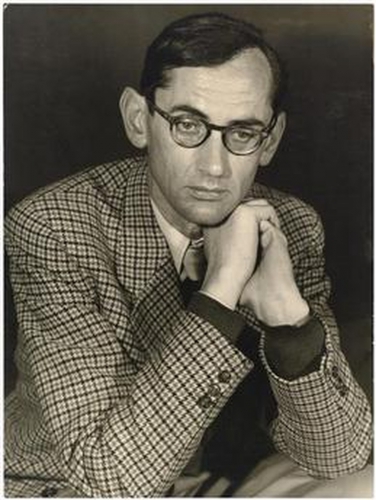 La tentative échouée de ré-instaurer un ordre sain et véritable n’est sans doute pas pour autant le fait de la méthode choisie par les non-conformistes. C’est bien plutôt la vérification de ce que ce sont les révolutions qui font les véritables révolutionnaires, et non pas les prétendus révolutionnaires qui font les révolutions. Pour autant on peut regretter que la force, la cohérence et le talent de cette génération n’aient pas eu davantage de portée, et qu’elle n’ait pas perduré en tant que telle. Toutes ses tendances ont été éclatées par l’histoire, et respectivement digérées, si ce n’est détournées, par d’autres formations politiques et intellectuelles d’envergure. Mais le regard acéré de cette génération sur un monde agonisant, tout comme le patronage de ses pères spirituels et son attitude circonspecte, survivent. Les non-conformistes des années 1930 auront au moins créé, ou du moins renouvelé, une tradition d’intellectuels dés-engagés, impatients et irrécupérables.
La tentative échouée de ré-instaurer un ordre sain et véritable n’est sans doute pas pour autant le fait de la méthode choisie par les non-conformistes. C’est bien plutôt la vérification de ce que ce sont les révolutions qui font les véritables révolutionnaires, et non pas les prétendus révolutionnaires qui font les révolutions. Pour autant on peut regretter que la force, la cohérence et le talent de cette génération n’aient pas eu davantage de portée, et qu’elle n’ait pas perduré en tant que telle. Toutes ses tendances ont été éclatées par l’histoire, et respectivement digérées, si ce n’est détournées, par d’autres formations politiques et intellectuelles d’envergure. Mais le regard acéré de cette génération sur un monde agonisant, tout comme le patronage de ses pères spirituels et son attitude circonspecte, survivent. Les non-conformistes des années 1930 auront au moins créé, ou du moins renouvelé, une tradition d’intellectuels dés-engagés, impatients et irrécupérables.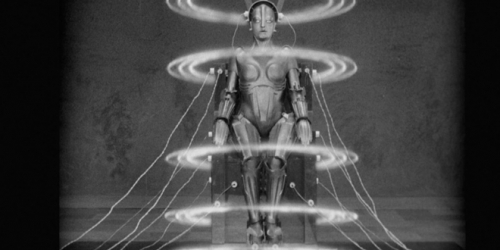
 « Je relis un écrivain marxiste émouvant et oublié, Henri Lefebvre, dénonciateur de la vie quotidienne dans le monde moderne. Lefebvre est un bon marxiste antichrétien mais il sent cette force. D’une part l’URSS crée par manque d’ambition politique le même modèle de citoyen petit-bourgeois passif attendant son match et son embouteillage ; d’autre part la société de consommation crée des temps pseudo-cycliques, comme dira Debord et elle fait aussi semblant de réunir, mais dans le séparé, ce qui était jadis la communauté. Lefebvre rend alors un curieux hommage du vice à la vertu ; et il s’efforce alors à plus d’objectivité sur un ton grinçant.
« Je relis un écrivain marxiste émouvant et oublié, Henri Lefebvre, dénonciateur de la vie quotidienne dans le monde moderne. Lefebvre est un bon marxiste antichrétien mais il sent cette force. D’une part l’URSS crée par manque d’ambition politique le même modèle de citoyen petit-bourgeois passif attendant son match et son embouteillage ; d’autre part la société de consommation crée des temps pseudo-cycliques, comme dira Debord et elle fait aussi semblant de réunir, mais dans le séparé, ce qui était jadis la communauté. Lefebvre rend alors un curieux hommage du vice à la vertu ; et il s’efforce alors à plus d’objectivité sur un ton grinçant.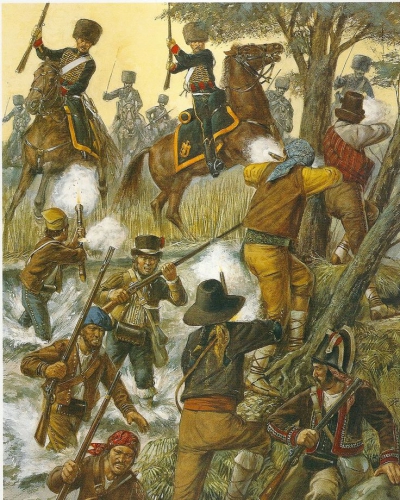



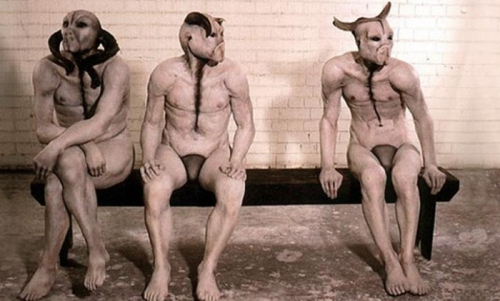


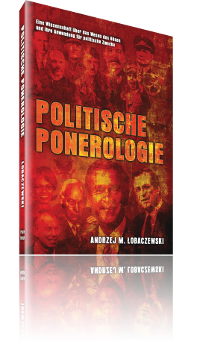

 Sein im
Sein im  Als Hochschullehrer war Schmitt wegen seiner Kritik an der
Als Hochschullehrer war Schmitt wegen seiner Kritik an der  Trotz seiner Kritik an
Trotz seiner Kritik an  Schmitts Einsatz für das neue Regime war bedingungslos. Als Beispiel kann seine Instrumentalisierung der Verfassungsgeschichte zur Legitimation des NS-Regimes dienen.
Schmitts Einsatz für das neue Regime war bedingungslos. Als Beispiel kann seine Instrumentalisierung der Verfassungsgeschichte zur Legitimation des NS-Regimes dienen. Während seiner circa siebenwöchigen
Während seiner circa siebenwöchigen  Schmitt starb im April 1985 fast 97jährig. Seine Krankheit,
Schmitt starb im April 1985 fast 97jährig. Seine Krankheit,  Bei Däubler erschien der Fortschritt als Werk des Antichristen, des großen Zauberers. In seine Rezeption nahm Schmitt antikapitalistische Elemente auf: Der
Bei Däubler erschien der Fortschritt als Werk des Antichristen, des großen Zauberers. In seine Rezeption nahm Schmitt antikapitalistische Elemente auf: Der  Zu jedem Weltreich, also auch dem römischen, gehöre ein gewisser Relativismus gegenüber der "bunten Menge möglicher Anschauungen, rücksichtslose Überlegenheit über lokale Eigenarten und zugleich opportunistische Toleranz in Dingen, die keine zentrale Bedeutung haben". In diesem Sinne sei die Kirche Complexio Oppositorum: "Es scheint keinen Gegensatz zu geben, den sie nicht umfasst". Dabei wird das Christentum nicht als Privatsache und reine
Zu jedem Weltreich, also auch dem römischen, gehöre ein gewisser Relativismus gegenüber der "bunten Menge möglicher Anschauungen, rücksichtslose Überlegenheit über lokale Eigenarten und zugleich opportunistische Toleranz in Dingen, die keine zentrale Bedeutung haben". In diesem Sinne sei die Kirche Complexio Oppositorum: "Es scheint keinen Gegensatz zu geben, den sie nicht umfasst". Dabei wird das Christentum nicht als Privatsache und reine  Schmitt selbst gibt keine Kriterien dafür an die Hand, unter welchen Umständen ein Gegenüber als Feind zu beurteilen ist. Im Sinne seines Denkens ist das folgerichtig, da sich das Existenzielle einer vorgängigen Normierung entzieht. Als (öffentlichen) Feind fasst er denjenigen auf, der per autoritativer Setzung durch den Souverän zum Feind erklärt wird. Diese Aussage ist zwar anthropologisch realistisch, gleichwohl ist sie theoretisch problematisch. In eine ähnliche Richtung argumentiert
Schmitt selbst gibt keine Kriterien dafür an die Hand, unter welchen Umständen ein Gegenüber als Feind zu beurteilen ist. Im Sinne seines Denkens ist das folgerichtig, da sich das Existenzielle einer vorgängigen Normierung entzieht. Als (öffentlichen) Feind fasst er denjenigen auf, der per autoritativer Setzung durch den Souverän zum Feind erklärt wird. Diese Aussage ist zwar anthropologisch realistisch, gleichwohl ist sie theoretisch problematisch. In eine ähnliche Richtung argumentiert  Durch die politische Verfassung, also die Entscheidung über Art und Form der Existenz, entsteht demzufolge eine Ordnung, in der Normen wirksam werden können ("Es gibt keine Norm, die auf ein Chaos anwendbar wäre"). Im eigentlichen Sinne politisch ist eine Existenzform nur dann, wenn sie kollektiv ist, wenn also ein vom individuellen Gut eines jeden Mitglieds verschiedenes kollektives Gut im Vordergrund steht. In der Verfassung, so Schmitt, drücken sich immer bestimmte Werte aus, vor deren Hintergrund
Durch die politische Verfassung, also die Entscheidung über Art und Form der Existenz, entsteht demzufolge eine Ordnung, in der Normen wirksam werden können ("Es gibt keine Norm, die auf ein Chaos anwendbar wäre"). Im eigentlichen Sinne politisch ist eine Existenzform nur dann, wenn sie kollektiv ist, wenn also ein vom individuellen Gut eines jeden Mitglieds verschiedenes kollektives Gut im Vordergrund steht. In der Verfassung, so Schmitt, drücken sich immer bestimmte Werte aus, vor deren Hintergrund  Die Betonung der Notwendigkeit einer relativen Homogenität teilt Schmitt mit seinem Antipoden
Die Betonung der Notwendigkeit einer relativen Homogenität teilt Schmitt mit seinem Antipoden  Analog können nach Schmitt auch
Analog können nach Schmitt auch  Konkret bezog sich Schmitt auf die
Konkret bezog sich Schmitt auf die  Die Verwirklichung der zweiten Variante hält Schmitt für unwahrscheinlich. Die erste Variante lehnt er entschieden ab ("Recht durch Frieden ist sinnvoll und anständig; Friede durch Recht ist
Die Verwirklichung der zweiten Variante hält Schmitt für unwahrscheinlich. Die erste Variante lehnt er entschieden ab ("Recht durch Frieden ist sinnvoll und anständig; Friede durch Recht ist  Neben Anknüpfungspunkten von Schmitt mit Protagonisten der
Neben Anknüpfungspunkten von Schmitt mit Protagonisten der  Ein Beispiel für einen direkten Schnittpunkt zwischen Schmitt und der 68er-Bewegung war eine Tagung des
Ein Beispiel für einen direkten Schnittpunkt zwischen Schmitt und der 68er-Bewegung war eine Tagung des  Für die politische Rechte sind darüber hinaus vor allem
Für die politische Rechte sind darüber hinaus vor allem 
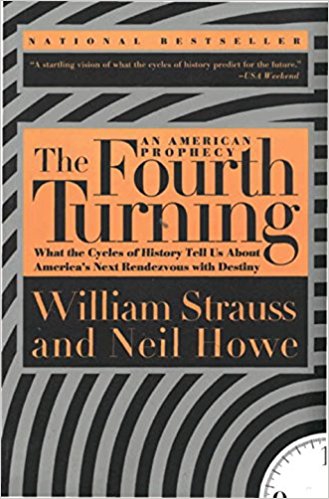 Bannon est extrêmement influencé par les travaux de deux commentateurs de la sorte que nous nommerions “crisologues” tant le concept de crise (crisologie) est au centre de toutes nos réflexions, Neil Howe et William Strauss, auteurs de An American Prophecy, en 1997. Les deux auteurs adoptent une approche de l’actuelle situation, – la grande Crise se faisant déjà sentir dès la fin du communisme avec la mise en cause radicale de la notion de Progrès, – qui se réfère aux théories cycliques de la Tradition. « [Leur] analyse rejette les promesses des historiens occidentaux modernes de développement social et économie linéaire (progrès continuel et déclin) ou chaotique (trop de complexité pour révéler n’importe quelle direction). Au lieu de cela, ils adoptent la vision d’à peu près toutes les sociétés traditionnelles : que le temps social est un temps cyclique dans lequel les événements sont significatifs seulement dans la mesure où ils sont caractérisés par ce que le philosophe Mircea Eliade nommait “reconstitution”. Dans l’espace cyclique, une fois que vous avez écarté les accidents accessoires et sans signification, ainsi que la technologie, il vous reste un nombre limité de conceptions sociales, qui tendent à se répéter selon un ordre bien fixé... »
Bannon est extrêmement influencé par les travaux de deux commentateurs de la sorte que nous nommerions “crisologues” tant le concept de crise (crisologie) est au centre de toutes nos réflexions, Neil Howe et William Strauss, auteurs de An American Prophecy, en 1997. Les deux auteurs adoptent une approche de l’actuelle situation, – la grande Crise se faisant déjà sentir dès la fin du communisme avec la mise en cause radicale de la notion de Progrès, – qui se réfère aux théories cycliques de la Tradition. « [Leur] analyse rejette les promesses des historiens occidentaux modernes de développement social et économie linéaire (progrès continuel et déclin) ou chaotique (trop de complexité pour révéler n’importe quelle direction). Au lieu de cela, ils adoptent la vision d’à peu près toutes les sociétés traditionnelles : que le temps social est un temps cyclique dans lequel les événements sont significatifs seulement dans la mesure où ils sont caractérisés par ce que le philosophe Mircea Eliade nommait “reconstitution”. Dans l’espace cyclique, une fois que vous avez écarté les accidents accessoires et sans signification, ainsi que la technologie, il vous reste un nombre limité de conceptions sociales, qui tendent à se répéter selon un ordre bien fixé... »


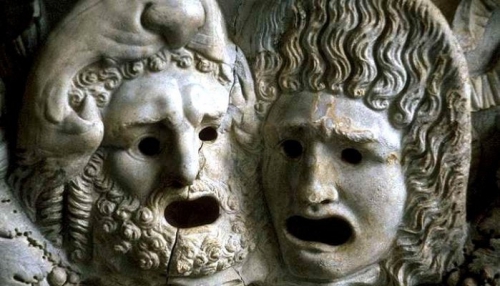
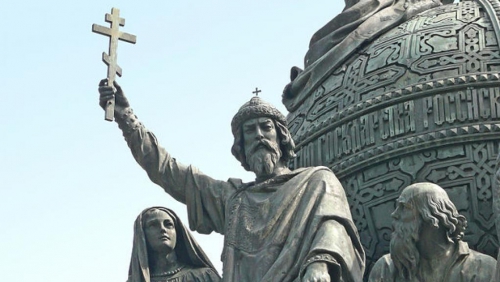
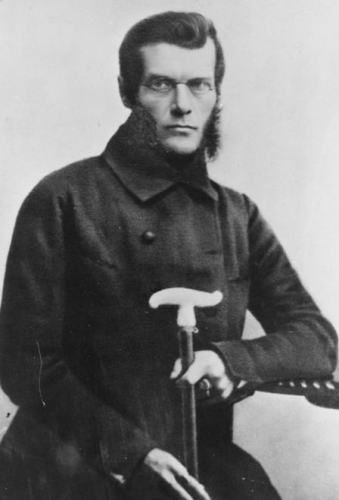
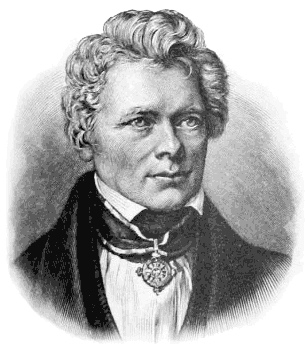 À la plainte de Schelling (ci-contre) contre une foi occidentale trop profondément infusée de rationalisme et faisant état de sa difficulté de créer une religion « pour soi-même » qui en soit épargnée, succède son appel à la Russie comme étant « destinée à quelque chose de grand ». Cette main tendue, les slavophiles la saisissent en se présentant comme ceux qui ont trouvé la solution au problème romantique : la Russie orthodoxe.
À la plainte de Schelling (ci-contre) contre une foi occidentale trop profondément infusée de rationalisme et faisant état de sa difficulté de créer une religion « pour soi-même » qui en soit épargnée, succède son appel à la Russie comme étant « destinée à quelque chose de grand ». Cette main tendue, les slavophiles la saisissent en se présentant comme ceux qui ont trouvé la solution au problème romantique : la Russie orthodoxe.
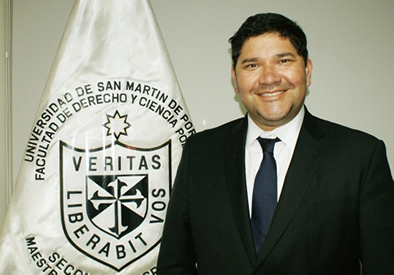
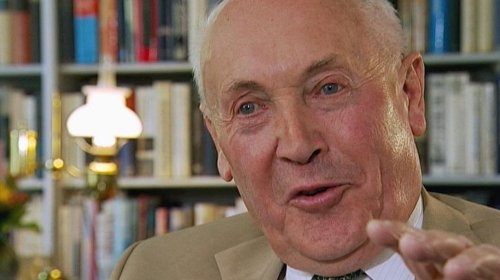



 Au plan individuel, le questionnement identitaire révèle un sentiment de perte de sens au sein des sociétés modernes. Dans son ouvrage Les sources du moi. La formation de l’identité moderne, Charles Taylor, en faisant la généalogie de l’identité moderne, a montré que celle-ci s’est notamment construite sur une conception instrumentale du monde, c’est-à-dire un monde vu comme un simple mécanisme que la raison doit s’attacher à objectiver et à contrôler. Or, cette vision instrumentale du monde, héritée du cartésianisme, et qui a connu son plein épanouissement au XXème siècle, s’est révélée un puissant facteur de désymbolisation [10], synonyme de perte de sens. Ainsi, cette crise, interprétée à travers le prisme de l’identité, apparaît dans une large mesure comme une crise de la modernité, une crise affectant l’homme faustien dont parlait Spengler dans Le Déclin de l’Occident, c’est-à-dire « un individu caractérisé par une insatisfaction devant tout ce qui est fini, terminé », un homme qui « ne croit plus qu’il peut savoir ce qui est bien et mal, ce qui est juste et injuste. » [11]
Au plan individuel, le questionnement identitaire révèle un sentiment de perte de sens au sein des sociétés modernes. Dans son ouvrage Les sources du moi. La formation de l’identité moderne, Charles Taylor, en faisant la généalogie de l’identité moderne, a montré que celle-ci s’est notamment construite sur une conception instrumentale du monde, c’est-à-dire un monde vu comme un simple mécanisme que la raison doit s’attacher à objectiver et à contrôler. Or, cette vision instrumentale du monde, héritée du cartésianisme, et qui a connu son plein épanouissement au XXème siècle, s’est révélée un puissant facteur de désymbolisation [10], synonyme de perte de sens. Ainsi, cette crise, interprétée à travers le prisme de l’identité, apparaît dans une large mesure comme une crise de la modernité, une crise affectant l’homme faustien dont parlait Spengler dans Le Déclin de l’Occident, c’est-à-dire « un individu caractérisé par une insatisfaction devant tout ce qui est fini, terminé », un homme qui « ne croit plus qu’il peut savoir ce qui est bien et mal, ce qui est juste et injuste. » [11] En second lieu, on observe le développement de mouvements identitaires, notamment à caractère ethnique, reposant sur la mise en récit d’un passé interprété comme humiliant et qui justifierait en tant que tel une reconnaissance non seulement symbolique mais aussi juridique. Il s’agit là de l’exploitation (non exempte, bien souvent, d’instrumentalisation) d’une mémoire, d’un imaginaire victimaire visant à réclamer des compensations aux supposés coupables (ou à leurs descendants), et aboutissant à nourrir un sentiment de revanche voire de haine et ainsi à fortifier une identité collective autour d’un ennemi commun. Aux Etats-Unis des mouvements de ce type invoquent la mémoire de l’esclavage pour dénoncer le traitement supposément spécifique dont feraient l’objet, de la part de la police, les membres de la communauté noire (cf. le mouvement Black Lives Matter). C’est aussi la voie suivie par une partie des populations immigrées issues des pays anciennement colonisés à l’encontre des ex-pays colonisateurs comme la France. Ces revendications identitaires trouvent un écho favorable, notamment parmi les élites politiques, économiques, judiciaires et médiatiques qui conçoivent l’affirmation identitaire des minorités comme une réaction légitime face à une culture occidentale européocentriste considérée comme un système de domination aliénant, oppressant par nature pour ces minorités. Ainsi, le traitement médiatique des faits de délinquance tend à occulter délibérément le nom des délinquants quand ils sont d’origine étrangère avec en arrière-fond l’idée que ces délinquants sont et restent par essence des victimes qu’il convient de protéger [19]. Les politiques de quota et de discrimination positive dans l’accès à l’emploi ou à l’université s’inscrivent également dans ce schéma de pensée. Comme le relève Christopher Lasch, on est passé d’une demande d’égalité et d’abolition des discriminations fondées sur la race (mouvement des droits civiques aux Etats-Unis dans les années 1960) à la revendication et à l’instauration d’un traitement de faveur au profit des minorités raciales au motif que ces minorités, éternelles victimes du racisme des Blancs, auraient par nature un droit à réparation [20]. Ce type de mesure qui avalise les revendications identitaires de nature victimaire tend à nourrir les conflits ethniques au sein de la société [21].
En second lieu, on observe le développement de mouvements identitaires, notamment à caractère ethnique, reposant sur la mise en récit d’un passé interprété comme humiliant et qui justifierait en tant que tel une reconnaissance non seulement symbolique mais aussi juridique. Il s’agit là de l’exploitation (non exempte, bien souvent, d’instrumentalisation) d’une mémoire, d’un imaginaire victimaire visant à réclamer des compensations aux supposés coupables (ou à leurs descendants), et aboutissant à nourrir un sentiment de revanche voire de haine et ainsi à fortifier une identité collective autour d’un ennemi commun. Aux Etats-Unis des mouvements de ce type invoquent la mémoire de l’esclavage pour dénoncer le traitement supposément spécifique dont feraient l’objet, de la part de la police, les membres de la communauté noire (cf. le mouvement Black Lives Matter). C’est aussi la voie suivie par une partie des populations immigrées issues des pays anciennement colonisés à l’encontre des ex-pays colonisateurs comme la France. Ces revendications identitaires trouvent un écho favorable, notamment parmi les élites politiques, économiques, judiciaires et médiatiques qui conçoivent l’affirmation identitaire des minorités comme une réaction légitime face à une culture occidentale européocentriste considérée comme un système de domination aliénant, oppressant par nature pour ces minorités. Ainsi, le traitement médiatique des faits de délinquance tend à occulter délibérément le nom des délinquants quand ils sont d’origine étrangère avec en arrière-fond l’idée que ces délinquants sont et restent par essence des victimes qu’il convient de protéger [19]. Les politiques de quota et de discrimination positive dans l’accès à l’emploi ou à l’université s’inscrivent également dans ce schéma de pensée. Comme le relève Christopher Lasch, on est passé d’une demande d’égalité et d’abolition des discriminations fondées sur la race (mouvement des droits civiques aux Etats-Unis dans les années 1960) à la revendication et à l’instauration d’un traitement de faveur au profit des minorités raciales au motif que ces minorités, éternelles victimes du racisme des Blancs, auraient par nature un droit à réparation [20]. Ce type de mesure qui avalise les revendications identitaires de nature victimaire tend à nourrir les conflits ethniques au sein de la société [21]. A cet égard, dans son ouvrage Les vertiges de la guerre – Byron, les philhellènes et le mirage grec, Hervé Mazurel retrace une des étapes importantes de la prise de conscience d’une identité européenne à travers le combat civilisationnel du mouvement philhellène dans les années 1820 en vue de libérer la Grèce, matrice de la civilisation européenne, de l’envahisseur ottoman, jugé coupable des pires atrocités (massacres, viols), immortalisées par la Scène des massacres de Scio de Delacroix et dont témoigne également le recueil de poèmes Les Orientales de Victor Hugo. Or tout cet arrière-fond historique ré-émerge aujourd’hui dans les consciences non seulement au moment des attentats terroristes mais également à l’occasion des évènements dramatiques liés aux mouvements migratoires (viols de Cologne…).
A cet égard, dans son ouvrage Les vertiges de la guerre – Byron, les philhellènes et le mirage grec, Hervé Mazurel retrace une des étapes importantes de la prise de conscience d’une identité européenne à travers le combat civilisationnel du mouvement philhellène dans les années 1820 en vue de libérer la Grèce, matrice de la civilisation européenne, de l’envahisseur ottoman, jugé coupable des pires atrocités (massacres, viols), immortalisées par la Scène des massacres de Scio de Delacroix et dont témoigne également le recueil de poèmes Les Orientales de Victor Hugo. Or tout cet arrière-fond historique ré-émerge aujourd’hui dans les consciences non seulement au moment des attentats terroristes mais également à l’occasion des évènements dramatiques liés aux mouvements migratoires (viols de Cologne…).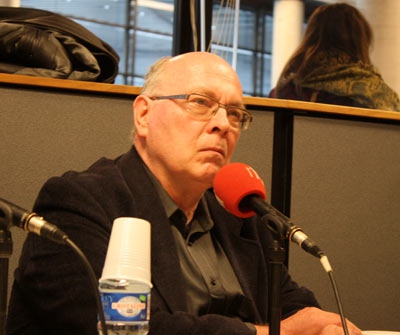 Or, la théorie du « doux commerce » chère aux penseurs libéraux des Lumières apparait, dans une large mesure, comme un mythe. En réalité, les intérêts commerciaux se sont révélés être de puissants facteurs d’exacerbation des conflits. Comme le relève Pascal Gauchon (photo), « pour que règne la paix, il fallait imposer le commerce par la guerre » [32]. De plus, la tendance à l’uniformisation du monde par la mondialisation libérale entraine, aujourd’hui, en retour, des mouvements de fragmentation, sources de nouveaux conflits (montée des fondamentalismes religieux notamment) [33]. Pascal Gauchon observe qu’« alors que les frontières nationales s’abaissent, les frontières intérieures se multiplient : les communautés fermées se multiplient, les immeubles s’abritent derrière des barrières digitales et le code postal définit l’identité (…) » [34]. Apparaissent donc de plus en plus clairement tous les ferments de la guerre civile à mesure que les sociétés s’hétérogénéisent sous l’effet de l’immigration de masse qu’encourage la mondialisation libérale, ce que Pascal Gauchon appelle « les guerres de la mondialisation ». Quant au projet de libération de l’individu, il apparait lui aussi très largement comme une utopie, tant il est vrai que les politiques libérales, notamment au plan économique, se sont traduites par de nouvelles aliénations ainsi que l’ont montré les travaux de Jean Baudrillard sur la société de consommation. Aliénation par la consommation via la publicité qui est infligée à l’individu-consommateur conçu comme « un système pavlovien standard, modélisable par quelques lois comportementales et cognitives simples, manipulable et orientable par les professionnels du marketing » [35]. Aliénation au travail que subit le travailleur moderne « occupant des emplois provisoires, dépersonnalisés, délocalisés en fonction des besoins de l’économie » [36].
Or, la théorie du « doux commerce » chère aux penseurs libéraux des Lumières apparait, dans une large mesure, comme un mythe. En réalité, les intérêts commerciaux se sont révélés être de puissants facteurs d’exacerbation des conflits. Comme le relève Pascal Gauchon (photo), « pour que règne la paix, il fallait imposer le commerce par la guerre » [32]. De plus, la tendance à l’uniformisation du monde par la mondialisation libérale entraine, aujourd’hui, en retour, des mouvements de fragmentation, sources de nouveaux conflits (montée des fondamentalismes religieux notamment) [33]. Pascal Gauchon observe qu’« alors que les frontières nationales s’abaissent, les frontières intérieures se multiplient : les communautés fermées se multiplient, les immeubles s’abritent derrière des barrières digitales et le code postal définit l’identité (…) » [34]. Apparaissent donc de plus en plus clairement tous les ferments de la guerre civile à mesure que les sociétés s’hétérogénéisent sous l’effet de l’immigration de masse qu’encourage la mondialisation libérale, ce que Pascal Gauchon appelle « les guerres de la mondialisation ». Quant au projet de libération de l’individu, il apparait lui aussi très largement comme une utopie, tant il est vrai que les politiques libérales, notamment au plan économique, se sont traduites par de nouvelles aliénations ainsi que l’ont montré les travaux de Jean Baudrillard sur la société de consommation. Aliénation par la consommation via la publicité qui est infligée à l’individu-consommateur conçu comme « un système pavlovien standard, modélisable par quelques lois comportementales et cognitives simples, manipulable et orientable par les professionnels du marketing » [35]. Aliénation au travail que subit le travailleur moderne « occupant des emplois provisoires, dépersonnalisés, délocalisés en fonction des besoins de l’économie » [36].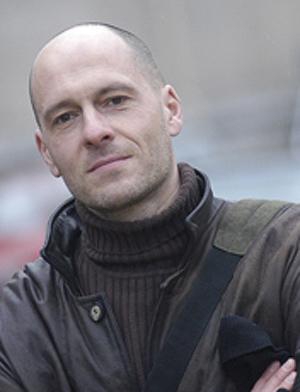 Enfin, sur le plan économique, des travaux ont montré qu’une forte hétérogénéité ethnique au niveau local allait de pair avec une dégradation des services publics essentiels comme l’éducation ou encore les infrastructures routières et nécessitait des transferts sociaux plus importants que dans les zones à forte homogénéité ethnique [42]. Ainsi, les auteurs de cette étude en concluent que les sociétés à forte hétérogénéité se caractérisent par une moindre importance accordée à la qualité des biens publics, un développement du paternalisme et des niveaux de déficit et d’endettement plus élevés. Dans le même sens, Christophe Guilluy dans son ouvrage, la France périphérique, souligne que la politique de la ville s’est avérée être un puissant instrument de redistribution au profit quasi-exclusif des banlieues dites « sensibles », c’est-à-dire des zones à forte concentration immigrée [43].
Enfin, sur le plan économique, des travaux ont montré qu’une forte hétérogénéité ethnique au niveau local allait de pair avec une dégradation des services publics essentiels comme l’éducation ou encore les infrastructures routières et nécessitait des transferts sociaux plus importants que dans les zones à forte homogénéité ethnique [42]. Ainsi, les auteurs de cette étude en concluent que les sociétés à forte hétérogénéité se caractérisent par une moindre importance accordée à la qualité des biens publics, un développement du paternalisme et des niveaux de déficit et d’endettement plus élevés. Dans le même sens, Christophe Guilluy dans son ouvrage, la France périphérique, souligne que la politique de la ville s’est avérée être un puissant instrument de redistribution au profit quasi-exclusif des banlieues dites « sensibles », c’est-à-dire des zones à forte concentration immigrée [43].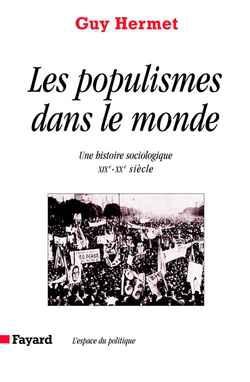 Si la très grande diversité des mouvements populistes rend illusoire tout accord sur une définition unique, on peut néanmoins tenter d’énoncer les principales caractéristiques du populisme. Tout d’abord, il s’agit d’un style de discours, un appel au peuple qui exalte une communauté (peuple demos, c’est-à-dire la communauté des citoyens et/ou peuple ethnos, c’est-à-dire une communauté ethno-culturelle) en tant qu’elle est porteuse de valeurs positives (vertu, bon sens, simplicité, honnêteté,…) et qu’elle s’oppose à une élite au pouvoir, considérée comme délégitimée. Ensuite, le populisme ne s’incarne pas dans un régime politique particulier (une démocratie ou une dictature peuvent avoir une orientation populiste) ni même ne revêt en soi un contenu idéologique déterminé : il se caractérise par la recherche d’une 3ème voie entre le libéralisme et le marché d’une part et le socialisme et l’Etat-Providence de l’autre [48]. En cela, il se veut un dépassement du clivage droite-gauche [49].
Si la très grande diversité des mouvements populistes rend illusoire tout accord sur une définition unique, on peut néanmoins tenter d’énoncer les principales caractéristiques du populisme. Tout d’abord, il s’agit d’un style de discours, un appel au peuple qui exalte une communauté (peuple demos, c’est-à-dire la communauté des citoyens et/ou peuple ethnos, c’est-à-dire une communauté ethno-culturelle) en tant qu’elle est porteuse de valeurs positives (vertu, bon sens, simplicité, honnêteté,…) et qu’elle s’oppose à une élite au pouvoir, considérée comme délégitimée. Ensuite, le populisme ne s’incarne pas dans un régime politique particulier (une démocratie ou une dictature peuvent avoir une orientation populiste) ni même ne revêt en soi un contenu idéologique déterminé : il se caractérise par la recherche d’une 3ème voie entre le libéralisme et le marché d’une part et le socialisme et l’Etat-Providence de l’autre [48]. En cela, il se veut un dépassement du clivage droite-gauche [49].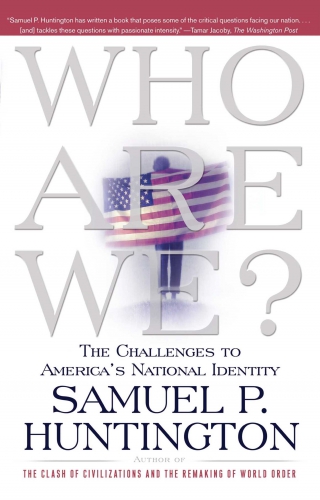 Pour Huntington, depuis la fin du mouvement des droits civiques dans les années 1965 qui a fait des Afro-Américains des citoyens de plein exercice, l’identité nationale américaine ne se définit plus par un critère racial et ne revêt plus que deux dimensions : une dimension culturelle (c’est-à-dire la culture anglo-protestante des XVIIème-XVIIIème siècles, héritée des Pères fondateurs) et une dimension politique (« the Creed ») constituée des grands principes à vocation universaliste que sont la liberté, l’égalité, la démocratie, les droits civiques, la non-discrimination, l’Etat de droit [52] (principes qui sont, en quelque sorte, l’équivalent de ce que l’on désigne habituellement en France par « valeurs républicaines »). Or, Huntington souligne que l’identité américaine est gravement menacée pour deux raisons.
Pour Huntington, depuis la fin du mouvement des droits civiques dans les années 1965 qui a fait des Afro-Américains des citoyens de plein exercice, l’identité nationale américaine ne se définit plus par un critère racial et ne revêt plus que deux dimensions : une dimension culturelle (c’est-à-dire la culture anglo-protestante des XVIIème-XVIIIème siècles, héritée des Pères fondateurs) et une dimension politique (« the Creed ») constituée des grands principes à vocation universaliste que sont la liberté, l’égalité, la démocratie, les droits civiques, la non-discrimination, l’Etat de droit [52] (principes qui sont, en quelque sorte, l’équivalent de ce que l’on désigne habituellement en France par « valeurs républicaines »). Or, Huntington souligne que l’identité américaine est gravement menacée pour deux raisons.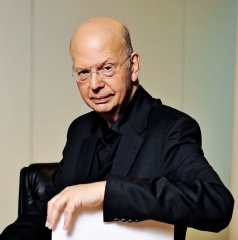 On l’a vu les réveils identitaires peuvent s’analyser comme une tentative de réponse à une crise identitaire caractérisée par la perte de sens au niveau individuel et par la dissolution des identités collectives. Comme le relève Patrick Buisson (photo), cela conduit à se poser « la question qui est au centre de la société française : comment redéployer les solidarités perdues, comment relier de nouveau les individus entre eux ? » [63] Autrement dit, l’enjeu est de retrouver des cadres, des horizons communs qui fassent sens pour l’individu contemporain. A cet égard, il est sans doute illusoire de croire que reviendra le temps où l’identité individuelle était entièrement absorbée par les identités collectives issues des communautés traditionnelles (religieuses, familiales…) et ne s’en distinguaient pas ou peu. L’identité individuelle est devenue plus mouvante, fluide. Avec la modernité, la composante choisie de l’identité a pris le pas sur la dimension héritée.
On l’a vu les réveils identitaires peuvent s’analyser comme une tentative de réponse à une crise identitaire caractérisée par la perte de sens au niveau individuel et par la dissolution des identités collectives. Comme le relève Patrick Buisson (photo), cela conduit à se poser « la question qui est au centre de la société française : comment redéployer les solidarités perdues, comment relier de nouveau les individus entre eux ? » [63] Autrement dit, l’enjeu est de retrouver des cadres, des horizons communs qui fassent sens pour l’individu contemporain. A cet égard, il est sans doute illusoire de croire que reviendra le temps où l’identité individuelle était entièrement absorbée par les identités collectives issues des communautés traditionnelles (religieuses, familiales…) et ne s’en distinguaient pas ou peu. L’identité individuelle est devenue plus mouvante, fluide. Avec la modernité, la composante choisie de l’identité a pris le pas sur la dimension héritée. Dans le domaine économique, un large champ d’actions à vocation identitaire parait ouvert, qui peut s’appuyer sur des fondements théoriques permettant de s’abstraire de la pure logique marchande. A cet égard, le courant de la Nouvelle Sociologie Economique auquel on peut rattacher les travaux de Mark Granovetter (photo) sur les réseaux, vise notamment à remettre en cause la vision sous-socialisée des relations économiques qui est celle de l’individualisme méthodologique et qui fonde les théories néo-classiques. Pour Granovetter, l’économie n’est qu’un sous-ensemble qui s’inscrit au sein d’un ensemble plus vaste et construit à partir d’une logique proprement sociale.
Dans le domaine économique, un large champ d’actions à vocation identitaire parait ouvert, qui peut s’appuyer sur des fondements théoriques permettant de s’abstraire de la pure logique marchande. A cet égard, le courant de la Nouvelle Sociologie Economique auquel on peut rattacher les travaux de Mark Granovetter (photo) sur les réseaux, vise notamment à remettre en cause la vision sous-socialisée des relations économiques qui est celle de l’individualisme méthodologique et qui fonde les théories néo-classiques. Pour Granovetter, l’économie n’est qu’un sous-ensemble qui s’inscrit au sein d’un ensemble plus vaste et construit à partir d’une logique proprement sociale.

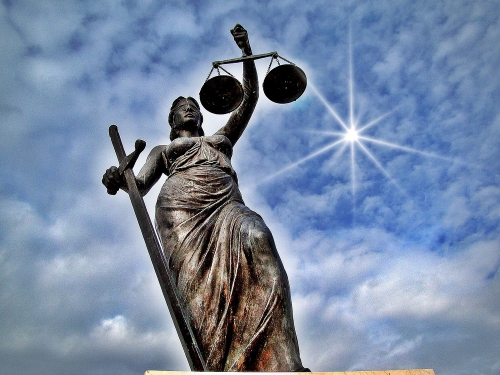
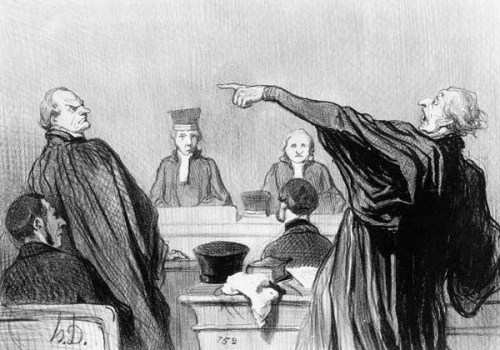
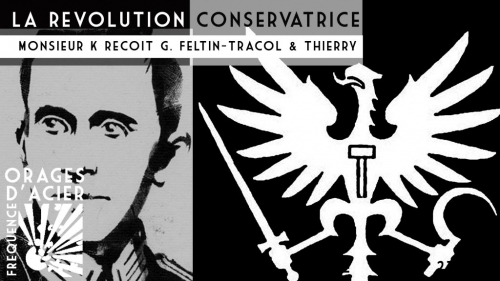
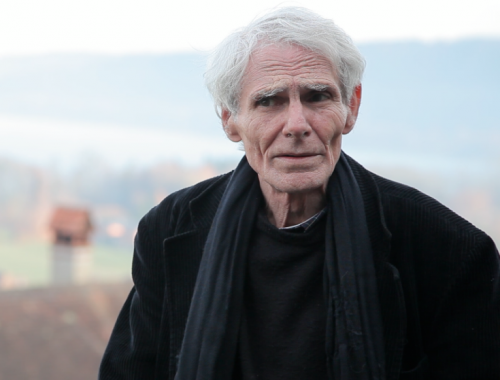
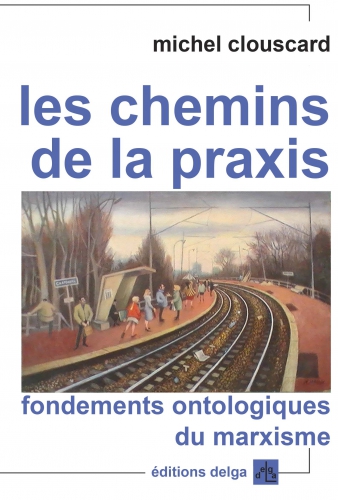 Il liberalismo esigé, oltre che di una deregolamentazione sul piano economico, anche di una deregolamentazione della morale, poiché qualsivoglia regola poteva rappresentare un freno alla potenziale creazione di nuovi mercati, tra cui quelli più fruttuosi (alcool, droghe, sesso, violenza, gioco). Il costo sociale di una tale liberalizzazione della morale è troppo alto secondo Clouscard, che propone in proposito una morale socialista responsabilizzante rappresentata da un terzo organo, dopo i tre teorizzati da Montesquieu, ovvero un Parlamento del lavoratore collettivo, dove si discuta la necessita di un equilibrio tra produzione e consumo.
Il liberalismo esigé, oltre che di una deregolamentazione sul piano economico, anche di una deregolamentazione della morale, poiché qualsivoglia regola poteva rappresentare un freno alla potenziale creazione di nuovi mercati, tra cui quelli più fruttuosi (alcool, droghe, sesso, violenza, gioco). Il costo sociale di una tale liberalizzazione della morale è troppo alto secondo Clouscard, che propone in proposito una morale socialista responsabilizzante rappresentata da un terzo organo, dopo i tre teorizzati da Montesquieu, ovvero un Parlamento del lavoratore collettivo, dove si discuta la necessita di un equilibrio tra produzione e consumo. Quella di Michel Clouscard è quindi una sottile disamina della sovrastruttura del nuovo capitalismo che crea nuovi bisogni e nuovi mercati, che propaganda, già a partire dal militantismo libertino di Diderot e dal positivismo materialista di Voltaire, la formula: “la liberazione del desiderio produrrà la liberazione del proletariato”. E’ quindi l’idea di un’emancipazione trasgressiva a fare il gioco del nuovo modo di produzione dell’industria leggera, e ancora una volta Clouscard mette in evidenza il ruolo dell’intellighenzia che legittima costantemente gli innovativi modi di produzione capitalistici.
Quella di Michel Clouscard è quindi una sottile disamina della sovrastruttura del nuovo capitalismo che crea nuovi bisogni e nuovi mercati, che propaganda, già a partire dal militantismo libertino di Diderot e dal positivismo materialista di Voltaire, la formula: “la liberazione del desiderio produrrà la liberazione del proletariato”. E’ quindi l’idea di un’emancipazione trasgressiva a fare il gioco del nuovo modo di produzione dell’industria leggera, e ancora una volta Clouscard mette in evidenza il ruolo dell’intellighenzia che legittima costantemente gli innovativi modi di produzione capitalistici.
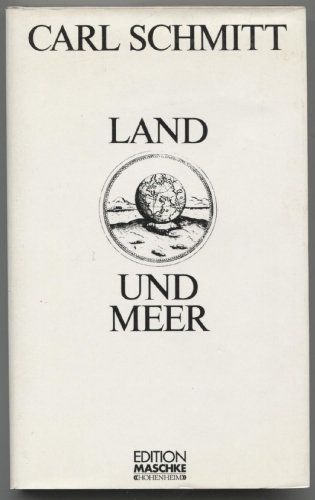 Toute notre existence d’ici-bas, notre bonheur, nos malheurs, nos joies et nos peines, sont pour nous la vie « terrestre », c’est-à-dire, selon les sujets, un paradis ou une vallée de larmes. On comprend donc que dans nombre de mythes et de légendes qui expriment les souvenirs et les épreuves les plus lointains et les plus intimes des peuples, la terre apparaisse comme la mère primitive des hommes. Les livres sacrés nous racontent que l’homme, issu de la terre, retournera à la terre. […] Parmi les quatre éléments (la terre, l’eau, l’air et le feu), c’est la terre qui est vouée à l’homme et qui le marque le plus fortement. L’idée qu’il pourrait être marqué aussi fortement par un autre de ces quatre éléments apparaît, de prime abord, chimérique : l’homme n’est ni un poisson ni un oiseau et encore moins un être-du-feu, à supposer que celui-ci puisse exister. » (p.17-18)
Toute notre existence d’ici-bas, notre bonheur, nos malheurs, nos joies et nos peines, sont pour nous la vie « terrestre », c’est-à-dire, selon les sujets, un paradis ou une vallée de larmes. On comprend donc que dans nombre de mythes et de légendes qui expriment les souvenirs et les épreuves les plus lointains et les plus intimes des peuples, la terre apparaisse comme la mère primitive des hommes. Les livres sacrés nous racontent que l’homme, issu de la terre, retournera à la terre. […] Parmi les quatre éléments (la terre, l’eau, l’air et le feu), c’est la terre qui est vouée à l’homme et qui le marque le plus fortement. L’idée qu’il pourrait être marqué aussi fortement par un autre de ces quatre éléments apparaît, de prime abord, chimérique : l’homme n’est ni un poisson ni un oiseau et encore moins un être-du-feu, à supposer que celui-ci puisse exister. » (p.17-18) « Tous les peuples du centre et de l’Ouest de l’Europe participent à la grande épopée de la découverte des terres nouvelles, qui soumit le monde à la domination européenne. […] De grands astronomes et d’éminents géographes allemands contribuent à l’éclosion d’un nouveau regard sur le monde […] Sous son génial ministre de la marine, Colbert, la France du XVIIème siècle surclassa, pour plusieurs décennies, l’Angleterre dans la construction de navires de guerre. » (p.39)
« Tous les peuples du centre et de l’Ouest de l’Europe participent à la grande épopée de la découverte des terres nouvelles, qui soumit le monde à la domination européenne. […] De grands astronomes et d’éminents géographes allemands contribuent à l’éclosion d’un nouveau regard sur le monde […] Sous son génial ministre de la marine, Colbert, la France du XVIIème siècle surclassa, pour plusieurs décennies, l’Angleterre dans la construction de navires de guerre. » (p.39)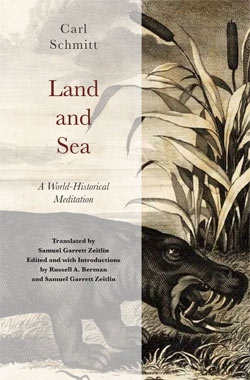 « L’apparition de l’avion marqua la conquête d’une troisième dimension après celle de la terre et de la mer. L’homme s’élevait au-dessus de la surface de la terre et des flots et se dotait en même temps d’un moyen de communication entièrement nouveau –et d’une arme non moins nouvelle. Ce fut un nouveau bouleversement des échelles de référence et des critères, et les possibilités de domination humaine sur la nature et les autres hommes devinrent incalculables. » (p.87)
« L’apparition de l’avion marqua la conquête d’une troisième dimension après celle de la terre et de la mer. L’homme s’élevait au-dessus de la surface de la terre et des flots et se dotait en même temps d’un moyen de communication entièrement nouveau –et d’une arme non moins nouvelle. Ce fut un nouveau bouleversement des échelles de référence et des critères, et les possibilités de domination humaine sur la nature et les autres hommes devinrent incalculables. » (p.87)
